FUEL for growth
Ale Eboli discusses the transformation journey underway at iconic food brand manufacturer Conagra Brands

Food waste
Gaining the benefits of a sustainable approach to waste management
Digital transformation Laying the foundations for the truly connected factory of the future
AgTech Harvesting data and the insights it can reveal to the food industry
Issue 190 - 2022

CEO Andrew Schofield
Group COO Joe Woolsgrove
Creative Director Tom Vince
Data & Insights Director Jaione Soga
Editor Libbie Hammond

Assistant Editor Mary Floate
Content Editors Daniel Baksi, Alex Caesari, Danielle Champ
Editorial Administrator Amy Gilks
Managing Art Editor Fleur Daniels
Art Editors Paul Gillings, David Howard, Charlie Protheroe, Lee Protheroe
Artwork Administrator Rochelle Broderick-White
Sales Director Alasdair Gamble
Project Directors
Philip Monument, Joy Francesconi
Head of Content Management
Adam Blanch
Client Sales Executives
Chloe Allman, Mark Cawston
Project Managers Lewis Bush, Michelle Fontaine, Natalie Griffiths, Jo-Ann Jeffery, Ben Richell, Basil Sharpe, Laura Thompson
Content Managers Johanna Bailey, Victoria Burke, Mark Cowles, Valentina Forero, James Fuller, Jeff Goldenberg, Melanie Joyce, James Page, Wendy Russell, Richard Saunders, Kieran Shukri
Media Sales Executives Mike Berger, Jessica Eglington, Will Gwyther, Reid Lingle, Sam Surrell
General Manager Florida Division Ryan Finn
Social Media Co-ordinator Rosie Clegg
IT Support Iain Kidd
Administration Natalie Fletcher, Rory Gallacher, Ibby Mundhir
© 2022 Finelight Media Group
Corporate Head Office
Cringleford Business Centre, 10 Intwood Road. Cringleford, Norwich NR4 6AU U.K.
T: (312) 854-0123 T: +44 (0) 1603 274130
US Office 2240 West Woolbright Road, Suite 402 Boynton Beach. FI 33426 T: (561) 778-2396

Hello and welcome to the latest digital issue of Food Chain. This month we cover several technology-based topics, but one feature that really caught my eye Philip Simpson’s piece on food waste. The thought that the hospitality sector throws away more than one million tons of food waste every year is just shocking to me. In a sector struggling post-pandemic, reducing costs is paramount – on page 16 you can find out Philip’s approach that can save not just money, but also contribute to saving the planet, too. We look at some other options for reducing food waste too – it’s reassuring that solutions are out there, as long as the industry is open to adopting them.

LH@finelightmediagroup.com
Our cover story this issue gains insights from Alexandre ‘Ale’ Eboli, Executive Vice President and Chief Supply Chain Officer at Conagra Brands. You will recognize some very familiar names in its portfolio – find out how the supply chain team gets these famous products to consumers across the world. Turn to page 42 to learn more.
for the truly connected factory of the future a sustainable approach to waste management insights it can reveal to the food industry transformation journey underway at iconic food brand manufacturer Conagra Brands FUEL for growth Please note: The opinions expressed by contributors and advertisers within this publication do not necessarily coincide with those of the editor and publisher. Every reasonable effort is made to ensure that the information published is accurate, and correct at time of writing, but no legal responsibility for loss occasioned by the use of such information can be accepted by the publisher. All rights reserved. The contents of the magazine are strictly copyright, the property of Finelight Media Group, and may not be copied, stored in a retrieval system, or reproduced without the prior written permission of the publisher.
Follow food chain magazine today at @foodchain_mag food-chain-magazine
Libbie Hammond, Editor
Welcome foodchainmagazine.com 1






Inside this issue Digital transformation Food waste Taste Test News Human resources AgTech 25 16 8 24 20 12 Contents 2




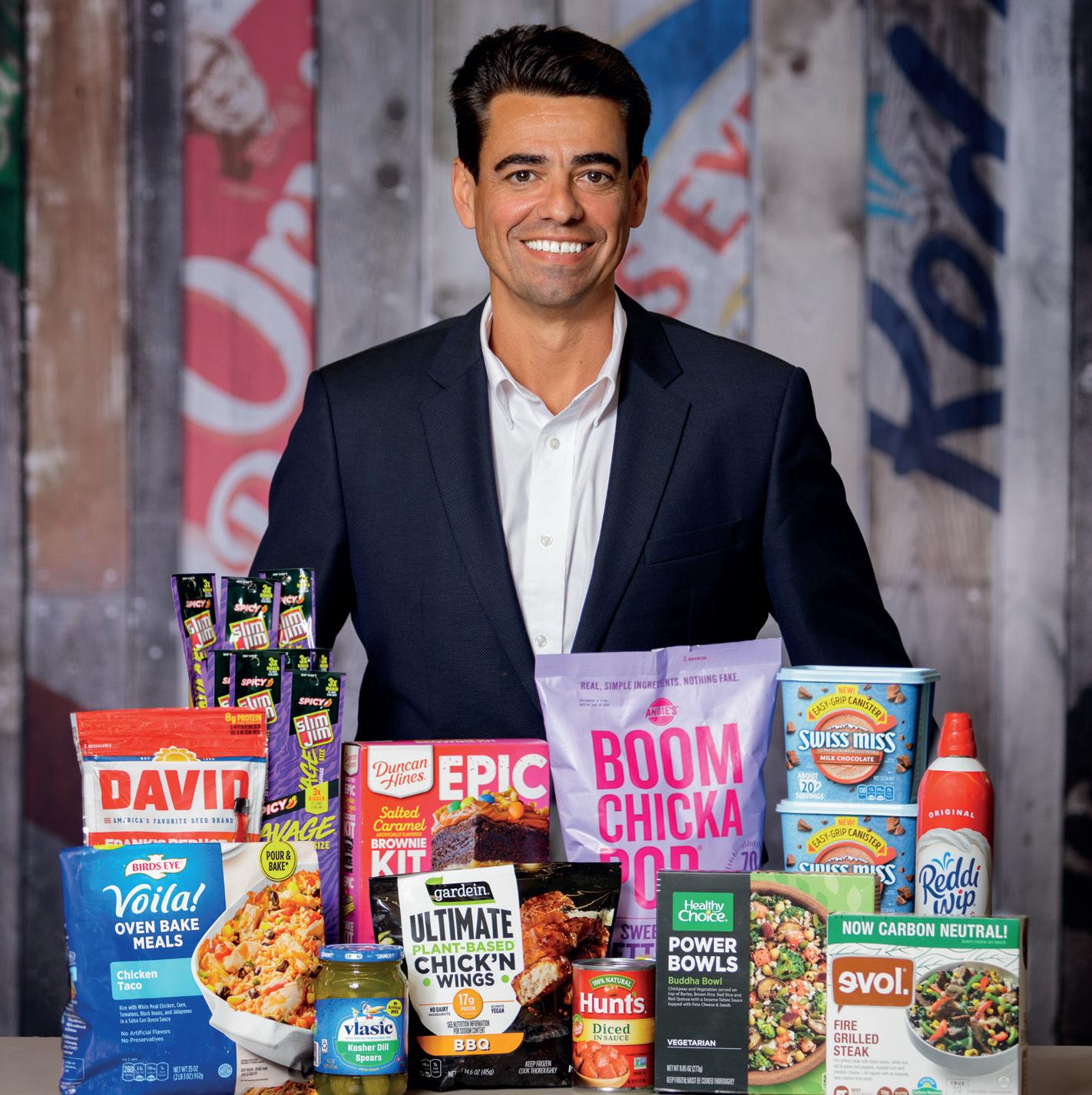
Traceability Packaging Artificial Intelligence 38 26 34 30 Cover Story Conagra Brands 42 Exclusive Feature FFD - Commercial Refrigeration & Catering Equipment food chain magazine foodchainmagazine.com 3

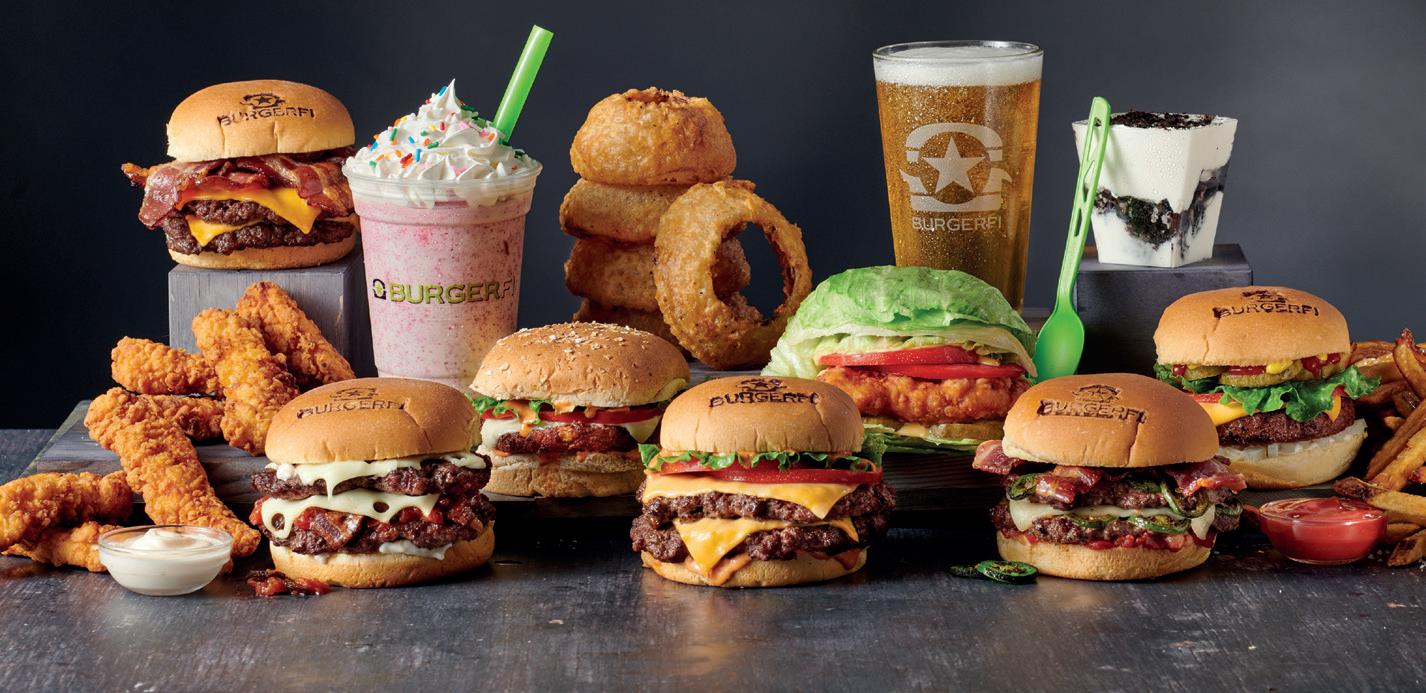

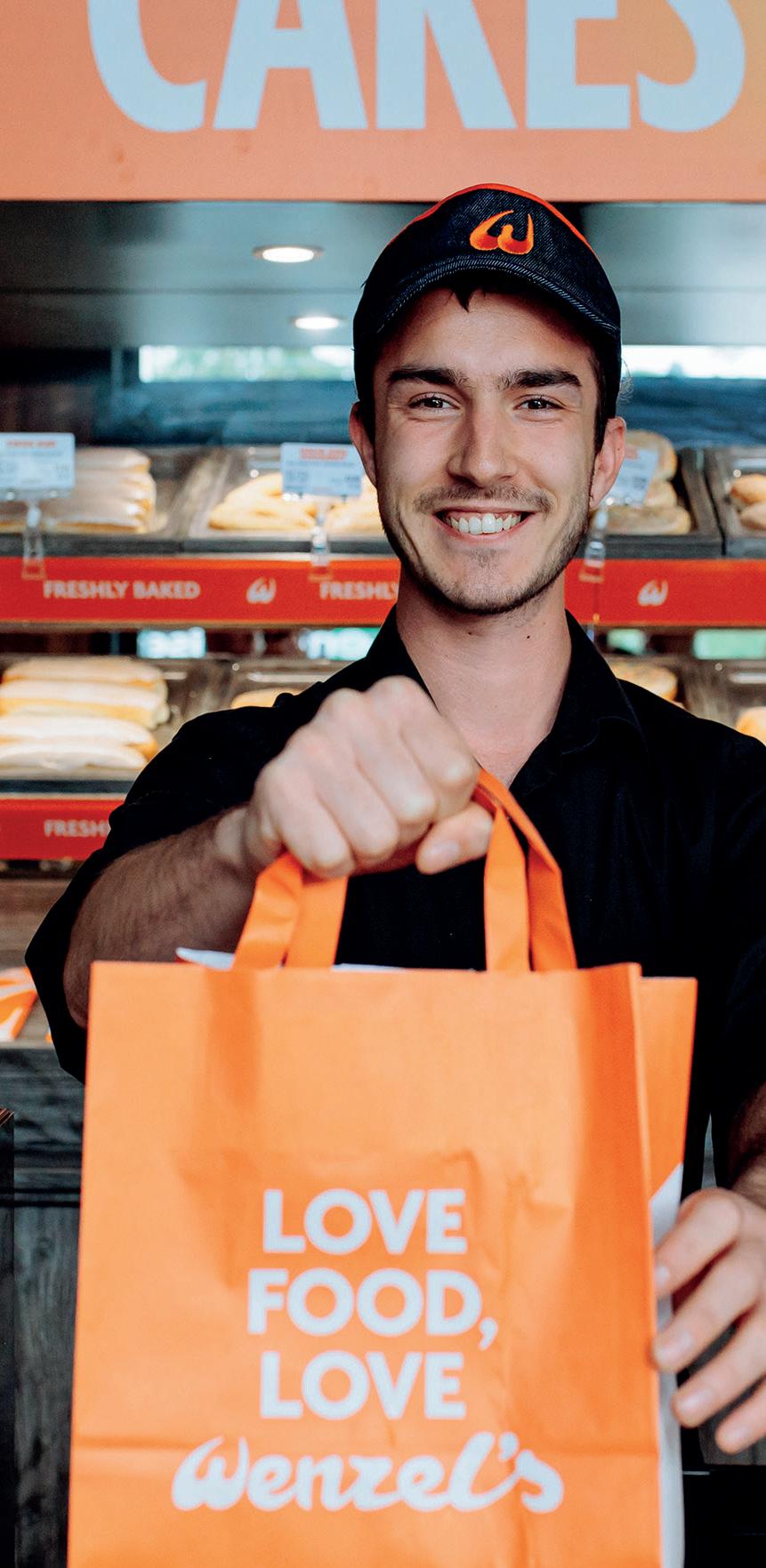

Wenzel’s The Bakers BurgerFi Roadchef Biscuit Belly 78 68 86 62 Exclusive Feature Poly Print 58 Contents 4



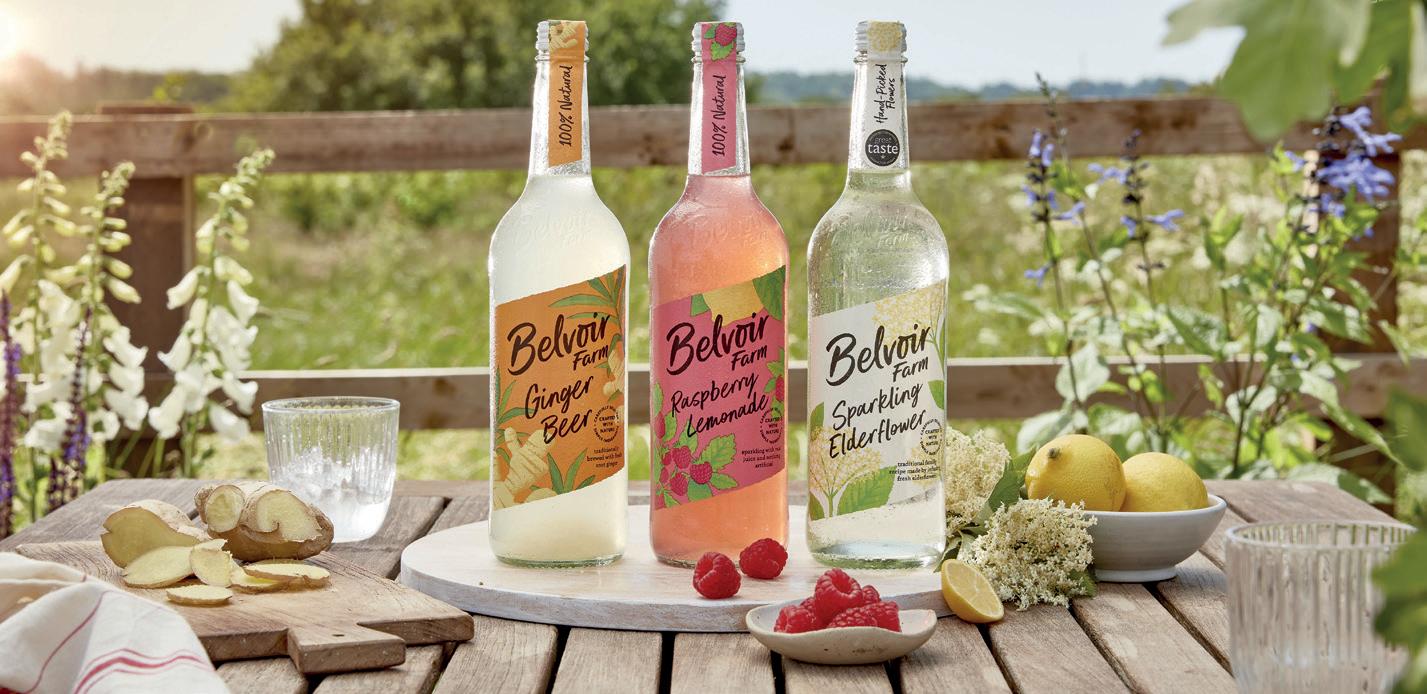

104
Group Belvoir Farm
Slutty Vegan
Altamarea
116 110 92 98 food chain magazine foodchainmagazine.com 5
SusieCakes Franklin Baker
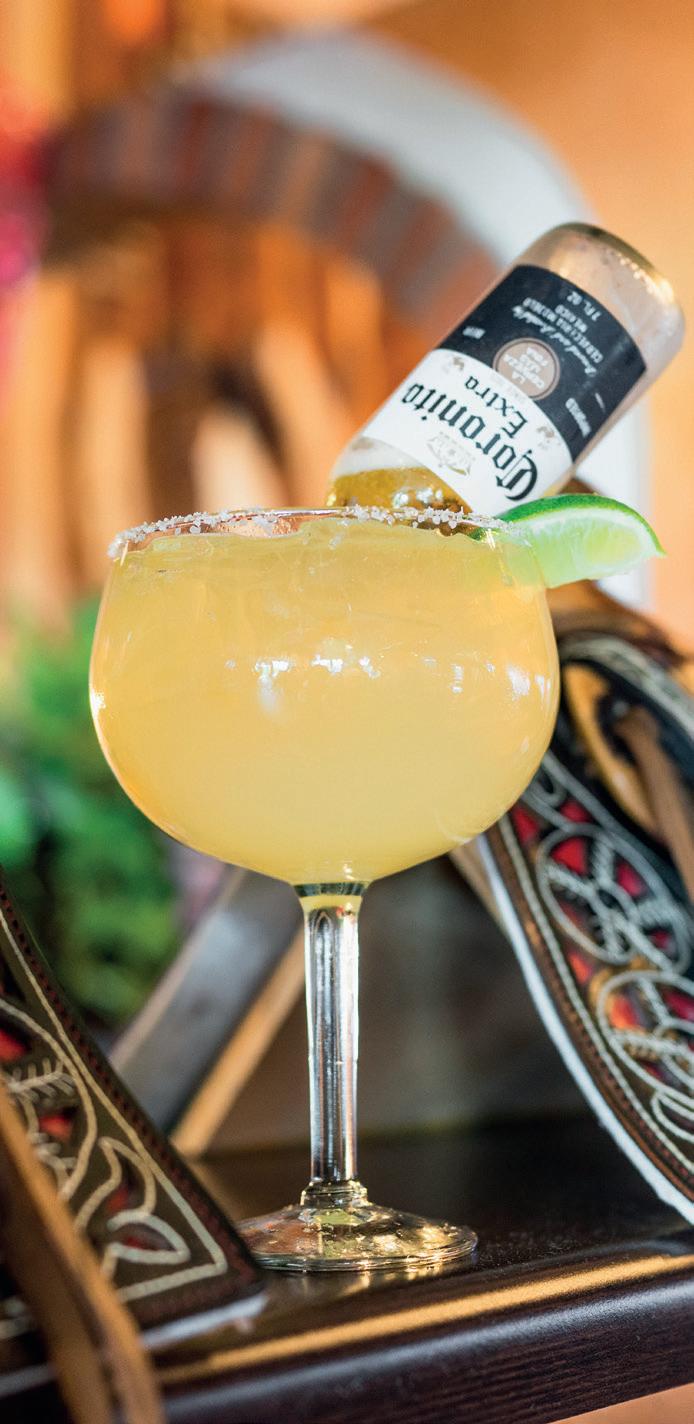

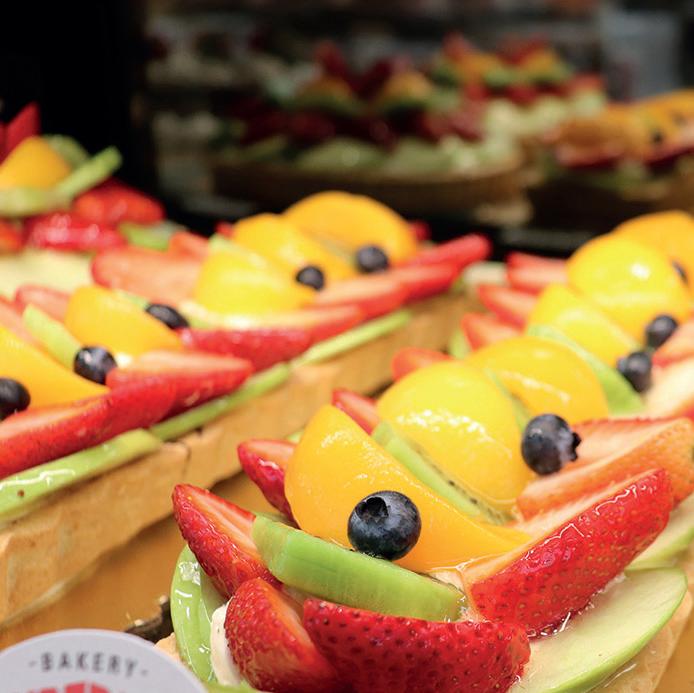
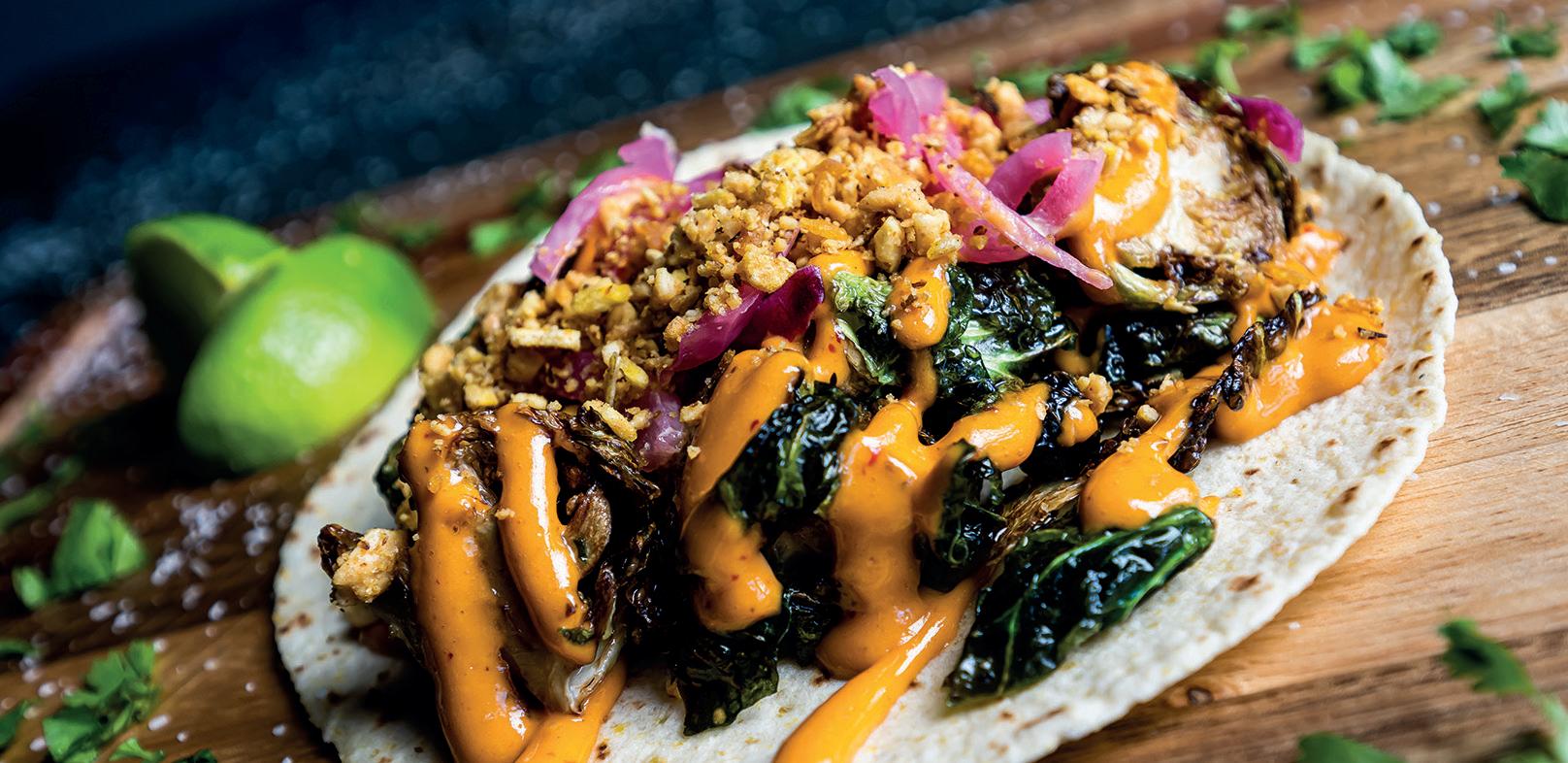



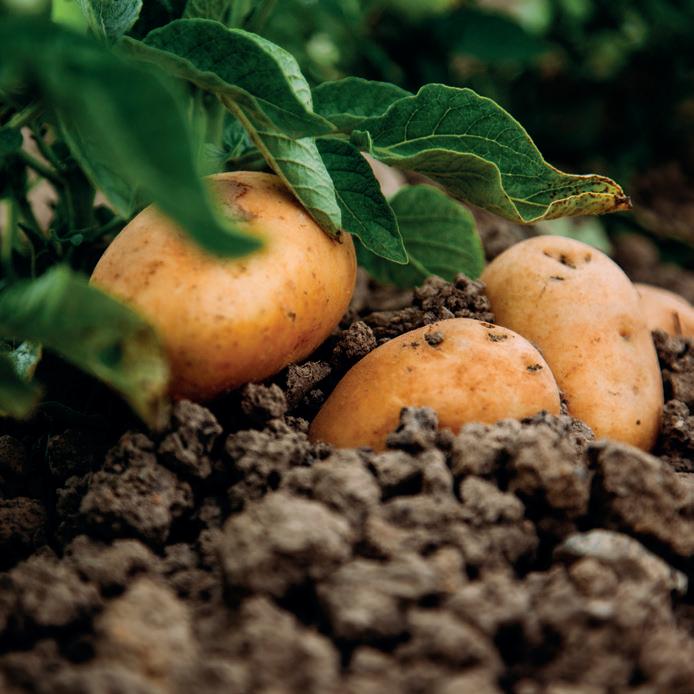




Allied Potato Superior Grocers Patriot Pickle Sticky’s Santikos Entertainment Cinnaholic Paladar Restaurant Group Ramirez Hospitality Group 170 138 166 154 130 160 148 124 Contents 6
Berlin Packaging helps food and beverage brands stand-out on the shelf with tasteful packaging and value-added services designed to boost your bottom line and make your profits soar. Partner with a supplier that believes that Anything is Possible® .

Custom design, quality assurance, strategic sourcing, warehousing, and more.

Your
Take
Packaging to New Heights
BerlinPackaging.com 1.800.2.BERLIN

8
TARGETED STRATEGY
How digital transformation is shaping the food factory of the future.
 By Marcel Koks
By Marcel Koks
The events of the last two years have shone a harsh spotlight on inefficiencies across food manufacturing operations and the wider supply chain. Many businesses have understandably struggled to adapt to ongoing disruption, unable to keep pace with ever-changing market forces and industry challenges.
Forward-thinking manufacturers are looking ahead, exploring digital transformation as a means to future-proof their operations. Buoyed by the success of recent technological investments, many of which were expedited by the pandemic, more food manufacturers are pursuing a strategy of targeted investments in smart manufacturing initiatives. We’re seeing the emergence of the factory of the future, today, underpinned by intelligent technology to help boost resilience while building more agile, flexible and efficient businesses and supply chains, able to react quickly and effectively to challenges and opportunities alike.
Digital transformation foodchainmagazine.com 9
Smart technologies are at the forefront of these investments, with the Industrial Internet of Things (IIoT), autonomous vehicles in the warehouse and robotics for heavy lifting, all gradually becoming more commonplace across food manufacturing operations. The factory of the future is a connected organization, seamlessly connecting equipment, people and supply chains, making full use of sensors, remote diagnostics and Artificial Intelligence (AI) to increase efficiencies across the board.
UK’s sugar beet crop. The business has invested £250 million over the last five years, transforming its four sugar factories into digitally-enabled manufacturing plants – factories of the future.
So complex and energy-intensive is sugar processing that effective maintenance is crucial to optimizing manufacturing capabilities. British Sugar has relied on Infor EAM for many years to support its maintenance operations, recently embracing the benefits of multitenant cloud. The shift helped British Sugar move from a planned maintenance model to predictive maintenance, monitoring where equipment performance is falling short so remedial action can be taken before it breaks, reducing downtime, maximizing quality and minimizing risk.
A connected enterprise
Maintenance 4.0
Take maintenance. The concept of Maintenance 4.0 involves the capture of sensor readings in a data lake repository, applying algorithms and analytics to understand precisely why assets fail, identifying how to correct the problem before it negatively impacts operations. A move from reactive maintenance, the standard approach albeit costly in the longterm, to a preventative, conditionbased strategy is a crucial shift in the quest to increase efficiencies and steal a march on the competition.
The sweet spot
Leading the charge when it comes to the factory of the future is British Sugar, the sole processor of the
To realize the full potential of a predictive maintenance model, optimizing benefits and delivering against Industry 4.0 and IIoT principles, connectivity across British Sugar’s core systems is crucial. Because British Sugar’s sites are all in rural areas, network reliability was a real barrier to achieving a truly connected enterprise. To ensure secure, high performance, robust connectivity, the company is installing private mobile networks.
These networks are vital as British Sugar deploys Infor Mobile, which allows Infor EAM to be used by those on the shop floor. Providing access to comprehensive maintenance-focused insights at the source, or machine, Infor EAM enables British Sugar plant employees to observe, record, input and retrieve insights in the moment,
Digital transformation is not about investing in technology for technology’s sake, rather taking an incremental approach
10
“ “ “ “
rather than taking manual notes to be input via a desktop device at a convenient time. The business also uses mobile applications to contact remote specialist support at the site of respective equipment, helping to demonstrate the specifics of the issue and expediting fault resolution.
British Sugar is keen to build on its progress to date, exploring the use of AI to analyze sensor information and raise work orders automatically; supporting resource planning to refine skills utilization and uphold stringent safety parameters, and integrating with British Sugar’s ERP system to automatically order spare parts, streamline inventory and assume greater control of stock.
Safety as standard
A focus on predictive and preventative maintenance can help to raise safety standards too, maximizing automation and minimizing risk. A move away from manual processes, where human error is inevitable, makes for minimal unplanned downtime, fewer compliance issues and recalls, and less waste. AI and machine learning (ML) both have valuable roles to play in facilitating increased automation, also delivering new depths of interconnected insight across the factory and extending throughout the supply chain.
Take the issue of dynamic best before and use by dates. AI and ML capabilities help manufacturers take into account the different variables at all stages of the farm-to-fork supply chain to formulate a dynamic shelf life for each product.
This involves the condition monitoring of ingredients and finished products, both upstream and downstream, looking at storage and transportation times and conditions pre-, during and post-production, as well as raw ingredient quality profiling and examining what will happen to the product once it reaches the retailer. IIoT devices are
perfect for this approach, measuring the vital variables and feeding this crucial information back into intelligent systems for analysis to determine optimum use by or best before dates, which are aligned to the specific quality attributes of an individual batch of products.
Information is key Endeavors such as these help to reduce the staggering amount of food that’s wasted on a daily basis and result in real benefits for the manufacturer too. The granularity and visibility of information available can deliver the depths of foresight needed to better inform planning and sourcing decisions, enabling manufacturers to dynamically change the recipe, or investigate alternative sources of ingredients.
Digital transformation is not about investing in technology for technology’s sake, rather taking an incremental approach, determining where the major gains are to be made and starting there. Through a deliberate strategy of targeted technological investments, food manufacturers can lay the foundations for a truly connected factory of the future. The right combination of technologies will optimize operations, building agile, efficient businesses and supply chains able to meet any challenges head-on while staying ahead of the competition. ■
Marcel Koks is Industry & Solution Strategy Director, Food & Beverage at Infor, a global leader in business cloud software specialized by industry. Infor develops complete solutions for its focus industries. Infor’s mission-critical enterprise applications and services are designed to deliver sustainable operational advantages with security and faster time to value. Over 60,000 organizations in more than 175 countries rely on Infor’s 17,000 employees to help achieve their business goals.
Marcel Koks www.infor.com
transformation foodchainmagazine.com 11
Digital

12
CROP TOP
Baruchi highlights
food industry
The food industry has grown substantially over the past few decades. Where individuals used to visit their local grocer for fresh fruits and vegetables, they now have the choice of several supermarkets in every town, not to mention online shopping and even same day delivery. The food market has boomed and, as a result, consumers now expect more variety and higher quality products – all at lower prices. To keep up with these demands, the food industry has turned to the use of AI and Big Data to analyze and optimize each stage of their production process, including at the very start of the supply chain where raw ingredients are grown in the field.

Ron
the huge insights that crop data can reveal to the
AgTech foodchainmagazine.com 13
The food supply value chain is vast, stretching from the sewn seed through to stores and supermarkets. Big Data is often utilized from the very first stage of food production, considered the growing stage, to aid in fertilization, irrigation, and crop disease management processes. However, the uses and benefits of this data extend far beyond just these elements – and far beyond the farmers’ field.
Looking further down the production line to the food manufacturing process, crop quality becomes critical. Generally, food manufacturers pay the same price per truck load of product, regardless of the quality of the load. Most often, any quality issues are only uncovered during the manufacturing process. For example, in pomegranates, nutritional input during the growing stage of the
fruit determines the acidity levels of the crop, which in turn determines whether the pomegranate is made into juice or sold as a fresh fruit. To a juice producer, wanting to keep his product standard and consistent to consumers, receiving highly variable fruits makes this difficult to achieve.
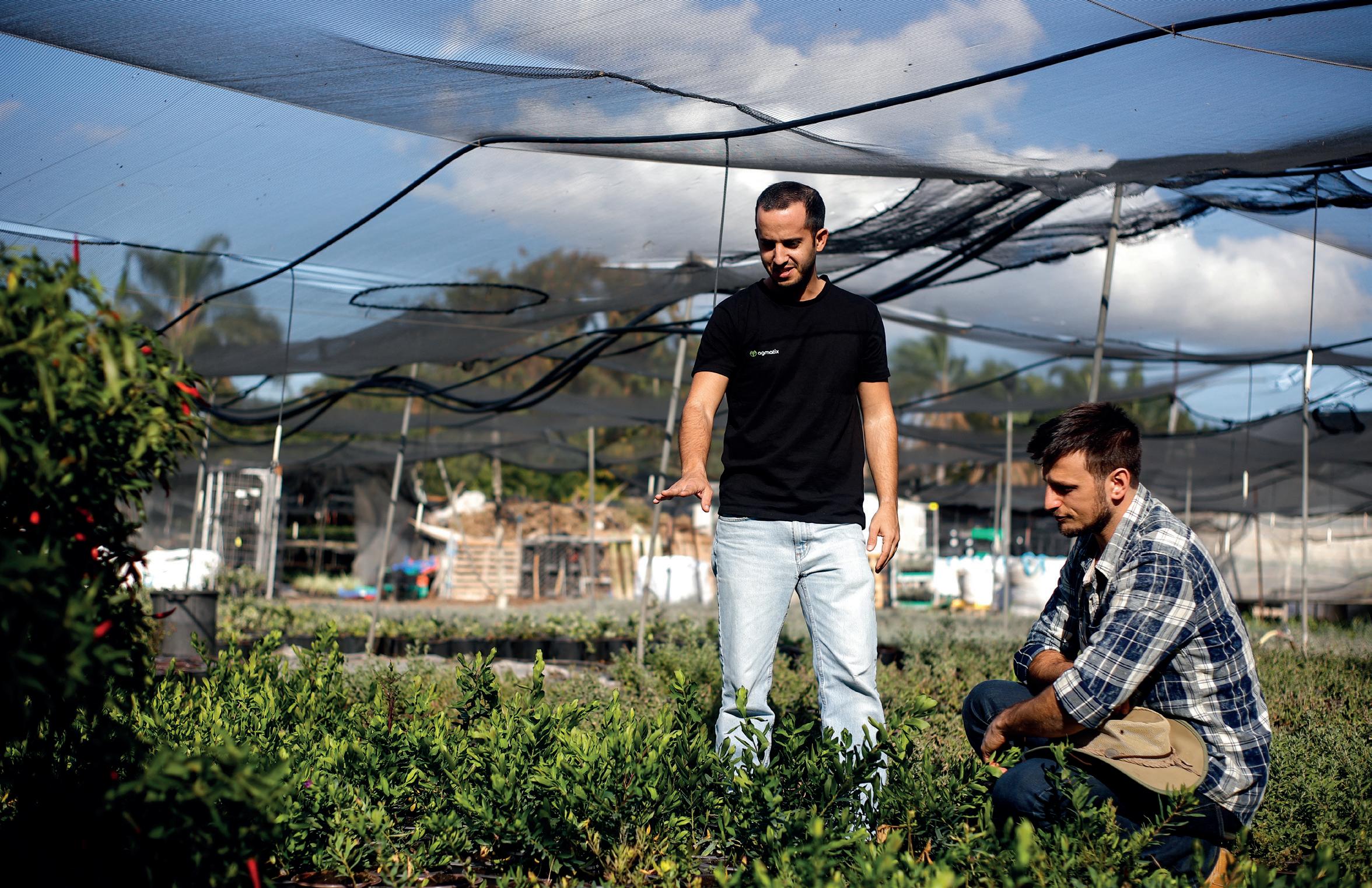
Minimizing waste
Similar results are seen in almonds, where oil quality from properly fertilized trees has been found to result in almonds with better health contributions and a longer shelf life, giving producers the ability to boast a healthier product that lasts longer.
If a received truckload of produce doesn’t meet food manufacturers’ criteria, it may have to be discarded. This results in large amounts of waste and an unknown output per
14
truck load of produce, ultimately affecting the bottom line for food manufacturers and filtering additional costs down the supply chain.
To keep output reliably high and keep costs low, it is critical for food manufacturers to improve the quality of their input ingredients and minimize this waste. The good news is that there’s a solution to the unpredictable quality of these input ingredients, and it all starts with crop health and nutrition.
Improving growing practices
By leveraging Big Data and AI, crop nutrient requirements can now be calculated accurately and effectively, and can even be tailored to each individual crop type and growing conditions. Data such as rainfall, temperature, and soil type are added to fertilization and yield data for each specific crop variant to create a holistic view of the individual crops’ nutritional and management needs. This data is then analyzed using advanced AI and can be leveraged by food manufacturers to ensure growing practices are as efficient, cost-effective, productive, and sustainable as possible. By providing their growers with bespoke, live crop nutrition plans to achieve optimal yield, food manufacturers can guarantee they receive top quality ingredients and a maximal, predictable truck load from their suppliers. This, in turn, also unlocks key environmental benefits by reducing waste and minimizing disruptions to their production processes.
Naturally, AgTech innovations such as these offer the potential to improve the production of numerous different food products across the wider industry, beyond just pomegranates and almonds. These technologies are key in making crop nutrition plans more advanced and more accessible than ever, providing key decision support systems for both growers and food manufacturers and facilitating long-
term, quantifiable benefits across the board. For manufacturers, deploying these digital solutions at field level essentially means that they are empowered to play a more vertically integrated role in the food supply value chain, and in turn, to increase their profitability.
Taking a wider view, the digital nature of these solutions also critically provides opportunities for further collaboration, making it possible to conduct agronomical research on a worldwide scale. By enabling researchers to combine their data with a wealth of global knowledge around specific crop varieties, disease management, nutritional needs and more, issues exactly like this can be addressed for stakeholders industry wide.
Ultimately, technological developments like these are key in driving quality standards upwards, allowing food manufacturers to keep up with consumer demands for quality foods at a competitive price. With the use of AI rapidly developing and digital solutions becoming more advanced and commonplace across the food supply value chain, the positive impact for the wider food industry is clear. In a nutshell, the benefits of harvesting data aren’t just for those harvesting crops. ■
Ron Baruchi is CEO of Agmatix, an agro informatics company that develops datadriven solutions for ag professionals worldwide. Its cuttingedge technology platform uses agronomy data science and advanced AI technology to convert agronomic data into actionable insights at field level. The SaaS platform aggregates, standardizes, and harmonizes agronomic data from trials and experiments, unlocking a significant new layer of knowledge.
 Ron Baruchi www.agmatix.com
Ron Baruchi www.agmatix.com
AgTech foodchainmagazine.com 15
BENEFITS A CIRCLE OF
Philip Simpson discusses the challenges facing the hospitality sector and explains why embracing a sustainable approach to waste management can deliver both financial and environmental benefits.

In July, celebrity chef Mark Hix voiced his concerns over pressing issues facing the hospitality sector. Following a particularly challenging 24 months, which saw the industry hit time and time again by the continuing
impacts of the Covid-19 pandemic, we’re now experiencing escalating staff shortages, logistics pressures and the rising cost of both food and energy – a recipe for disaster.
Indeed, Hix has already announced the permanent closure of one of his country pubs, the Fox Inn in Corscombe, a venue that sadly joins thousands of others – both big and small – forced to cease trading due to untenable market conditions. While all the jobs at the pub have been saved,
16
Recycling food waste and how it helps profit and planet
with staff joining the team at Hix’s Oyster & Fish House in Dorset, countless others haven’t been as fortunate.
It’s heart-breaking to see such a thriving industry brought almost to its knees, especially by a scenario that no-one could have foreseen, but the sector continues to show unbreakable resilience and unwavering focus on the light at the end of the tunnel that better times will soon return. In the meantime, it’s a case of tightly managing overheads, planning for change, expecting the unexpected and avoiding unnecessary costs wherever possible.
The growing cost of wasted food
While historically overlooked as ‘part and parcel’ of the job, one of the highest costs faced by hospitality business is food waste. Indeed, stats from WRAP highlight that the hospitality sector throws away more than one million tons of food waste every year – 40 percent of which is said to be avoidable. From offcuts and peelings, to garnishes, plate scrapings and spoiled produce, it comes at a total cost of £3 billion.
But it’s not just the financial cost of food waste that makes for concerning reading. The environmental impact is just as concerning.
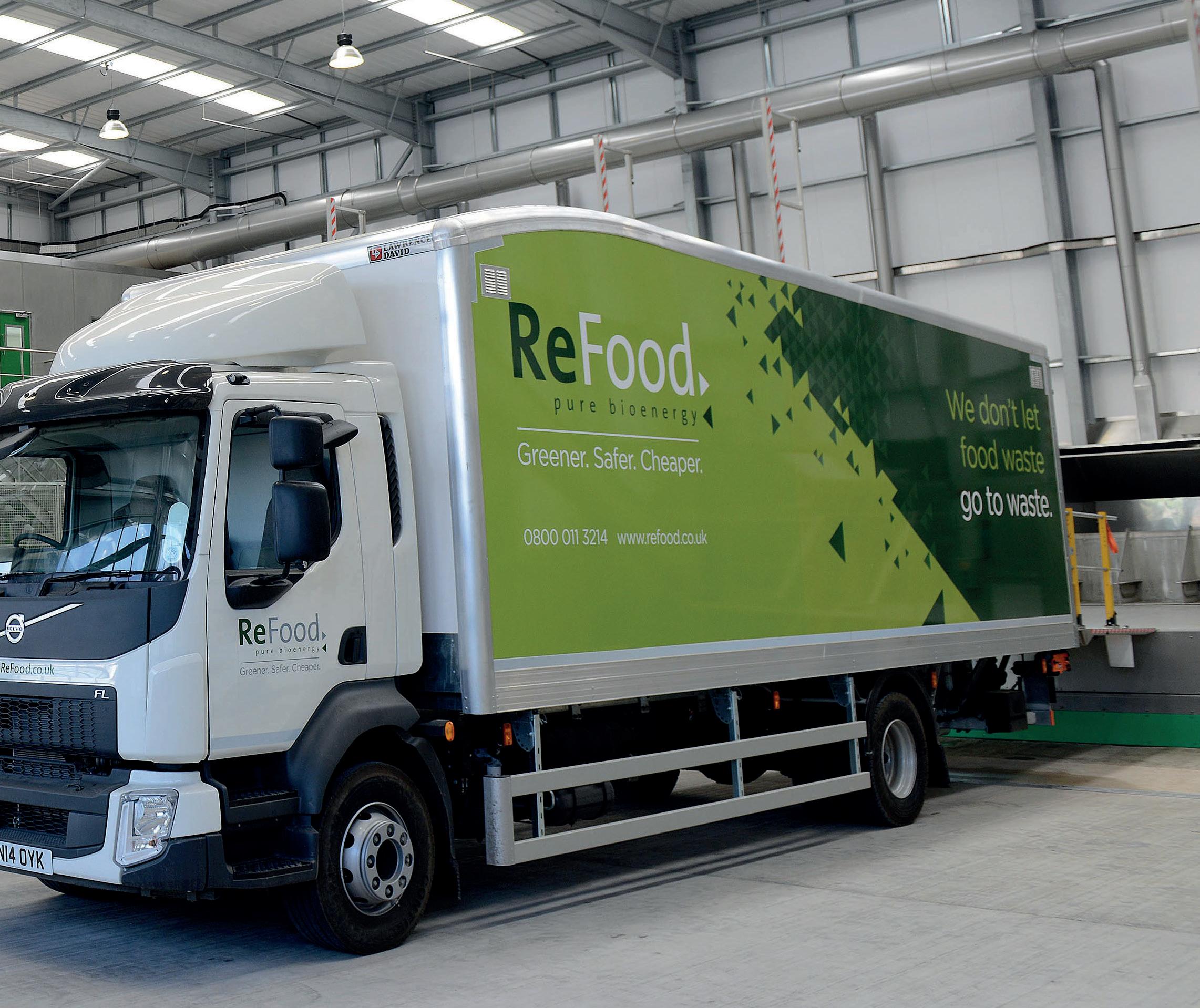
Food waste foodchainmagazine.com 17
Food waste left to rot in landfill creates greenhouse gases considered 21 times more damaging to the environment than CO2 – yet another challenge for a sector bound by sustainability and decarbonization targets.
Minimizing waste, maximizing profit
While the issue is seemingly escalating, food waste is nothing new to the hospitality sector and there are numerous ways to tackle the issue head-on. From improving stock control and using leftovers, to simplifying menu choices, forgoing garnishes and streamlining portion sizes, a few simple changes can have a significant commercial impact without damaging the dining experience.
Yet while managing avoidable waste is one thing, it’s important to remember the unavoidable fraction
generated in commercial kitchens – bones, gristle, shells and spoiled produce. While many see this as a necessary evil of food preparation, it’s important to remember the environmental consequences of relying on landfill.
Fortunately there’s a simple solution here too – food waste recycling. Delivered on an industrial scale, food waste recycling harnesses the Anaerobic Digestion (AD) process to capture the biogas released during the natural degradation of food. This gas can either be combusted to generate renewable electricity or upgraded and injected directly into the gas grid.
Nothing goes to waste during the process. Even the resulting digestate can be used as a sustainable liquid biofertilizer by farmers. All in all, a highly sustainable option for hospitality businesses to consider!

18
The environmental benefits are clear, but what about the financial impact? Surely ‘going green’ is expensive and time consuming? Well, with no costly landfill tax to pay, hospitality businesses can expect to save c.50 percent on waste management costs by implementing food waste recycling services. What’s more, the whole process is quick and simple to integrate – it’s a win-win situation!
Why ReFood?
As the UK’s leading food waste recycler, ReFood operates three state-of-the-art AD sites in the UK. Collecting and processing more than 400,000 tonnes of food waste every year, we help hospitality businesses nationwide to cut costs, go green and minimize their reliance on landfill.
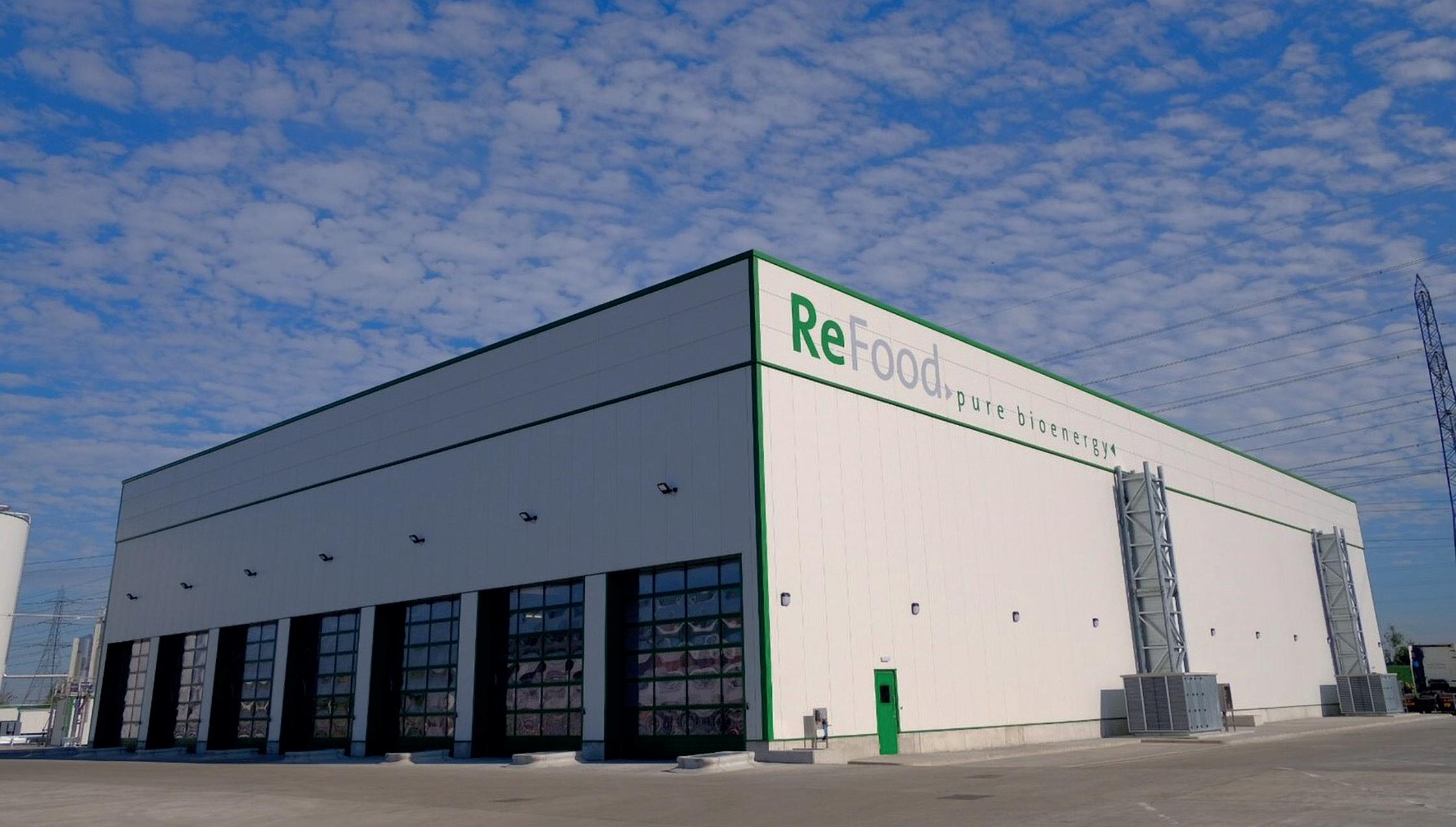
While electricity and gas generated at our facilities helps to further reduce national reliance on fossil fuels, we also produce a sustainable biofertilizer – ReGrow – which is used by local farmers as an alternative to chemical fertilizers. With recycled food used
to grow tomorrow’s crops, we essentially close the food supply chain – a simple and circular solution!
So, with overheads pinching and improving sustainability credentials an essential consideration for every business, I’d implore any hospitality business that isn’t already doing so to consider recycling their food waste – the benefits are countless. It’s greener, safer and, most importantly, cheaper! ■
Philip Simpson
www.refood.co.uk
Philip Simpson is commercial director at ReFood, the UK’s leading food waste recycler. With three state-of-the-art anaerobic digestion (AD) facilities in Widnes, Dagenham and Doncaster, the company collects more than 400,000 tonnes of food waste every year, turning it into renewable energy and sustainable biofertiliser.

Food waste foodchainmagazine.com 19

20
True value
Agility and flexibility have been pivotal in ensuring the survival of organizations over the past few years. Industries have been burdened with the volatility of the pandemic and a shift in the type of service customers expect; only firms who have adapted practices to suit these changes have been successful.

However, the evolution of how these businesses run would not have been possible without the workers’ compliance, many of whom have gone above and beyond to keep their industry afloat. This has come at the cost of severe disruption to employees’ daily lives, as they have filled gaps where needed, often at short notice or with little time to prepare.
A recent study from The Workforce Institute at UKG on employee concerns around the workplace after Covid, revealed that more than half of UK
Can HR technology improve employee retention and eliminate burnout? Neil Pickering reports
Human resources foodchainmagazine.com 21
workers have seen hours increase since the pandemic commenced, heightening the risk of fatigue and burnout. It is the responsibility of businesses to prevent this from happening and incentivize employees to stay, even if workloads increase.
To do this, businesses must show empathy. They should try to understand the specific preferences of individual workers, balancing employee welfare with the demands of meeting client expectations.
Workforce management and HR technology are beneficial instruments for sculpting a secure and harmonious working environment. Intelligent automation of people management methods can minimize the effects of burnout and enhance workers’ lives. After all, a motivated and untroubled workforce is in everybody’s best interest, as engaged employees will be more productive and provide better customer service, boosting business profits.
Reaching out
According to recent research on the importance of investing in the voices of employees , businesses are 88 percent more likely to perform well financially when employees feel listened to by their employers. The diversity of roles within many industries increases the importance of constant connection with workers, especially when managing safety, wellbeing, and compliance.
As well as allowing employers to share updates with employees, workforce management and HR Service Delivery solutions provide a means for organizations to check in on workers regarding health and wellbeing. ‘Attestation,’ a feature of workforce management applications, delivers customizable surveys to employees when they clock in or out of their shifts. This captures valuable information such as their physical health status, whether they are happy and fulfilled in their role, if they suffered any
incidents at work etc. Such tools – and the insights they gather – enable businesses to take the necessary steps to address the issues affecting burnout and retention.
Essential company information can also be pushed to employees via their mobile devices, connecting all colleagues, even if they are not physically present in the workspace or do not have a company email address. Such efforts to maintain contact with employees provide a robust platform for building trust, respect, and transparency.
Constructing the perfect schedule
Employee dissatisfaction is likely to lead to poor productivity, jeopardizing the quality of your organization’s service. This will be compounded by a struggle to retain workers who won’t stick around if they feel unfulfilled, emphasizing the importance of employers offering flexibility. As a result, businesses must consider the individual needs of employees to hold onto workers and prevent burnout.
The same research around employee voices highlights the importance of employers getting their scheduling correct, as 59 percent of workers cited a poor-work life balance as a contributing factor in their decision to leave their job.
The ideal schedule should align accurately with customer demand, workforce skills, certifications and availability, labor budgets, labor rules and regulations, and employee contracts, while factoring in the possibility of burnout. For instance, the role’s physicality, length of shifts, and physicality of the worker should all be considered when planning a schedule. Additionally, schedules should account for individual employees’ specific needs and preferences, such as where and when an employee can work. A spreadsheet cannot achieve all this; managers need tools that work more smartly.
22
Fortunately, the latest workforce management solutions are developed to fix scheduling issues at the push of a few buttons. They leverage Artificial Intelligence (AI) and Machine Learning (ML) to simplify the processes of forecasting customer demand and building balanced labor schedules. With the implementation of this technology, managers can quickly and efficiently build schedules that reduce burnout and keep employees happy.
A well-built schedule is a pillar of employee retention, as it helps workers feel listened to and valued, giving them a reason to stay and not chase small wage rises.
The importance of flexibility and autonomy
The word ‘flexibility’ has added meaning in the wake of the pandemic. It has highlighted a change in the attitudes of both sides of organizations. Autonomy and flexibility have become essential facets of working life for many employees, who are happy to quit and move elsewhere if this is not being offered. Furthermore, empowering employees and giving them greater flexibility is also in the interest of businesses, as this can help align resources with demand, and control labor costs.
Giving workers self-service access to HR and workforce management tools empowers them to take control, improving communication and leaving employees feeling valued. Additionally, it can reduce the administrative burden on managers, meaning they will have more time to spend implementing ideas that will add genuine value to the business.
As well as recording worked hours and attesting to health and wellbeing, mobile workforce management apps enable employees to book leave, swap shifts with colleagues, request additional shifts, view timecards and balances and payslips through self-service actions. If outdated manual methods are used instead, all these
actions will involve either HR, payroll, or managers, which is an inefficient and costly way of operating.
Affording employees autonomy through adopting HR and workforce management technologies helps them take greater control of their lives and work. As a result, they will feel more valued, engaged, and inspired. It is very often the case that happy employees deliver greater productivity, better customer service, and stay longer with organizations. Consequently, all businesses should implement this technology – regardless of size – if they wish to improve performance.
Ultimately, workforce management and HR technology are handy tools for listening to employees, ensuring they are being treated fairly, and making them feel valued. This encourages retention, as workers want to know that their employer has their best interests and cares about their individual needs. In turn, happy and engaged workers will raise their level of performance, strengthening the business’ overall performance. For these reasons, the solutions detailed above should benefit organizations at every level. ■
For a list of the sources used in this article, please contact the editor.
Neil Pickering www.ukg.co.uk
Neil Pickering is Industry Manager, EMEA at UKG.
At UKG, our purpose is people. Born from a historic merger that created one of the world’s leading HCM cloud companies, UKG’s Lifework Technology approach to HR, payroll, and workforce management solutions for all people helps more than 70,000 organizations around the globe and across every industry anticipate and adapt to their employees’ needs beyond just work.

foodchainmagazine.com 23 Human resources
First for UK
October 2022 saw HugMyDog launch the UK’s first premium ready meals for dogs. Comprising a range of complete meals using prime cuts of British meat, chicken and fish with seasonal vegetables and sprinklings of nutritional vitamins and minerals, these frozen, microwaveable ready meals can be cooked straight from the freezer and served once slightly cooled.
Sara Pearson, a joint founder of The Hug Pet Food Company, noted that the business has been developed specifically to meet new demands. “New urban pet owners have come into the market with fresh eyes and understand that feeding their pets properly with a good and wholesome diet can extend life, minimise illness and generate health and happiness,” she said. www.thehugpetfoodcompany.com
Natural energy in a can
Virtue Clean Energy has launched an orange flavor to its range of drinks, and its blend of standard and blood oranges provides a fruity, nostalgic and refreshing flavor profile for consumers to enjoy. Containing 80mg of 100 percent organic caffeine derived from green coffee beans, plus B-vitamins (B3, B6, B7, B12), Virture drinks are made with all natural ingredients. www.virtuedrinks.com

“The orange taste was clean and refreshing, without the taste of sugar or a synthetic feel to the drink,” said our tester. “I liked the idea it was equivalent to a coffee and that it contained nothing artificial.”

Two new testers were recruited to trial Hug My Dog – Mabel the Golden Doodle, and Honey the Pomeranian. Both loved the new food (not a surprise for Honey, who will generally eat anything) but as Mabel’s human phrased it: “Hug My Dog was a success - Mabel wolfed down the whole lot! Five stars from a fussy dog.”
Guilt-free snacking
Created by food consultant and former chef Rob Brice, Crave has developed products which are for everyone to enjoy, whether you’re vegan, have an allergy or not. It has now secured listings in selected Asda stores for its new maize snacks: Pickled Onion Monster Feet and Smokey Bacon Flavoured Streakers. www.cravefreefrom.co.uk
“As a vegan alternative to the popular Frazzles, they meet my taste needs while also delivering a very satisfying crunch. Less intense in flavour, but just as moreish!” said our tester. “A guilt-free, nostalgic snack that satisfies my crisp cravings. The streakers were definitely my favourite and I could have had the whole bag to myself!”
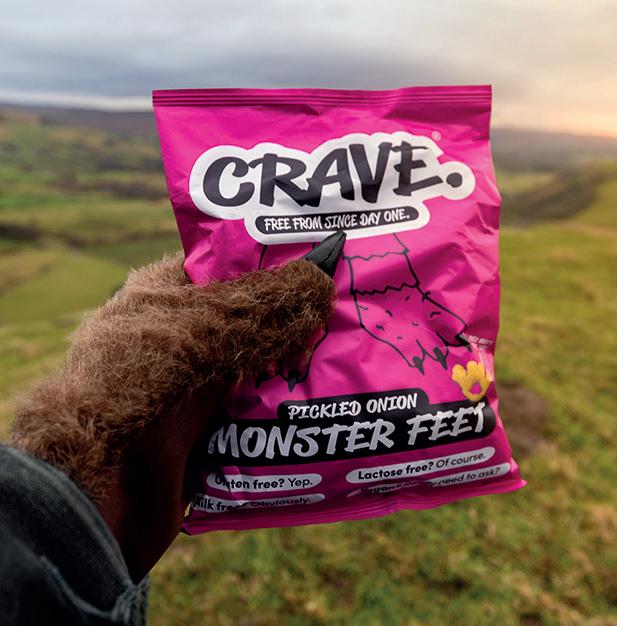
Taste Test 24
The switch to sustainability
According to the 2022 UK Brand Sustainability Benchmark Report, one in four consumers have already changed brands based on sustainability perceptions and consumers are switching to brands with the strongest sustainability credentials at twice the rate of the average brand. The report is based on 16,000 respondents and their views on 102 brands, and its top ten brands were: Ecover, Method, Beyond Meat, Linda McCartney Foods, Pact Coffee, Who Gives A Crap, Rude Health, The Cheeky Panda, Simple and Tony’s Chocolonely.

Winter wonders from Wendy’s

Wendy’s® all-new Italian Mozzarella Chicken Sandwich, Italian Mozzarella Cheeseburger and Garlic Fries are bringing bold and savory innovation to menus this winter. “We have a winning track record of taking familiar favorites and combining them in exciting new ways to deliver a culinary experience that you won’t find anywhere else. The Italian Mozzarella Sandwiches are forged from the same delicious inspiration and innovation, giving fans an adventurous flavor experience with every bite,” commented John Li, Vice President of Culinary Innovation for the Wendy’s Company.

Global spirits industry first
Absolut Vodka is to become the first global spirits brand to move to a partly hydrogen energy-fired glass furnace for large-scale production in a significant step to reduce the CO2 emissions from making its iconic bottles.
The hydrogen initiative is an important milestone for Absolut Vodka in becoming completely CO2neutral by 2030, and it has signed an agreement with Ardagh Glass Packaging in Limmared, a subsidiary of Ardagh Group, to use this partly hydrogen-fired furnace commencing in the second half of 2023.

Industry News foodchainmagazine.com 25

26
A RENEWED FOCUS
Traceability and the edible oils market

Improving traceability is one of the key challenges for the food industry –integral to improving the sustainability of products and the lives of workers across the globe. What is the edible oils industry doing to increase traceability and transparency in the supply chain?
Gary Lewis, Current President of The National Edible Oil Distributor’s Association’s (NEODA) and Chief Commercial Officer at KTC Edibles explains.
Edible oils – current traceability levels
Efforts to improve traceability and sustainability in the oils market have typically focused on forest risk commodities – palm oil and soya. This is because of the real, measurable association unsustainable production has with deforestation, displacement of indigenous communities and threatening endangered species.
Today, the most traceable edible oil is palm oil – as over the last 15 years, huge efforts have been made to develop more traceable, sustainable supply chains. The development of certification schemes such as RSPO has transformed the palm oil market.
Although there is some way to go, more than 71 percent of the UK’s palm oil is now certified sustainable. At KTC, we’ve now switched to 100 percent certified sustainable segregated palm oil –and we expect other companies to follow our lead in the coming years. The progress has been fantastic. It’s a blueprint for change that we now need to look to apply to other edible oil commodities, like soya.
Soya is roughly where palm was a decade ago – with limited transparency in the supply chain, and poor consumer understanding of the issues. Although there are certifications in place, none are as developed or trusted as those associated with palm.
Traceability foodchainmagazine.com 27
The good news is that things are changing, thanks to initiatives such as The UK Soy Manifesto, a 2021 industry commitment to ensure soy that enters the UK market is sustainable. It generated good engagement, with signatories making up nearly 60 percent of the market – although there are concerns about whether the certification schemes are robust enough to drive meaningful change.
Outside of the forest risk commodities, traceability has been less of a priority. Rapeseed and sunflower are not associated with the destruction of rainforest – so there has been less pressure to provide transparency. This is now changing.
Changing demands - traceability beyond sustainability
Traditionally, demand for traceability in edible oils has been driven by one of two factors – sustainability, and method of production (e.g. Non-GM and organic).

Now, we’re seeing an increase in brands demanding traceability on social, ethical and political grounds. For instance, with the war in Ukraine, we’ve had customers trying to eliminate all Russian products from their supply chain.
Unfortunately, increasing traceability within the sunflower oil supply chain depends on the crushers – many of whom utilize seed from multiple countries. Providing finished product segregated by country of origin isn’t something they’ve had to think about until now.
So far, crushers have proved reluctant to address the issue - and their focus over the past two years has been firmly on security of supply. As the Ukraine crisis drags on, and supply continues to remain tight, it seems unlikely that this will improve soon.
Changes in focus –from traceability to security in supply
Supply chain challenges, the war in Ukraine and global price rises have led to a change in focus when it comes to sustainability.
Pre-pandemic, the trend was clear – with a clear increase in demand from customers for traceable, sustainable commodities.
However, the last few years have moved the priorities back to supply. Customers have been more concerned with getting raw materials, and have been prepared to compromise on their commitments in order to meet price points and get products to market.
Soya -
traceability up but sustainability
down?
Thanks to supply chain developments, new technology and looming legislation driving change, traceability in edible oils such as soya is improving all the time. Unfortunately, changes in the global market look set to significantly constrain supply. Demand for sustainable soya already outstrips supply, and there’s a real chance that we may have better traceability… but no supply of sustainable product.
28
Buying from EU sources is one way of assuring higher sustainability/non-GM – but there simply isn’t enough being produced.
Currently, the growth in soya production is coming from South American countries, such as Brazil and Argentina – but there is little incentive to produce sustainably, thanks to huge demand from Asian countries like China and India.
At the same time, the world’s soya millers often purchase from multiple different countries, making it impossible to trace the origin.
change, especially when it comes to soya. In the EU, we’re already seeing growers increase planting of non-GM crops in response to growing demand.
Long term, expectations on major food producers to evidence their carbon footprints and Scope 3 (supply chain) emissions will put increasing pressure on the entire supply chain – including crushers, mills and growers to provide a level of traceability that simply doesn’t exist yet in most commodities.
“ “ “ “
Another big issue lies with the growth of the biofuel market, especially in the US. Increasing biofuel mandates (the US requires motor fuels to contain ten percent biofuel), and the emergence of biofuel applications such as SAF (Sustainable Aviation Fuel) are taking up an ever-increasing proportion of US soybean production. All the projections are for this to increase in the coming years.
As a result, exports from the world’s leading producer may fall, and users will need to source from elsewhere. The shortfall is likely to be filled by countries such as Brazil and Argentina, where production is contributing to the destruction of rainforest, and the displacement of indigenous peoples.
Solutions to drive sustainability
There is some positive news – there are more sustainable options available than ever before, and traceability in edible oils is improving all the time.
As things stabilize over the coming years, we expect a renewed focus on traceability to force the market into
In the meantime, food businesses looking for traceability and sustainable solutions will inevitably have to pay a premium – as demand outstrips supply. Balancing the value of this against the cost of solutions in the current environment looks likely to be a real challenge! ■
Gary Lewis www.ktcoilsandfats.co.uk www.neoda.org.uk
Gary Lewis is President of NEODA and Chief Commercial Officer at KTC Edibles. Founded in 1972, KTC Edibles employs more than 275 people across two UK sites in Wednesbury and Liverpool. The company supplies more than 250m litres of cooking oils to customers of all sizes across the UK food industry each year.
The National Edible Oil Distributor’s (NEODA) key objective is to promote the interests of its members and raise standards across the entire edible oil packing and distributive trade. NEODA’s members include edible oil and fats refiners, processors, distributors and waste oil collectors (who also sell fresh oil). It also covers manufacturers and suppliers of non-oil products (including batter mix, sausages, packaging, potato preservatives) and other industry bodies.

...there are more sustainable options available than ever before...
Traceability foodchainmagazine.com 29
The future for food?
Automation in the food industry: why AI holds the key to future success
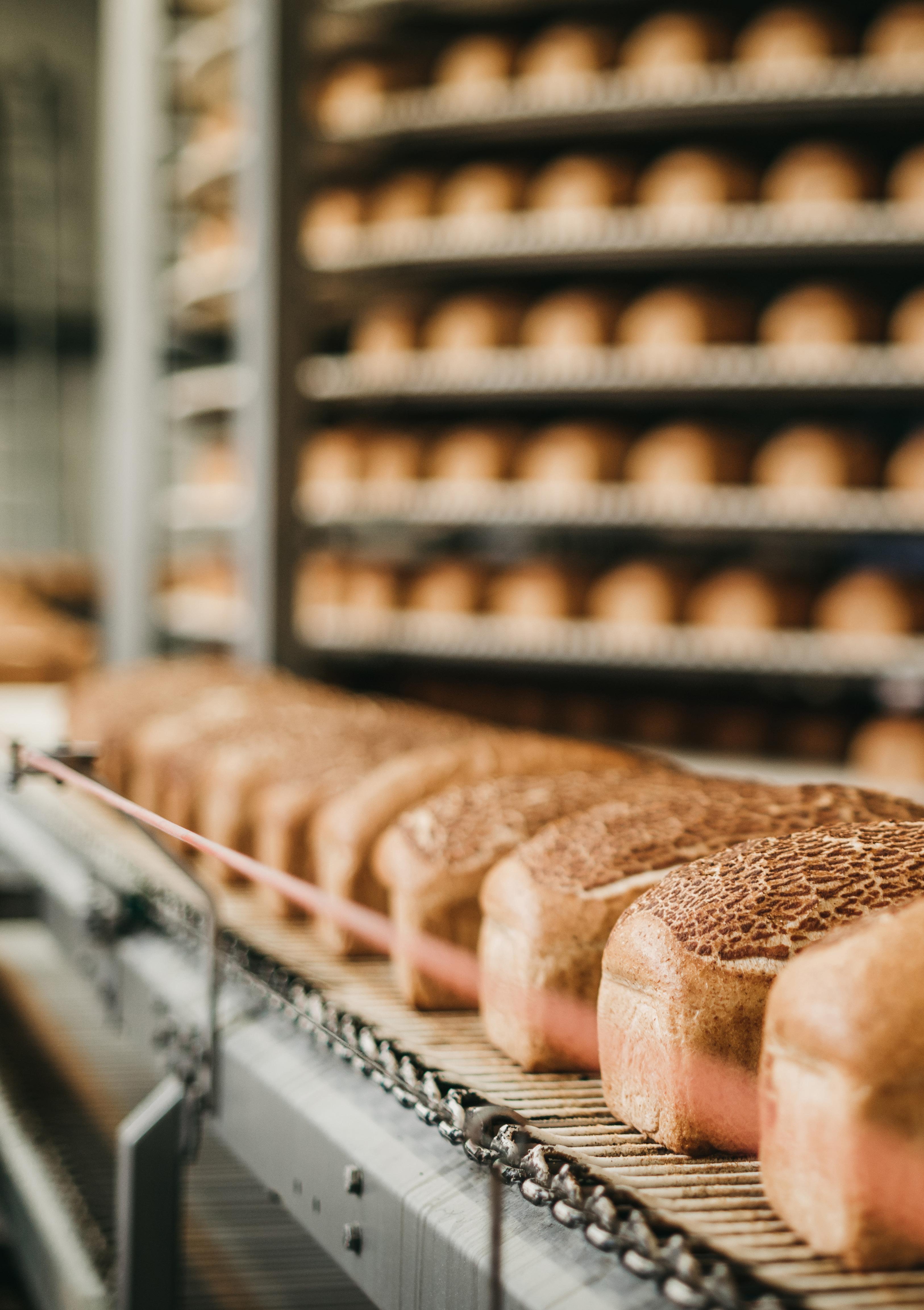
“ “
Automation technology has been on a path of steady growth for the past few years. Having been predicted as one of the top industry trends for 2022 based on extensive data evidencing its increasing importance in the food sector, it is safe to assume that these newfound solutions are here to stay, and for a reason.
The future of manufacturing revolves around Industry 4.0, and AI is an intrinsic part of how product distribution practices are morphing to make room for machine learning and smart solutions.
Here, Ian Hart, discusses why manufacturers should turn to automation and AI to deal with emerging trends within the food and beverage industry.
The post-pandemic world
The Covid-19 pandemic has undoubtedly accelerated the rise new digital
technologies, and as we emerge from the earlier, more challenging stages of the pandemic, we are faced with a world that relies even more extensively on automation.
“ “
Whilst in the midst of the pandemic, companies had to devise ways of coping with staff shortages and unstable work conditions, with safety regulations also affecting the amount of personnel that was able to be in a facility at any given time.
In an era when relying on manual labor has become increasingly more difficult, food manufacturers find themselves in need of modern solutions, which automation technology and AI are able to offer.
By investing in systems capable of carrying out tasks and processes in a consistent and efficient way, manufacturers can rely on processes that are significantly more risk-free while also complying with new, fast-changing regulations and addressing Covid-related concerns such as sanitation.

The procedure of cleaning equipment can be optimized by employing AI...
Artificial Intelligence foodchainmagazine.com 31
Considering food safety
The Covid-19 pandemic has undoubtedly changed the way individuals think about hygiene, prompting them to consider how and where their food is produced and packaged.
This wave of concern regarding food hygiene was fast-rising regardless of the lack of evidence that the virus could be transmitted through food, rendering new solutions capable of catering to these needs essential.
“Automated procedures can significantly reduce the risk of food-safety hazards, putting consumers’ minds at ease. In the end, we need to think about what’s going to benefit consumers longterm and provide a return, as food hygiene concerns are unlikely to disappear any time soon,” says Ian.
Improving product quality should therefore be a main point of focus for manufacturers, and a significant contributing factor to food safety and compliance is cleaning practices.

Traditional cleaning procedures cannot compete with intelligent systems capable of detecting even the smallest of toxins or contaminants, which can drastically improve product quality.
The procedure of cleaning equipment can be optimized by employing AI, which can be programmed to detect even the smallest of substances that could potentially be harmful to food production lines.
Adapting to key trends within the food industry
While the increase in production of plant-based food is not a new trend, it is one that is nonetheless on the rise, with demand having more than doubled in value since 2016. Producing plant-based foods requires different procedures to be implemented, particularly when they are produced in the same factory as meat products. By offering efficient and quick quality assurance procedures, automation can cut down on the time that is spent ensuring there is no cross-contamination.
32
“Manufacturers should cater to the needs of consumers and adapt as quickly as possible”, warns Ian. “For instance, consumers’ commitment to sustainability remains strong in spite of the spike in popularity of packaged food throughout the Covid-19 pandemic, with environment-conscious shoppers now returning to their pre-pandemic habits.
“In this context, rising concerns about food wastage have become relevant again, and AI may just hold the key to developing stable processes to contribute to the sustainability cause,” he continues.
While AI can be programmed to reduce waste and therefore prevent edible food from being disposed of by accident, this technology can be employed to collect useful data and in turn develop algorithms that can consistently prevent waste within a supply chain.
New heights
Automation technology can improve the efficiency of overall manufacturing projects in a variety of ways, and open a world of previously inaccessible solutions. As it is paving the way for new routes within the food and beverage industry and beyond, it is not surprising that artificial intelligence is deemed to be the future.
Automated software can provide traceability within the supply chain by collecting and storing data that can be accessed later on by manufacturers to find faults in a system or procedure or identify the source of issues or time delays.
Additionally, AI can operate in environments that could be unfit for humans, such as extremely hot or cold environments, and even contribute to producing food of higher quality by
identifying ideal growing conditions for fresh produce, resulting in better flavor, and thus better products.
Seeking out automation techniques to keep up with demand and changing habits is increasingly more relevant in an era where improving food reliability is essential. Changing our habits on such short notice requires adaptable solutions, and AI can be programmed to quickly change the way activities or tasks are performed, ultimately providing a great return in investment by allowing manufacturers to adapt more quickly.
It’s vital that manufacturers and businesses seek expert advice to help safely manage operations that incorporate automation technology and AI. With a wealth of experience in the engineering field, adi Group can provide tailored AI and manufacturing systems solutions that efficiently address clients’ needs, no matter how complex or ambitious. ■
Ian Hart www.adiltd.co.uk
Ian Hart is business development director at adi Projects, a division of renowned engineering firm adi Group. Designing, constructing and self-delivering robust client solutions from over 30 specialist disciplines, the adi Group takes a holistic approach to sustainability, skills and partnership. Consistent, organic growth since its establishment in 1990 has enabled the business to broaden the portfolio of services it offers clients in the Automotive, Food & Beverage, Manufacturing, Aerospace & Defence, Pharmaceutical and Petrochemical sectors.
Artificial Intelligence foodchainmagazine.com 33
“ “ ...AI can be programmed to quickly change the way activities or tasks are performed... “ “
INFORMED DECISIONS
Earlier this year, research firm Coresight conducted exclusive interviews with 219 leading grocery retailers in North America to discuss the issue of food waste. The findings were shocking. A massive 30 percent of all food in the US grocery sector is thrown away – whilst an estimated 50 million Americans will face food insecurity this year. Campaigning group WRAP suggests in the UK, the food waste figure could be even higher at 40 percent.
The retailers estimated that this would lose them a collective $21 billion in net income annually and incur extra costs to the tune of $2.1 billion just to dispose of 40 million tons of waste. Whilst of course this report is only a snapshot of North America, the issues are global and according to UN estimates a third of the world’s food is either lost in the supply chain or wasted at the retail, food service and household level. That’s about 1.3 billion tons a year.
What needs to change? The Coresight report suggests that retailers in North America are on the right path. Firstly, they are committed to action with nine in ten stating that reducing food waste is important

for reaching their sustainability goals and 72 percent have set sustainability goals specific to food waste. Secondly, they’ve also committed to investing in technology with 84 percent committing budget to waste savings within two years. These technologies include AI-based demand forecasting (stated by 25 percent), electronic shelf labeling (17 percent), RFID tags and active intelligence packaging (15 percent), blockchain (14 percent) and edible coatings to extend product shelf life (ten percent).
Item level tracking is key
What many of these technologies have in common is the ability to isolate products down to an individual item level. Currently, in most cases the tracking of food products through the supply chain and then to the retailer is done either via barcodes or RFID on pallet or container level. Both approaches are tried and tested. They have been the mainstay of the industry for decades and largely effective, but there is an intelligence gap. Barcodes for instance only identify products at a SKU level, it won’t tell the retailer about the age of the products on the shelf. RFID tagging of products
Why does so much food go to waste asks Max Winograd
34
at pallet level is a significant step up from just relying on barcodes. However, individual items will get separated once in store, or in the warehouse in which cases they then become ‘lost’ to the overall system.
This is why tagging at item level is so important. By providing every item with a ‘digital identity’ it becomes a source of data which can be analyzed in a connected product cloud to alert on anomalies and inefficiencies across the supply chain. This can include information about the overdue movement of products at a pallet level or even isolated individual items within a warehouse that are close to perishing or otherwise ‘lost’. Temperature variance alerts can also be introduced, further helping to minimize spoilage and reduce waste.
food waste
“ “ “ “
requirement further down the line. The EU ‘Digital Product Passport’ regulation for instance now mandates that consumer goods contain important information about the makeup of each product so that users across the supply chain can reuse it or treat it correctly at waste management facilities. Whilst this doesn’t apply to food yet, a natural extension could (for example) see it extended to food packaging to ensure as much as possible is recycled or re-used.
Breaking down silos
Legislation is starting to bite
Legislation is increasingly meaning that the above becomes a necessity. The US Food Safety Modernization Act for instance mandates that it has the right to recall all food products. It also specifies that: “for the first time, importers must verify that their foreign suppliers have adequate preventive controls in place to ensure safety, and FDA will be able to accredit qualified third-party auditors to certify that foreign food facilities are complying with U.S. food safety standards.” Item level tracking makes both processes much easier and quicker. In the event of a critical recall, it’s not hard to envisage how time saved could even impact on lives saved.
Another benefit which will become increasingly important is to capture the carbon impact of the of products, including Scope 3 emissions (which governs the supply chain). By capturing data from every stage of a product’s journey, from raw material to consumer, this can help firms to demonstrate best practice to consumers. It may also become a legislative
All firms within the food industry capture data but it often exists in silos where it’s either not actionable or can’t be done quickly enough. Moving to a mindset of item level tracking with a connected product cloud that acts as a single source of truth means that these silos get broken down and finally firms can make the informed decisions in real-time that can dramatically transform their ability to reduce waste and impact on their bottom line for the benefit of their organization as well as the planet. ■
For a list of the sources used in this article, please contact the editor.
Max Winograd www.atma.io/solutions
Max Winograd is responsible for leading Avery Dennison’s digital venture atma. io, which has built the world’s leading connected product cloud, enabling any everyday item to have a unique digital identity. In addition, Max oversees product management for Avery Dennison Smartrac. Max joined Avery Dennison in 2017 to launch Avery Dennison’s corporate venture capital (CVC) program and currently serves on the boards of directors of three of Avery Dennison’s CVC portfolio companies.
...72 percent have set sustainability goals specific to
Packaging foodchainmagazine.com 35
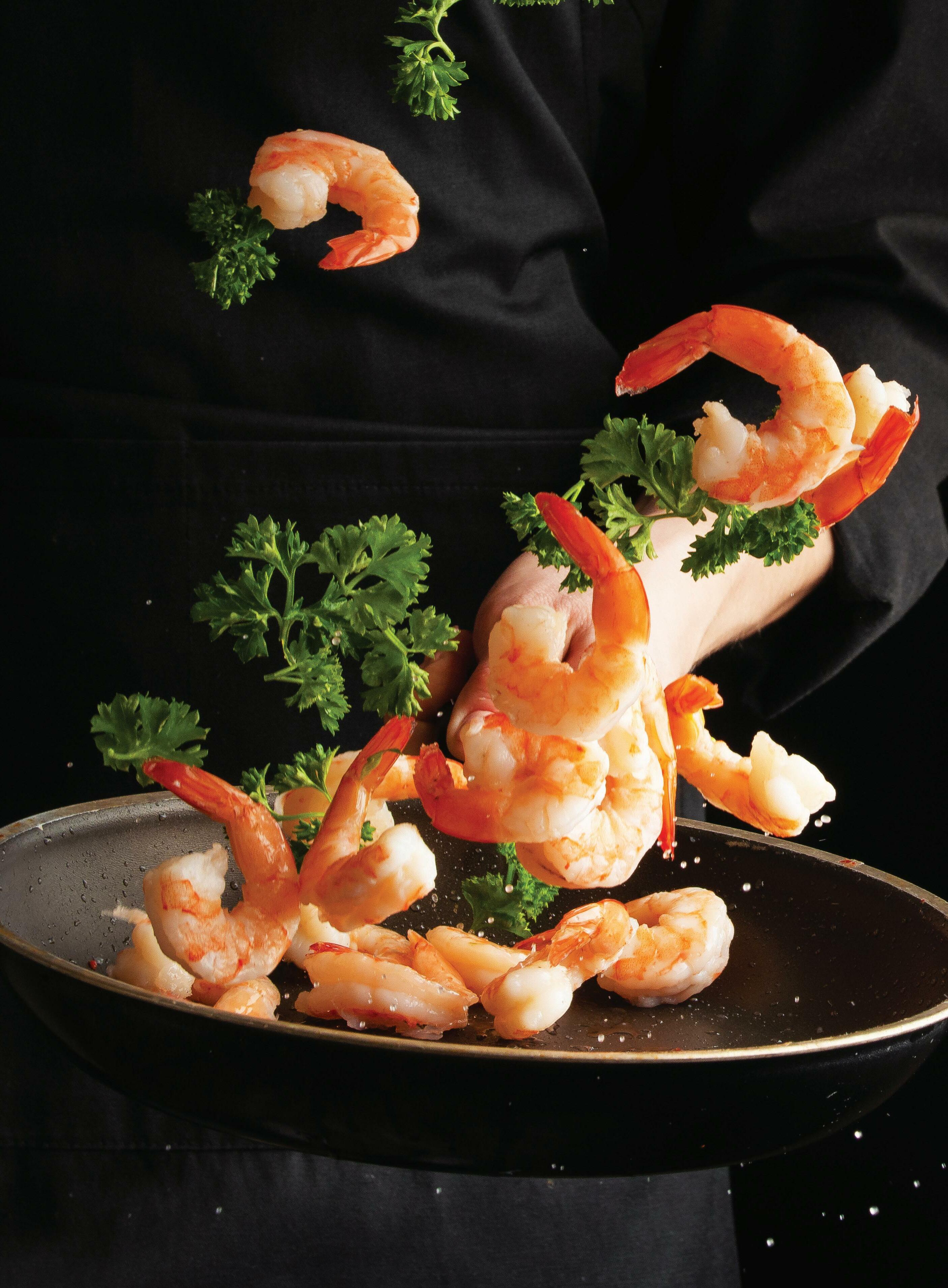

Keeping a COOL head
FFD: the commercial distributor serving the likes of PepsiCo and Morrisons

38 Exclusive Feature
When, along with a former business partner, Cory Greenhough launched Fridge Freezer Direct back in 2006, his idea was to sell domestic and commercial refrigeration units online. A mixed customer response, however, led Cory to take the bold decision to abandon the domestic portion of the business, turning his attention solely towards the commercial market. It was a good call. Armed with his IT experience, Cory found the demand needed to propel the business towards impressive growth – a trajectory on which it has continued for the last 16 years.
Now rebranded as FFD, the company supplies mission-critical equipment to a number of key industries. Hospitality, a sector still reeling from the devastating impact of

foodchainmagazine.com 39 FFD - Commercial Refrigeration & Catering Equipment
the Covid-19 pandemic, is among the company’s core markets, but it’s not the only audience in need of refrigeration. As Cory says: “We deal with everybody from the public consumer who wants a cooler for their home bar, through small cafeterias, shops, mini-marts, convenience stores, delicatessens, restaurants, bars, nightclubs, and a whole myriad of public sectors – including the armed forces – to global blue-chip brands, such as PepsiCo.”

Understand the benefits
This rise is, in part, down to Cory’s pioneering approach, and a commitment to ecommerce in an industry where technological innovation is not always top of the agenda. “Compared to other industries, a lot of the brands, manufacturers and associations are somewhat behind the times,” he concedes. “The pandemic did a huge job of shining a light on that, exposing the distributors & manufacturers that weren’t able to modernise their operations.
“We need to be mindful that ecommerce is a highly competitive market, with a number of distributors selling the same brands.”
How, then, has the group sought to distinguish itself from the field? The answer: a rigorous commitment to customer service.
“We’re transparent and upfront in everything we do,” Cory comments. “If something goes wrong, we’ll put our hands up, own it, and work as hard as
we possibly can to resolve it. We have a dedicated service department, and because we’ve been trading online for nearly two decades, we’ve gained the necessary expertise to know that it’s not just about shifting boxes. It’s about specifying the right product/s for individual customer requirements and creating an experience that, ultimately, brings them back to our door when they need to purchase their next piece of equipment.”
Increasingly crucial to this, is FFD’s ability to help its customers understand the environmental benefits of the products they choose – an area in which there remains plenty of room for improvement. “It often surprises me how little people question us about the energy efficiency of equipment,” Cory reflects. “Even prior to recent energy price increases, the equipment that we sell is not cheap to run, and these details can make a significant difference to our customers’ pockets. For instance, an open fronted chiller is about half as energy efficient as a doored cabinet of the same size. Our role is to educate our customers and help them to understand those benefits. Energy efficiency is a high priority at the moment and indeed will continue to be more so in the future as we all work towards a zerocarbon footprint, so it needs to be top of our priority list.”
Amid the difficulties of Covid-19, it’s been a pivotal couple of years for the FFD Group, and for Cory personally. Towards the end of 2021,
“ “
The team believes that we now have a really solid base to build a growth strategy from 40
“ “ Exclusive Feature
he took the decision to buy out his partner from the business, before relocating to a brand-new premises. Again, it’s a decision with future growth in mind.
“The size of our new office and warehouse space is four times that of our old location,” he reveals. “With that, comes brand new equipment and internal systems – investments which are designed to make us more robust, and increase our resilience moving forward. As we develop our revenue, it will give us even greater budgets to play with, and the freedom to further invest, improve our processes, products, and support, and welcome bigger and better things.”
Optimistic buzz
Speaking of better things, in February of this year the company welcomed the launch of its new set of websites unifying the FFD brand. A project a long time in the works, and severely impacted by the pandemic, it remains a work in progress. As Cory explains, the team has been hard at work to tackle outstanding issues and iterate its design.
“The whole team has really had to knuckle down and chip away at the problems one by one,” Cory reflects, acknowledging the outstanding contribution of his team. He continues: “It’s made for a tough start to the year, but we’ve certainly kept our cool and remained focused on the issues at hand. I’ve been steering the ship amid both calm and choppy waters, but kudos to the team – they make the business what it is. I can’t understate my gratitude for their efforts.”
Underpinning the decision to launch the new websites, was a desire to integrate the various strands of the

group’s business. This included the original Fridge Freezer Direct website, but also 24/7 Catering Supplies, a catering equipment website, and a further site, established for the sale of grease traps. “Obviously, all these micro-niches are targeting the same customer demographic,” Cory laughs. “If you need a piece of commercial refrigeration, you’ll likely need commercial catering equipment, and grease management of some sorts. We realized we need to pull everything back together under a unified brand, incorporated under FFD. Now, customers can shop across each segment of the business with a single basket. We’re already starting to reap the rewards of the new site/s, and by the end of the year, we expect to have really refined all its elements.” Looking further into the future, there’s a buzz of optimism throughout FFD, having successfully navigated such an extraordinary period. “The team believes that we now have a really solid base to build a growth strategy from,” Cory insists. “The next step is to bring out our own range of products, including grease management solutions, some steel fabrication catering equipment, and more. It’s nothing we’ve done before, but we’re aiming to begin that in summer of next year. All in all, things are looking very promising. We are financially sound with a solid platform to build upon and I believe it’s going to be onward and upwards from here.” ■

www.fridgefreezerdirect.co.uk foodchainmagazine.com 41 FFD - Commercial Refrigeration & Catering Equipment
Fuel for growth
Ihave been in the consumer goods industry for almost three decades,” begins Alexandre ‘Ale’ Eboli, Executive Vice President and Chief Supply Chain Officer at Conagra. “My career began back in my home country of Brazil, then Latin America and Europe, until I arrived in the US and joined Conagra. I have spent the last 27 years working and travelling across different geographies.
“The beauty of Conagra is that we are a highly focused company in terms of our portfolio,” he goes on. “By concentrating on the North American market and consumer brands, we have created a strong sense of team spirit and commercial agility, allowing our employees to collaborate in an inventive way. We do things quickly, both in terms of connecting to customers as well as expanding and maintaining the brands they love.”
Conagra is the manufacturing force behind household brands such as Birds Eye, Slim Jim, Gardein, Duncan Hines, Healthy Choice, Earth Balance, Reddi-wip, and Orville Redenbacher’s – just to name a few. In the last 15 years, Conagra has made a concerted effort to modernize its portfolio, creating fresh products – and revitalizing iconic ones – to reflect the needs of customers and consumers alike.
In today’s highly competitive marketplace, it has never been more important to stay relevant and up-to-date with the latest trends. Consequently, as Ale details, the food giant has grown even bigger in stature, garnering substantial returns for its shareholders and investing back into the business and its portfolio of iconic brands.
Why supply chain is the beating heart of any organization, according to Conagra Brands
Cover Story 42
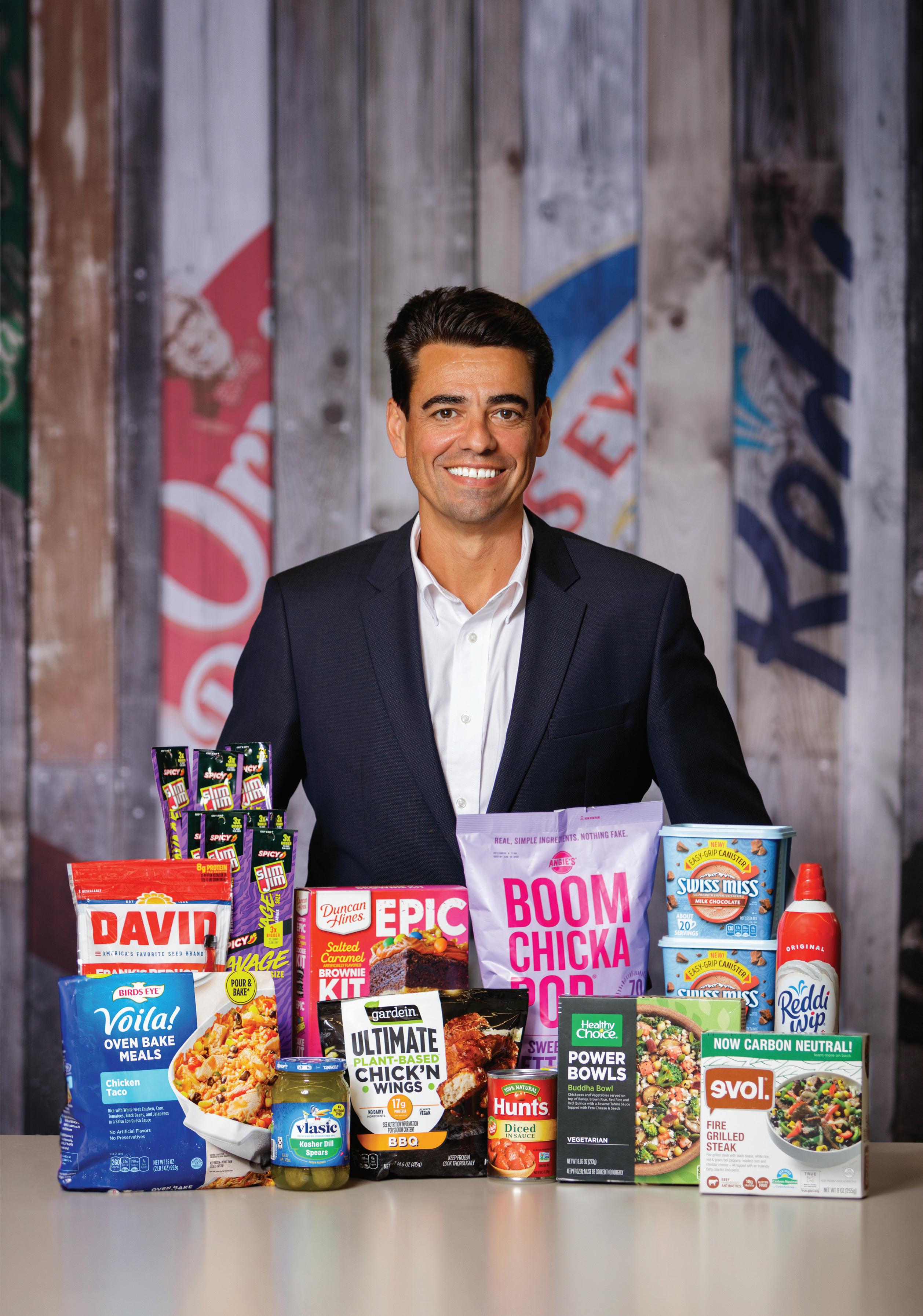
foodchainmagazine.com 43
“ “
“Simply put, our intent is to continue to serve our customers and consumers with high quality food and innovative products – each and every day,” says Ale. “Our products fall into three main categories. First is our frozen food, which has gone through a resurgence in recent years as we’ve introduced new products into the frozen aisle that are more aligned with consumer preferences. By premiumizing our frozen portfolio, we’ve been able to offer consumers convenience, affordability and nutrition, and also a means of reducing their waste through the use of sustainable packaging.”

Fresh food spoils. That is not new. With frozen food, we take out what we need when we need it, and the rest is saved until another day. Less ends up in the bin. But Conagra is taking this aspect of sustainability and waste reduction one step further. Evol, a Conagra-owned brand focused on making tangible steps towards the protection of the environment, recently became the first manufacturer to introduce Carbonfree Certified Carbon Neutral frozen meals. In addition, these products are produced in a TRUE certified Zero Waste facility.
To earn this accolade, plants must have diverted an average of 90 percent or greater waste from landfills or made other equivalent waste reductions in the last 12 months. The eco-friendlier range, which includes the all-new Five Cheese Alfredo Mac with Chicken as
We are the metaphorical heart of the company
“ “
Cover Story 44
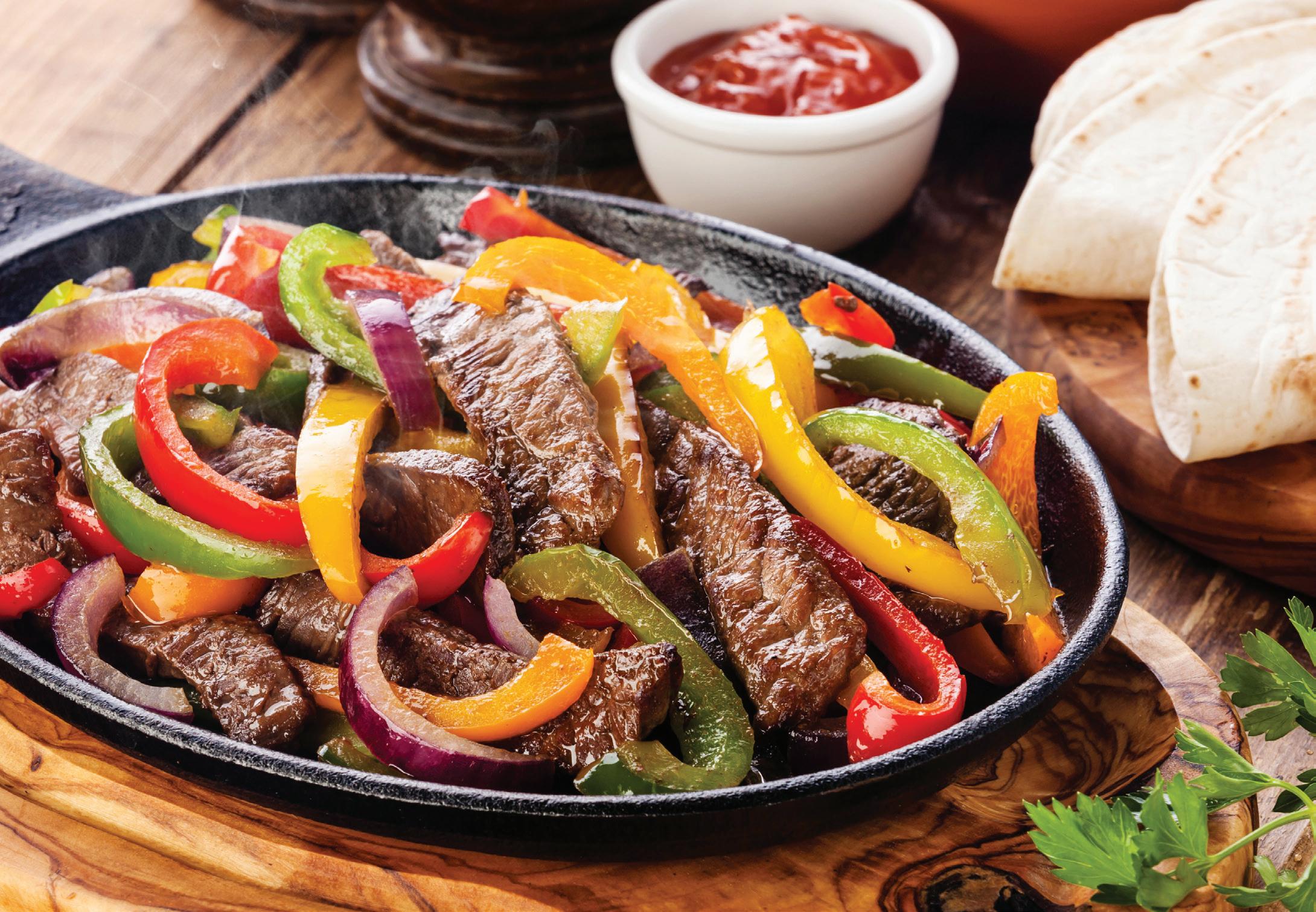

well as eight other certified singleserve offerings, utilizes fully recyclable paperboard cartons and paper bowls to slash the carbon footprint of packaging across the line.
Small changes make big environmental savings. Indeed, across its Healthy Choice Power Bowls range, a significant carbon saving has been made by Conagra. By using plantbased fibers instead of plastic, the carbon footprint of manufacturing select product lines has been reduced by up to 70 percent, helping to decrease the company’s overall carbon footprint by 34,117 metric tons – the equivalent to avoiding greenhouse gas (GHG) emissions produced by driving 84 million miles.
Ale continues his overview of Conagra’s three distinct product
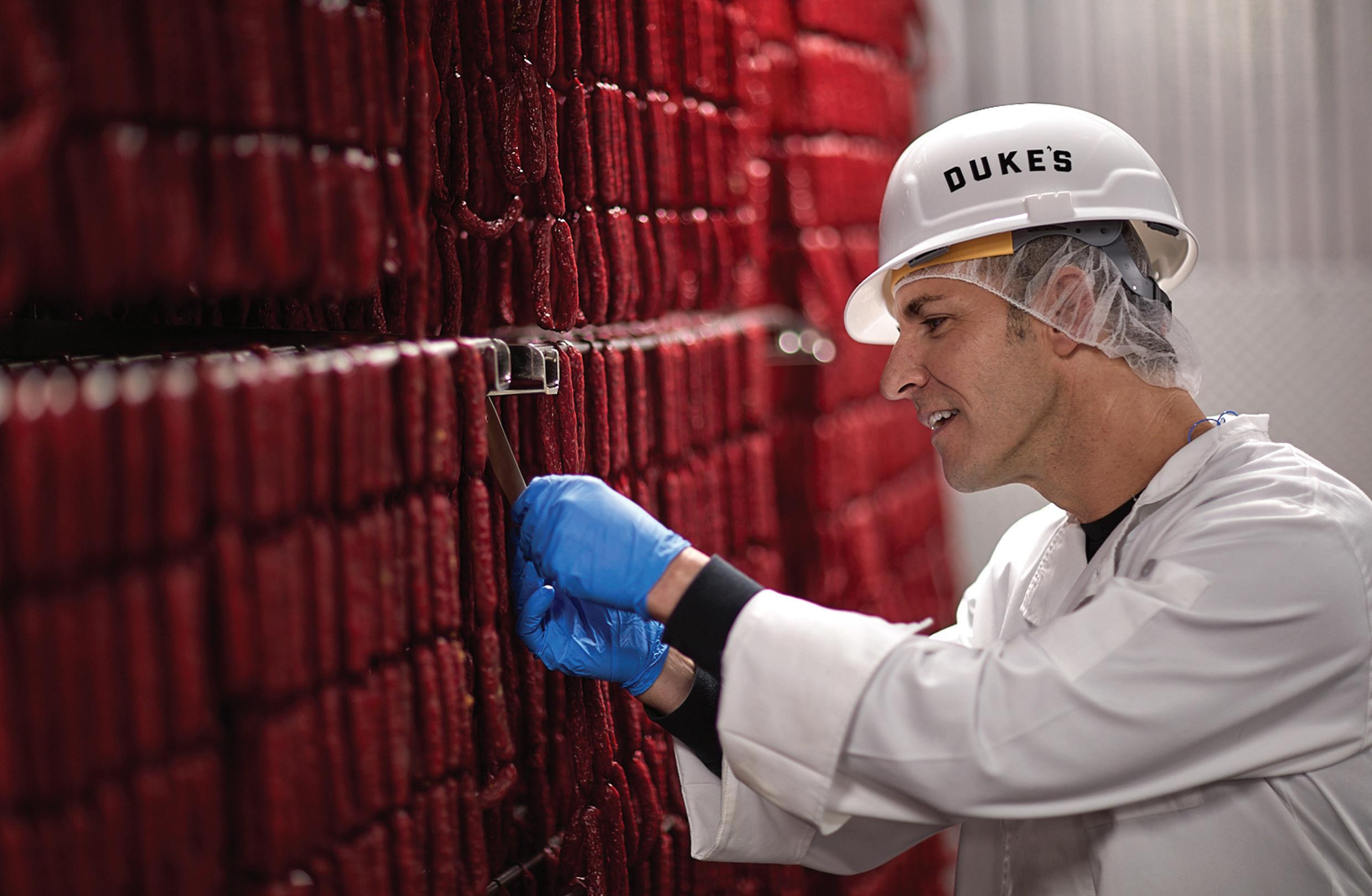
categories: “The second is snacks, so we produce meat sticks, popcorn, sunflower seeds, puddings, and more. We continue to innovate in places that see new or growing consumer demands. If you think about it, a popular meat stick like Slim Jim is free from carbohydrates, and that is really well-received by consumers. Similarly, popcorn offers a healthier option than, say, regular potato chips. These snacks form what we like to call an ‘acceptable indulgence’ for our consumers, and we are growing quite a lot in that space.
Another example is keto-friendly cake mixes from Duncan Hines, a versatile option for those following a ketogenic diet but wanting to still get that sweet fix. Addressing this particular consumer need has stimulated significant growth for us.
Cover Story 46

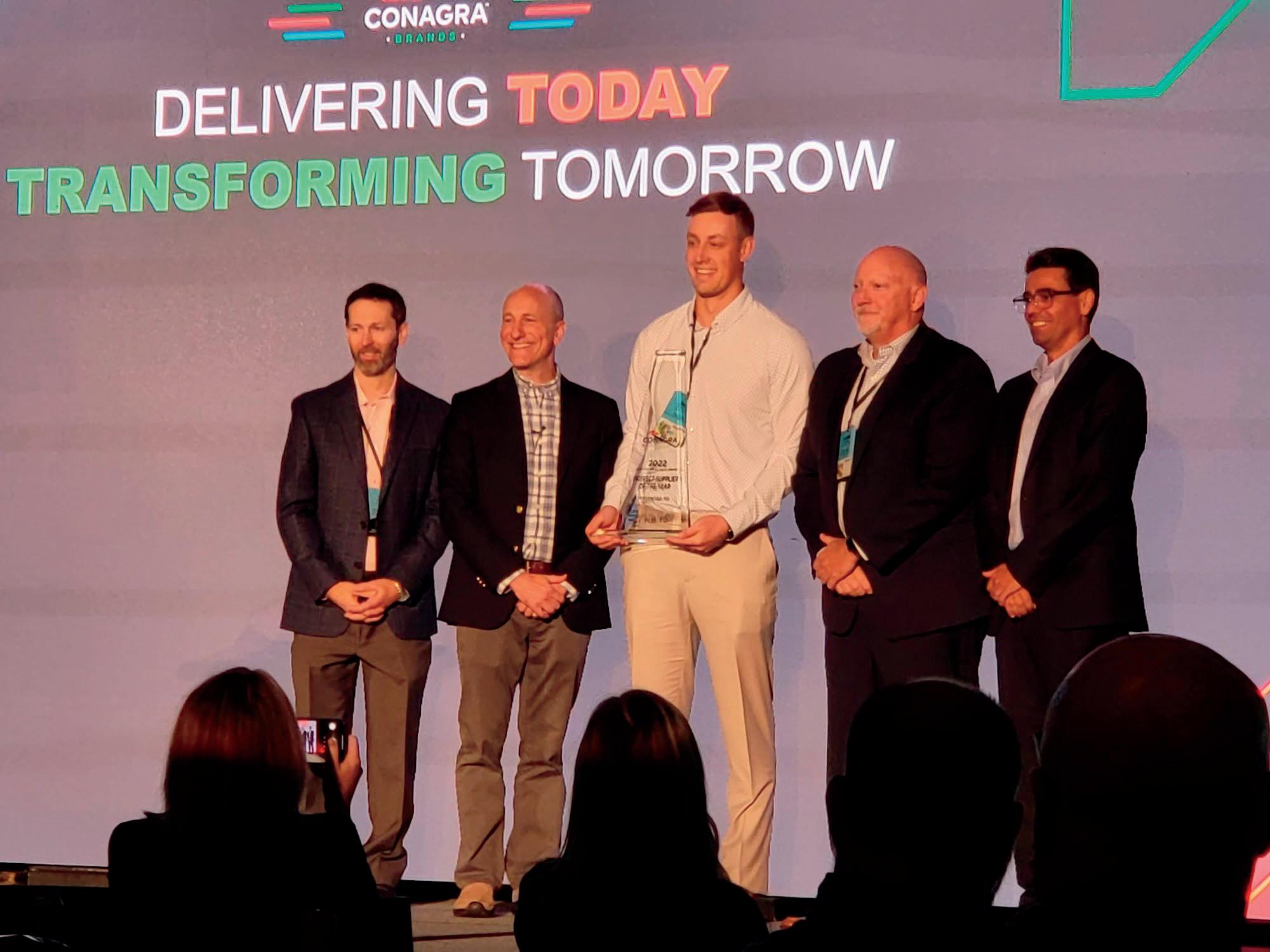
YOUR ADHESIVES SOLUTIONS PARTNER Indirect Supplier of the Year 2022 Award Recipient by Conagra Brands PROUDLY SERVING CONAGRA Driving innovation Facilitating sustainability Prioritizing service Since 1887, H.B. Fuller has provided adhesives, coatings, and tapes to packaging makers and CPG brands. hbfuller.com/packaging
“Finally, we have our staples category, which are ingredients and enhancers, and shelf-stable meals and sides,” he goes on. “This portion of the business is all about keeping brands available, profitable, and serving consumers according to their evolving needs. It is always imperative to identify and match changing trends: ten percent of turnover comes from innovation and delivering products that directly respond to market analysis. It is a core component of our strategy,” asserts Ale.
Beneath the brands, however, is a rigorous supply chain strategy and program that keeps the wheels turning at Conagra. Without it,
particularly in these current times of geopolitical and economic turmoil, names like Slim Jim and Birds Eye might not be available on grocery store shelves.
To prevent that, Ale spearheads a robust supply chain division that focuses on building from a strong base with an experienced and capable team to ultimately drive gross margin and customer service through an aggressive end-to-end productivity agenda. According to Ale, investments in people, assets, and technology make that happen.
Driving forward with an agile and resilient end-to-end supply chain is part of Conagra’s ambition
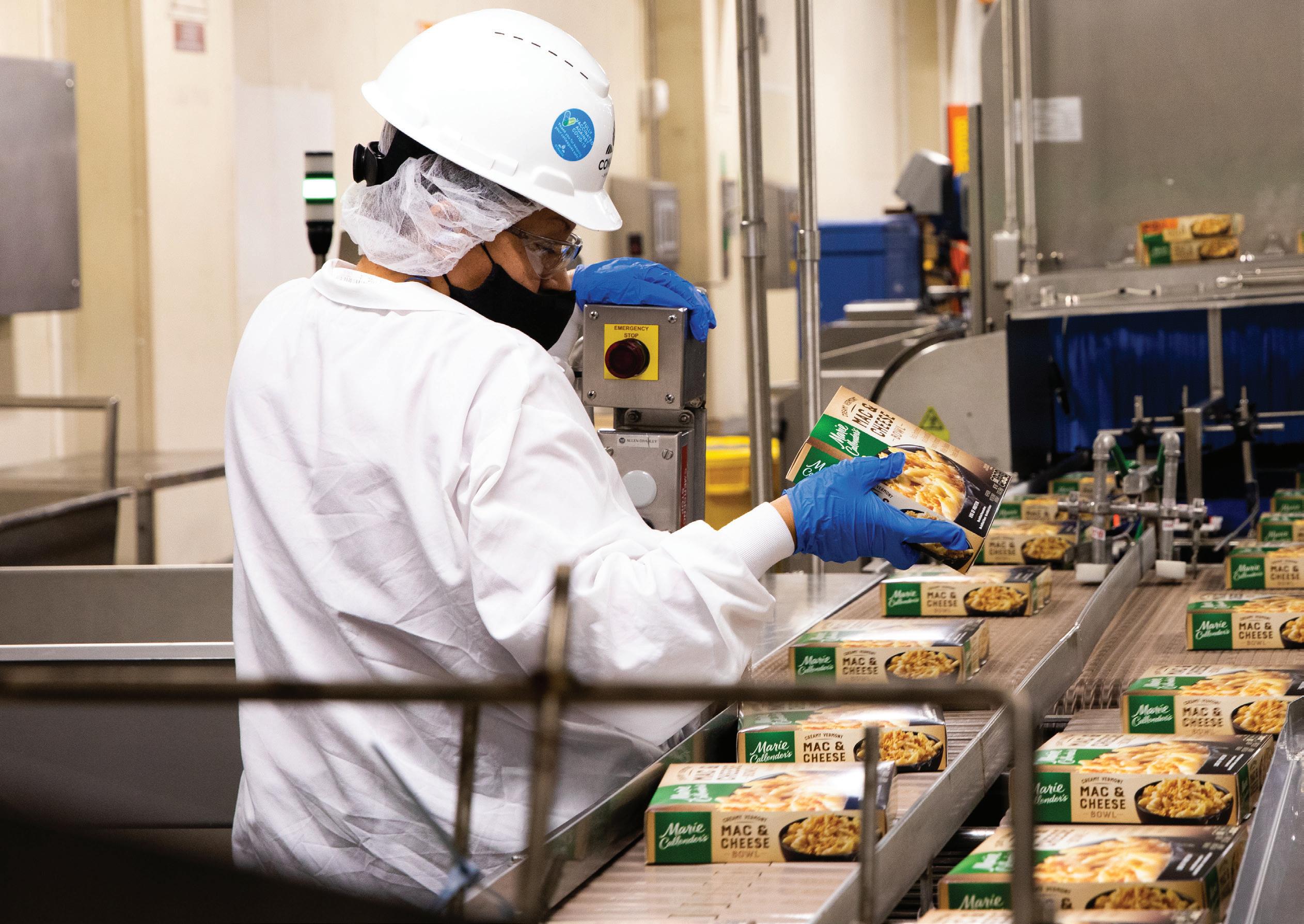
48 Cover Story
of delivering $1 billion in cost savings over the next three years and becoming the best supplier in the food industry. Yet, for Ale at least, it goes much deeper than that. “There are two things in supply chain that allow me to wake up happy each morning,” he reveals. “The first is that we are responsible for the livelihoods of 15,000 people across a total of 42 factories in the US, Canada, and Mexico. These factories are responsible for approximately 80 percent of the food that we sell; the rest is produced by core manufacturers that operate as an extension of our manufacturing footprint. We ship products from 21 distribution centers across the entire country.
“If, on average, each one of those 15,000 employees has a family of four, then you can imagine the number of people we are impacting – and that is not counting suppliers, their workers, and their workers’ families,” he aptly points out. “We are one of – if not
Devro


Devro is a leading global supplier of edible collagen casings and gels for the food industry. We have over 1000 customers in over 100 countries, including many of the top meat snack and sausage companies in the world, and we are particularly proud to count Conagra Brands among them. We boast a modern manufacturing footprint that includes operations in six countries across four continents. Our wide product portfolio enables productivity enhancements and provides sausage products with the superb bite and texture consumers love. Our 85-plus-year history of unparalleled service and operations creates and maintains outstanding relationships with our customers.
Devro is a leading global manufacturer of Edible Collagen Casings and Gels, supplying a wide array of products and providing technical expertise to many of the top sausage and meat snack companies around the world.












Devro, Inc / North America Customer Service Toll free (United States and Canada): 1 800 637 5343
FOR
EXPERIENCE THE DEVRO DIFFERENCE FOR YOURSELF!
devro
Delivering the Added Layer of Value
OVER 25 YEARS AS A PROUD PARTNER WITH CONAGRA BRANDS
www
com
Conagra Brands foodchainmagazine.com 49
the – biggest employer in this wider network of communities; thus, we see it as our duty to conduct business in a responsible way and also give back to the communities. We treat people with respect as we truly have a tangible impact upon their lives.
“The next special aspect of supply chain management is how it relates to and interacts with the wider business,” he says. “We are the metaphorical heart of the company; we make the blood pump through the system every day, despite the challenges and obstacles that are bound to arise. This is particularly special here at Conagra because we have a uniquely strong partnership with sales, marketing, and finance – all of whom are driven to find creative solutions. Indeed, we approach the supply chain holistically
as an orchestrator of specialties, meaning our network of suppliers depends on us to open commercial channels and facilitate the flow of imaginative ideas.”
To expedite that process, Conagra has reorganized its supply chain management, leveraging the integration of end-to-end
Sonoco
Sonoco is a proud partner of Conagra Brands, and together, we work to improve the quality of products for people worldwide. Sonoco has a rich history of helping brands achieve their sustainable packaging goals, and our solutions, services, and programs support our corporate purpose of better packaging, better life.

50 Cover Story

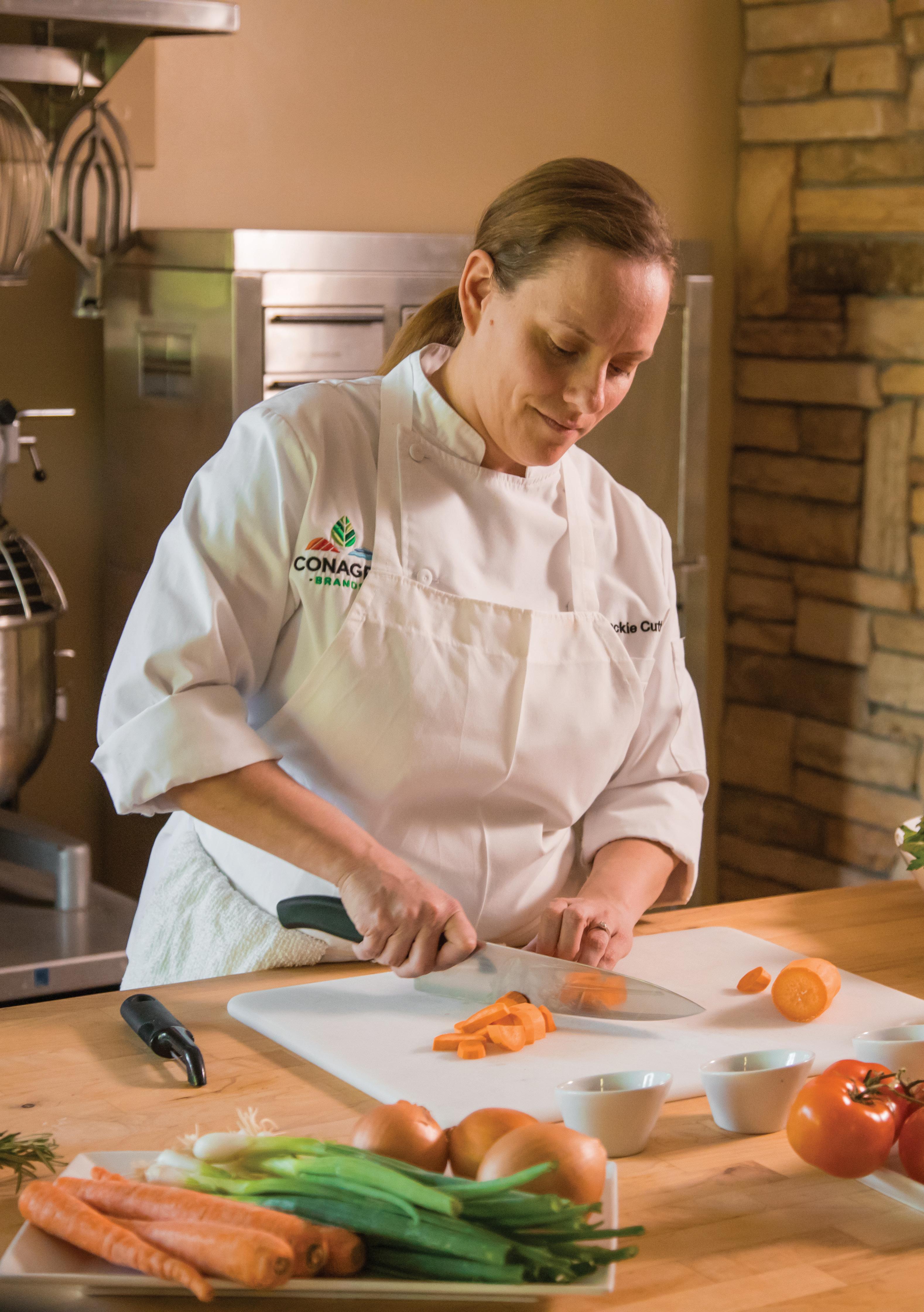
52
procurement, manufacturing, logistics, product quality, and service. Suppliers become intertwined with the customer as part of that network.
Key to Conagra’s strategy is its Fuel for Growth program. Ale explains: “The Fuel for Growth program is made up of five pillars and one core, foundational element. The first pillar is Network Optimization, which is not just limited to logistics. In that area, we are centralizing our network and expect to reduce 50 percent of shipping locations within the next three years. Regarding the manufacturing side, we are reviewing opportunities for either
Burd & Fletcher
Burd & Fletcher continues to meet the food packaging needs of Conagra. For well over a century, Conagra has counted on us for speed-tomarket, package quality, plant efficiency and process improvement. As integrators of its packaging needs, we’re honored to make Conagra’s products stand out on store shelves. From concept to consumer, our role is to protect the company’s brand and supply chain through innovation and continuous process innovation.


Conagra Brands foodchainmagazine.com 53
consolidation or outsourcing (if they are needed), and finding new capabilities that we can leverage.
“The second pillar is Integrated Margin Management, which is basically our productivity program,” he adds. “The focus, here, is on identifying opportunities on mostly a cost basis across the entire supply chain, so we have a strong team of people always looking at how we can optimize formulations, integrate better, reduce waste, increasingly automate, and digitize our supply chain. All this is part of a wider company effort to be more efficient and lean in our manufacturing and distribution processes.
“The third concerns End-to-End Planning and the retooling of related processes,” comments Ale. “This area is utilizing data science and has successfully implemented artificial intelligence to aid that reconfiguration; consequently, thousands upon thousands of models have been created to find the right weekly location for item combinations. Another concrete example we have used to bolster this pillar is a tool called Blue Yonder – a software that allows us to be much more agile in terms of supply and long-term capacity planning.
“Finally, we have pillars four and five,” he notes. “Talent Management is a pillar that reflects how we attract, maintain, and develop our people and offer them a pathway to a successful future, and the final pillar is Sustainability, which can be broadly summarized by improving our operations through five areas of priority: decarbonization, packaging, agriculture, waste, and water. For each of these, we are building programs that mirror our commitment to the environment.”
Ultimately, each pillar underpinning the Fuel for Growth program is sustained by a core element: Conagra’s continued investment in technology. This includes, for instance, Connected Shop Floor, an innovative program that will neatly digitize and standardize all of the food giant’s manufacturing sites, and Oracle Transportation Management (OTM), a logistics service used to upscale a range of execution capabilities.
On a larger scale, Conagra has also recently opened a new, 245,000-square-foot vegetable processing plant in Waseca, Minnesota. The state-of-the-art facility processes fresh vegetables – taking them from harvest to frozen in just five hours – to support Conagra’s frozen division and Birds Eye brand. The
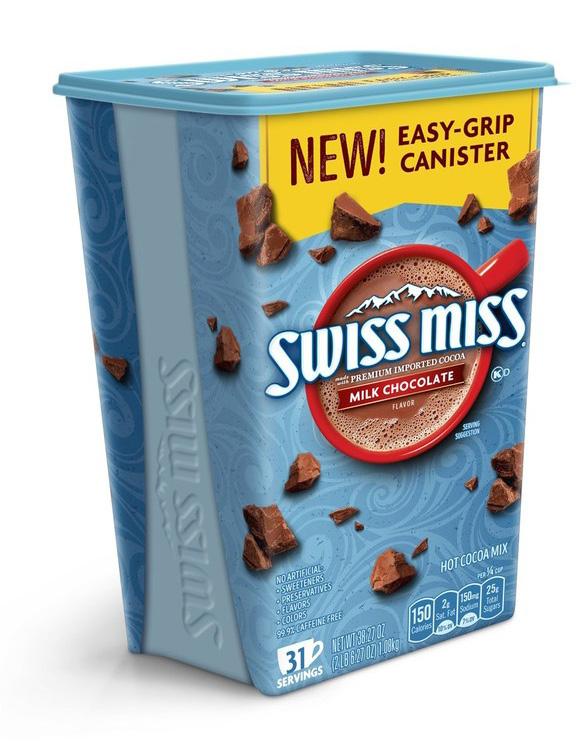

Cover Story 54
Waseca site was built to the company’s own specification, maximizing automation to generate greater operating efficiencies and enhance food safety measures. Water usage per pound of product produced will be cut by upwards of 25 percent and Conagra will operate with a 20 percent higher throughput capacity, leading to a better overall yield.
It is worth pausing on the sustainability aspect of Conagra’s operations once more. Reduced water usage is an important factor across plant processing sites; however, the company aims to embed more
environmentally-friendly methods across its entire supply chain.

Indeed, supply chain sustainability initiatives have not only reduced Conagra’s carbon footprint by 215,000 metric tons and waste by 122,700 tons, but also saved the company $280 million since 2009. Environmentallyminded moves such as this are driven by Conagra’s overarching green agenda: the food company has committed to reducing Scope 1 and 2 GHG emissions by 25 percent by 2030 and will slash Scope 3 emissions from purchased goods and services by up to 20 percent per metric ton of material sourced within that same timeframe.


Conagra Brands foodchainmagazine.com 55
As mentioned previously, Conagra has already begun to implement plant-based serving bowls across select product lines, which have avoided an estimated 23 million pounds of plastic, while also driving $1 billion in sales. Another example Ale is keen to highlight is the transformation of Swiss Miss’ Coco Powder packaging.
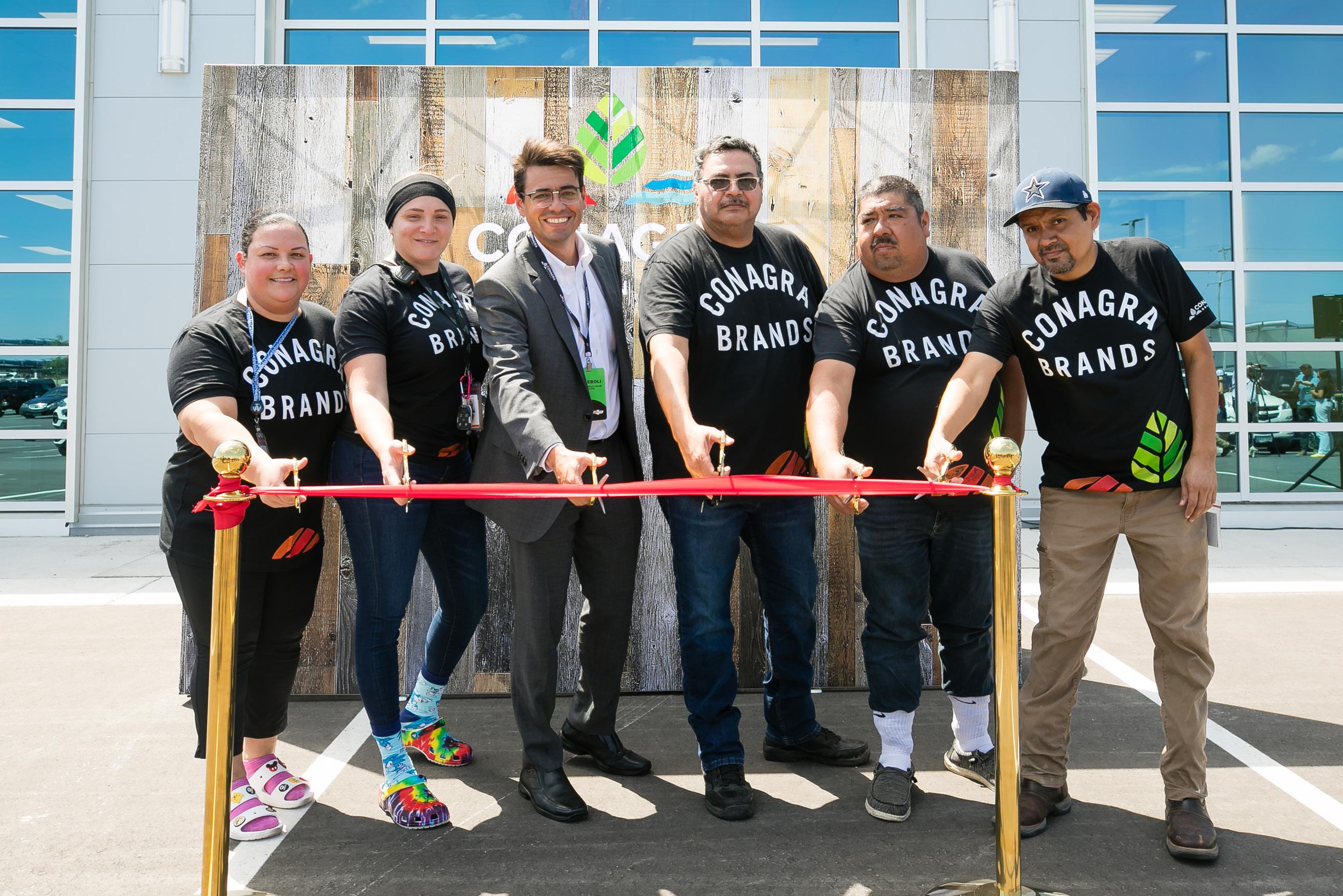

“We were the first major hot cocoa brand to move to a cubical shape instead of the conventional cylindrical one,” he says. “The shape of a product affects everything – how you build and stack pallets, space utilization in transport, and the amount of stock that can be stacked on shelves. By altering the shape of the packaging, we managed to completely change the carbon footprint of the product, making Swiss Miss better for the environment and more profitable.”
The new Swiss Miss easy-to-grip container is made of recyclable plastic and features a space-efficient cube design that is said to reduce the carbon footprint associated with manufacturing and transportation by 15 percent – the same as avoiding emissions expelled by driving 243,176 miles.
“Each sustainability initiative makes sense for both the planet and the business,” concludes Ale. “That interconnection is powerful, and we will continue to invest in this dynamic space going forward. But we will also continue to play the game we are currently winning, and that means continuing to innovate, grow, and listen to consumer demand. Everything comes down to digitizing and improving operations across the supply chain.” ■
56 Cover Story
www.conagrabrands.com


58 Exclusive Feature
THE PERFECT PACKAGE
Poly Print’s strategy to tackle waste packaging is pioneering sustainability for the food industry
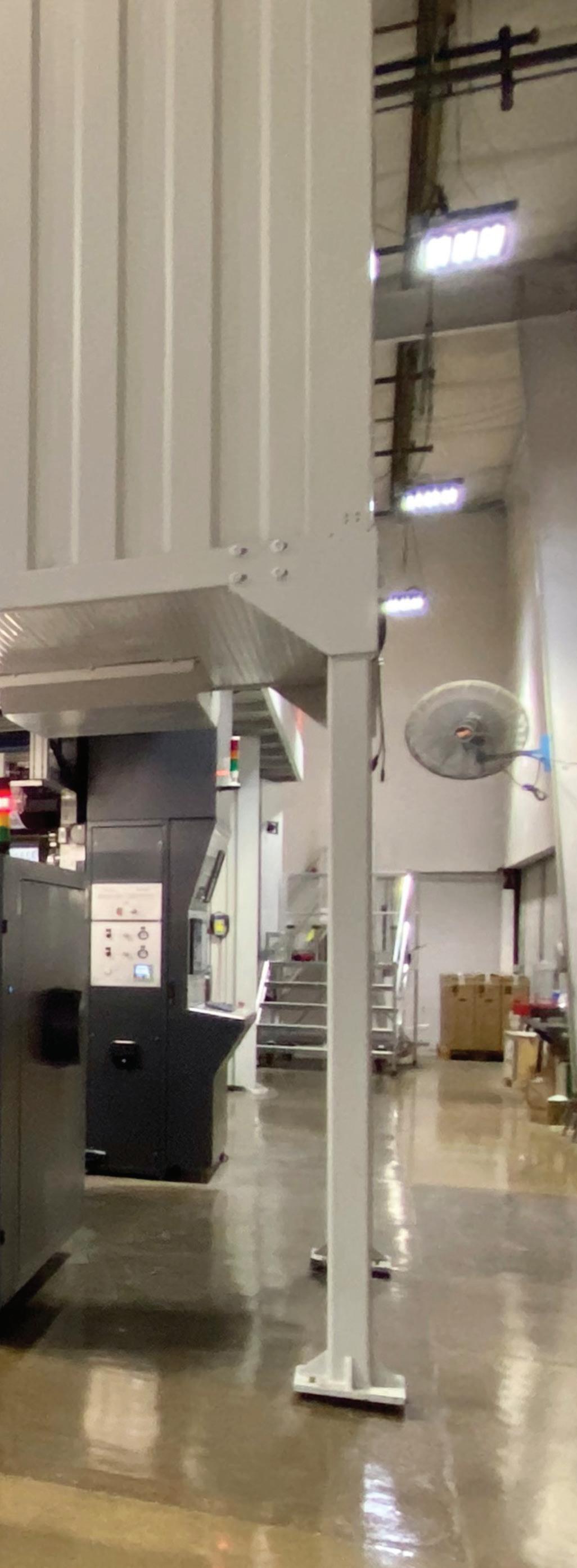
Established in 1992 by the Genova family, Poly Print’s purpose is to offer high quality flexographic printing, adhesive lamination, laser perforation, and pouches. By applying its experience, and resources, the business is proud to provide solutions within the flexible packaging market. Its core market is food packaging which extends to bottle labels, tea, coffee, pet food, salty snacks, produce, nutraceuticals, lawn and garden, and industrial sectors, among others. “We are located in Tucson, Arizona, and have significantly grown the company since our inception,” begins Joe Genova, Owner and Vice President of Poly Print. “I would consider us to be a leader in the flexographic printing and flexible packaging space, with a customer base that expands across the US.”
This year, the business celebrates its 30th anniversary, and we hear from Joe about how the company has revolutionized its operation over the last three decades. “Maintaining perfect supply continuity requires delicate planning, millions of pounds of inventory, capacity and more,” he says. “Our passion and expertise in flexible packaging, as well as our focus on customer service, is what sets us apart from others in

foodchainmagazine.com 59 Poly Print
Joe Genova
our industry, and we are committed to striving for excellence, respect, and integrity through our interactions with customers, employees and vendors.”
Poly Print has been SQF certified since 2014 and earned a perfect score on one of its most recent audits. In addition, it is GMI certified, maintains high print quality standards, is registered with the FDA and complies to the strictest GMP standards. Joe is proud to share that Poly Print focuses on 100 percent on-time delivery. “We understand our place in the food chain; without packaging, our customers cannot deliver product to consumers,” he tells us. “We’ve built a custom ERP software program that is production and planning intuitive and helps us avoid mistakes along the way.”

Continuing the topic of innovation strategies, the business is recognized as one of the most innovative in the food packaging industry. Poly Print is renowned for its stateof-the-art manufacturing facility, which was propelled by nearly 20 million dollars’ worth of capital investment. “We have expanded our facilities and added more printing capacities, along with new packaging technologies such laser perforation and pouch converting,” Joe goes on. “In addition, we now house more raw materials to meet our customers’ demands quicker. Much of the investment was also channeled into technology, which allows us to solve problems in new markets, print higher resolution graphics, and puts us ahead of the
latest printing and packaging trends, which range from higher print quality standards to sustainable packaging solutions.” Staying on top of the latest pre-press technologies in artwork, printing plates, anilox rollers, and film is just as important as the printing presses themselves. “It is not just the press equipment, it is the material that goes into the converting equipment as well,” Joe says. “We are capable of printing high definition, 225-line process images, which is a big deal by comparison. A short time ago, printing a 133-line process image was considered the norm, setting a new bar. In addition to printing high line screens that deliver photolike images, special effects such as registered matte and soft touch can offer a distinctive look, and feel to the package. Many of our customers love that these options highlight areas on the package they want consumers to see, and the creative visuals make the package feel timeless.
Sustainable solutions
Innovation of this level has given Poly Print some fantastic recognition and awards. Most notably, Poly Print was placed on the Inc. 5000 list of fastest growing companies in America. “It is a pretty big deal for any business to make the list, but even better is that we are the only flexoprinter and flexible packaging company to ever make that list,” Joe admits. “This is a wonderful acknowledgement of the hard work that goes into the operation we’re running here but also creates positive exposure for our industry.”
Poly Print also received an award from Inc. Magazine for being ‘Best in Business’ for the Food and Beverage category. “What made this award particularly special is that it is not only based on the business’ impact within its industry, but also the impact on communities and humanity as a whole,” Joe comments. “We are truly an integral part of the food supply chain and considered essential. The recognition did
60 Exclusive Feature
not stop here as Poly Print was recognized by the Arizona Manufacturing Council, and the Arizona Chamber of Commerce, as 2022’s ‘Best Manufacturer of the Year’. Being recognized in the state we call home since 1992 is something that I am particularly proud of. I also love being an advocate for the flexographic printing and packaging industry and creating as much positive exposure as I can for it.”
We then go on to discuss how the company is tackling its impact on the environment. “I can’t say enough about how much focus we put on sustainability,” Joe insists. “To demonstrate our commitment to the planet, Poly Print has always fostered a culture that embraces the importance of sustainability. In fact, in 2008, the company developed an environmental policy to reduce the carbon footprint of its processes, and to guide sustainable workplace practices. We also have a voluntary pollution prevention team that discusses opportunities for source reduction, sustainable product placements, and ensures compliance with environmental laws and regulations.
“We have spent millions of dollars to reduce our carbon footprint. For example, we installed an oxidizer that destroys 99.9 percent of harmful Volatile Organic Compounds (VOCs) and prevents the release into the environment,” he adds. “VOCs come from the solvents in our inks, and an oxidizer captures these VOCs heats them up to extremely high temperatures, and essentially vaporizes them, preventing anything
harmful from going into the atmosphere. In addition, we have installed a closed loop solvent recycler that allows us to recapture 85 percent of the solvents that are used in our process, and reuse them. Most of the materials in our process have an outlet to be recycled or reused.
“Currently, our most exciting and promising sustainable initiative is really focused on recycling the plastic waste generated in our manufacturing process,” Joe reveals. “We are currently engaged with the city of Tucson and the recycling organization to test pilot a program where our waste plastic packaging undergoes a process of steam and compression, and it creates a very hard, dense block akin to a brick. They are then used to make items like benches for local parks around the town. The potential is so exciting. They can be used for so many different applications. If this is launched successfully, it will be a fantastic avenue to optimize on our plastic waste.”
Moving forward, the company is determined to remain a leader in the flexo-printing and packaging industry, and is eager to stay on course with the vision it set itself back in 1992. “We do have plans in the works, continuing to expand our facilities and increase our capacity,” Joe concludes. “Providing packaging solutions and being our customers’ most reliable supplier is what we strive for everyday!” ■
www.polyprint.com
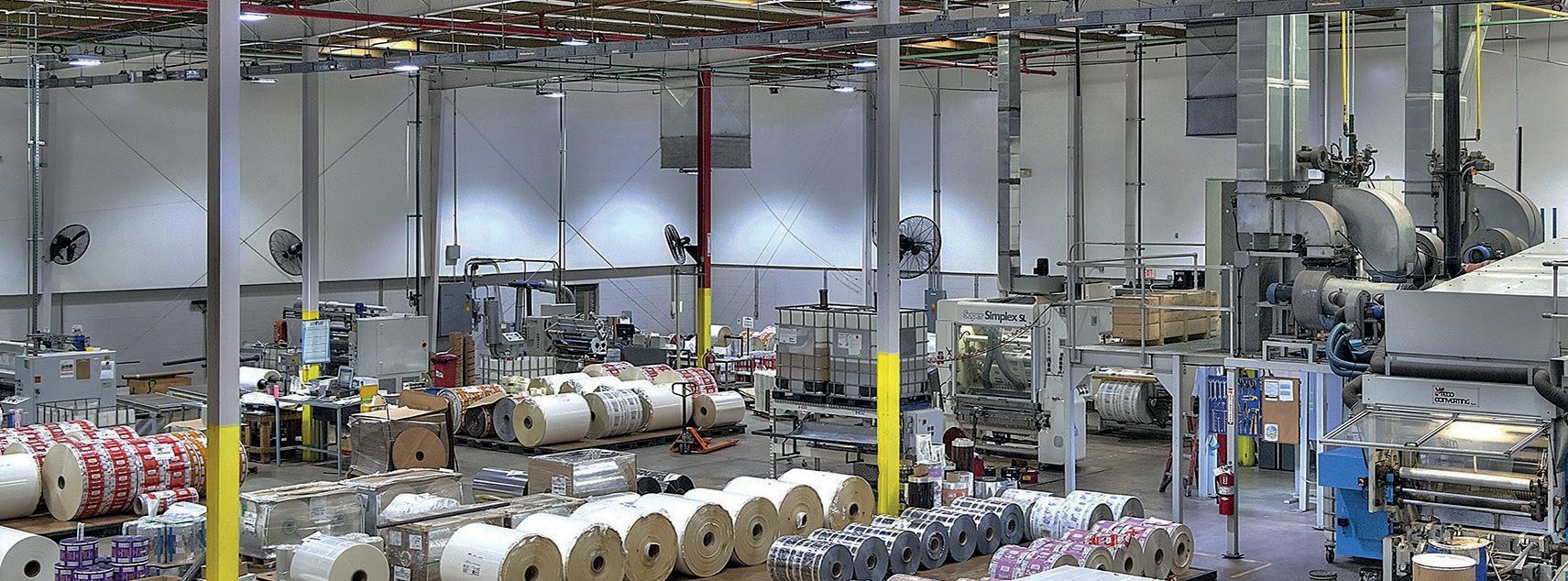
foodchainmagazine.com 61 Poly Print
BELLY FULL AMBITION OF
The Biscuit Belly brand is steadily expanding, spreading southern charm everywhere it goes
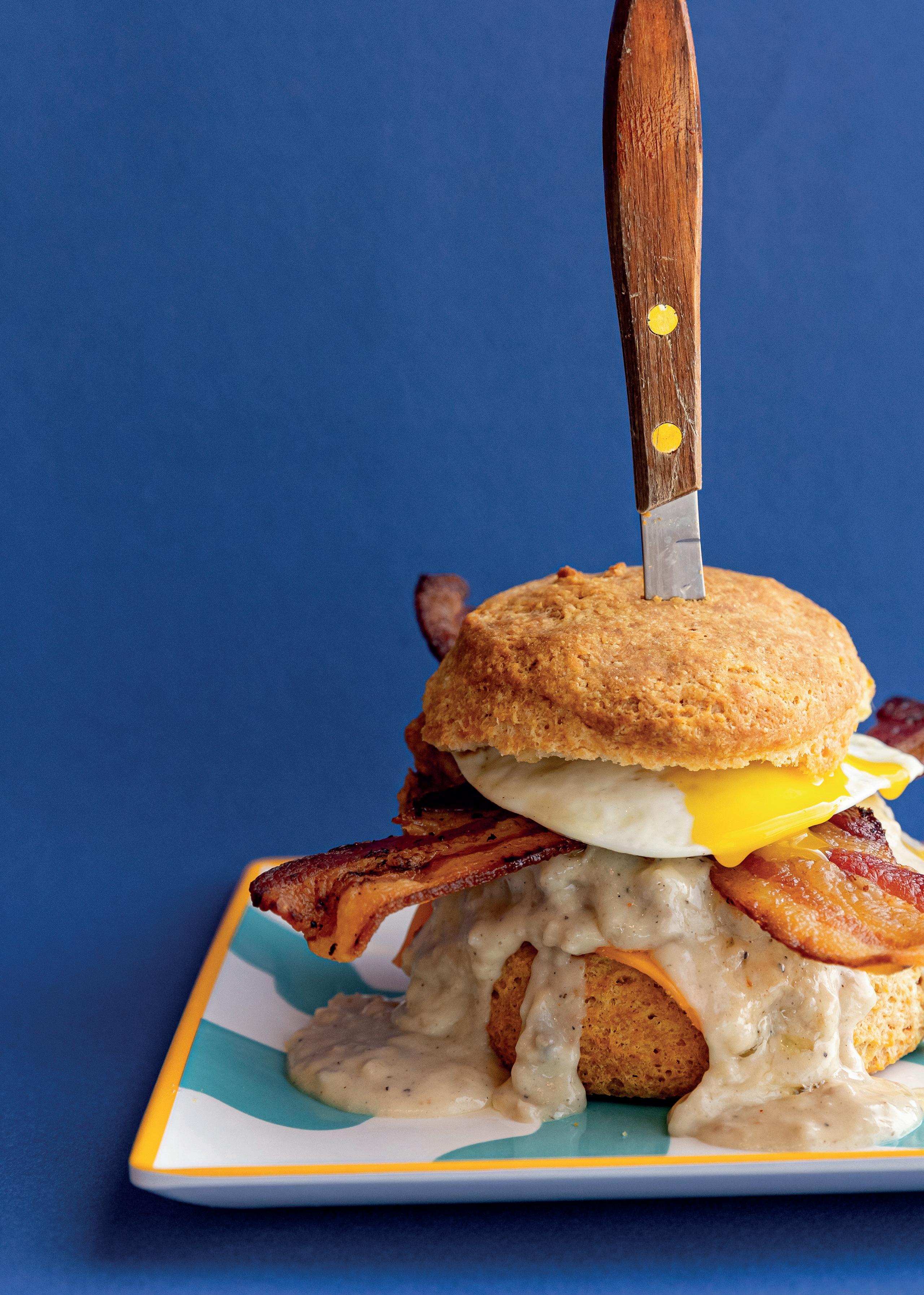
62
The Biscuit Belly brand embodies the spirit of authentic, southern hospitality in many ways, but not only in the literal forms of its working culture or restaurant’s menu. The brand name cooks up the image of a warm welcome that’s complimented by relaxed, yet attentive service. A friendly and familiar face, behind which a fast-paced and fiery kitchen expertly prepares food for the soul – which also serves as the perfect visual metaphor for the company’s operations and fastidious growth. Although still in its infancy, Biscuit Belly is quickly picking up momentum in the world of fast-casual restaurants.
Comfort food
Chad Coulter, CEO and Founder, and his wife, Lauren, gave up their careers as pharmacists in hope of scratching their entrepreneurial itch. They opened the door to their first restaurant venture in 2014, born from a painting and drinking concept conceived in 2011. As Chad details, the couple had benefitted from a chain reaction of success: “We started off with a concept in which you attend a class, with a painting teacher, and learn how to paint something relatively basic on a small canvas, ultimately whilst socializing and drinking with the group. With the success and sales volume of wine we were seeing, we saw an opportunity in a city that was almost exclusively craft bourbon and beer. LouVino, a small-plates restaurant and wine bar – with around 50 to 60 wines by the glass– was born. LouVino was extremely successful and popular and grew into five locations across three states, but it was missing a certain element.

foodchainmagazine.com 63 Biscuit Belly

64
“It isn’t a particularly scalable model and after five months of opening the first location, our executive chef, Tavis Rockwell, and I, started toying around with the idea of a biscuit restaurant,” he continues. “Fast forward to 2018 and we committed to the concept and started working on all of the start-up elements. Tavis’ knowledge and culinary skills were integral to the design of the menu and we worked with a couple of branding agencies. Then, to back it all up, Lauren and I were introduced to Chuck Schnatter, our sole partner – Chuck’s brother John Schnatter was the founder of Papa Johns, and Chuck worked in the brand before it even had the name Papa Johns. He has seen real growth and is preventing us from making bad decisions. Our first unit opened the following year and by the year’s end, we had a second in the same city.”
Today, the established brand of Biscuit Belly presents itself as a fun, family-friendly alternative for those who are tired of oldstyle American breakfast restaurants. It offers a contemporary, southern twist on traditional menus, revolving around gourmet biscuit sandwiches. The company aims to offer its customers an elevated take on hospitality, as Chad explains: “It’s a fastcasual breakfast/brunch concept. People stand in line to order at the counter but after that it’s pretty much a full-service model. We run the food, and drinks and bus the tables, so there are more service touch points than in your average fast-casual. We like to have a good time and try to reflect our cheery atmosphere in our bright colors and upbeat music. We select staff that fit into our culture and want to be happy and smile while they provide their excellent customer service.
“In lieu of the traditional egg, bacon and cheese biscuit sandwiches, we’re offering heavy, fried southern soul food.
The likes of fried chicken with gravy and bacon or sweet pepper jelly with goat cheese. They aren’t easy to eat while you’re walking down the street, it’s definitely a ‘knife and fork’ scenario. Besides our sandwiches and ‘openfaced biscuits,’ we run a range of other breakfast favorites, along with a full barista coffee selection and a list of breakfast cocktails. It’s all very much comfort food, southern-based from a flavor and heartiness point-of-view, to fill both your belly and soul.”
The business had to adapt its original model when the pandemic hit; it paused the process of acquiring several new leases and made the call to enter the home-delivery market. This is something that Chad had previously been completely against, on the grounds that the format lacks cohesion with the overall concept of Biscuit Belly. As he states: “We would never have done it, if it wasn’t for the pandemic, but from a sales perspective we didn’t have a choice. We were holding on to the experiential element of the food, we wanted it to be served hot and fresh straight to your table – however, to this day our online-ordering income makes up around 30 percent of our sales every week. We’re now investing more into our digital side to accommodate it.”
Thriving franchise
As restrictions were lifted, Biscuit Belly continued its endeavor to be a widely recognized brand within the restaurant industry. In October 2020, it made the necessary preparations to start franchising and in 2021, signed three major
“ “
foodchainmagazine.com 65 Biscuit Belly
...to this day our online-ordering income makes up around 30 percent of our sales every week. We’re now investing more into our digital side to accommodate it “ “

66
deals worth 15 locations across four different states. “Our unit economics were very enticing for potential franchise brands – everyone we have brought into the brand is experienced with multi-unit franchises such as KFC and Five Guys,” Chad says. “For now, we are filling the pipeline with people that are like-minded, fit in with the culture and can be patient with a couple of growing pains here and there.” We are also investing in people that can help us grow to the next level. We are extremely topheavy at our Support Center but we know it is needed and has already paid off huge dividends in our preparedness.
one in Raleigh, North Carolina and hopefully another three in Georgia. We also have interest in Charlotte, North Carolina, Florida and several other Midwest and Southern states. Our goal by the end of the year is a total of 15 to 18 units, more than doubling our size in the space of 12 months.”
In creating a wonderful place for employees to work and customers to eat, Biscuit Belly is directly increasing the appeal to potential-franchisees too. As Chad concludes: “We have a very strong value proposition in the unit economics, hours of operation and number of employees. Hiring and retaining staff is better than most in the restaurant industry, particularly with the more sociable hours of seven am until two pm and in such a thriving atmosphere.” ■
“Right now, we have six restaurants open –four corporate and two franchise locations. The two franchised units are in Lexington, Kentucky and the other in Acworth, Georgia. Then going forward into 2023, we will have two more units open in Lexington, two in Alabama (Huntsville and Hoover), another in Chesapeake, Virginia, www.biscuitbelly.com
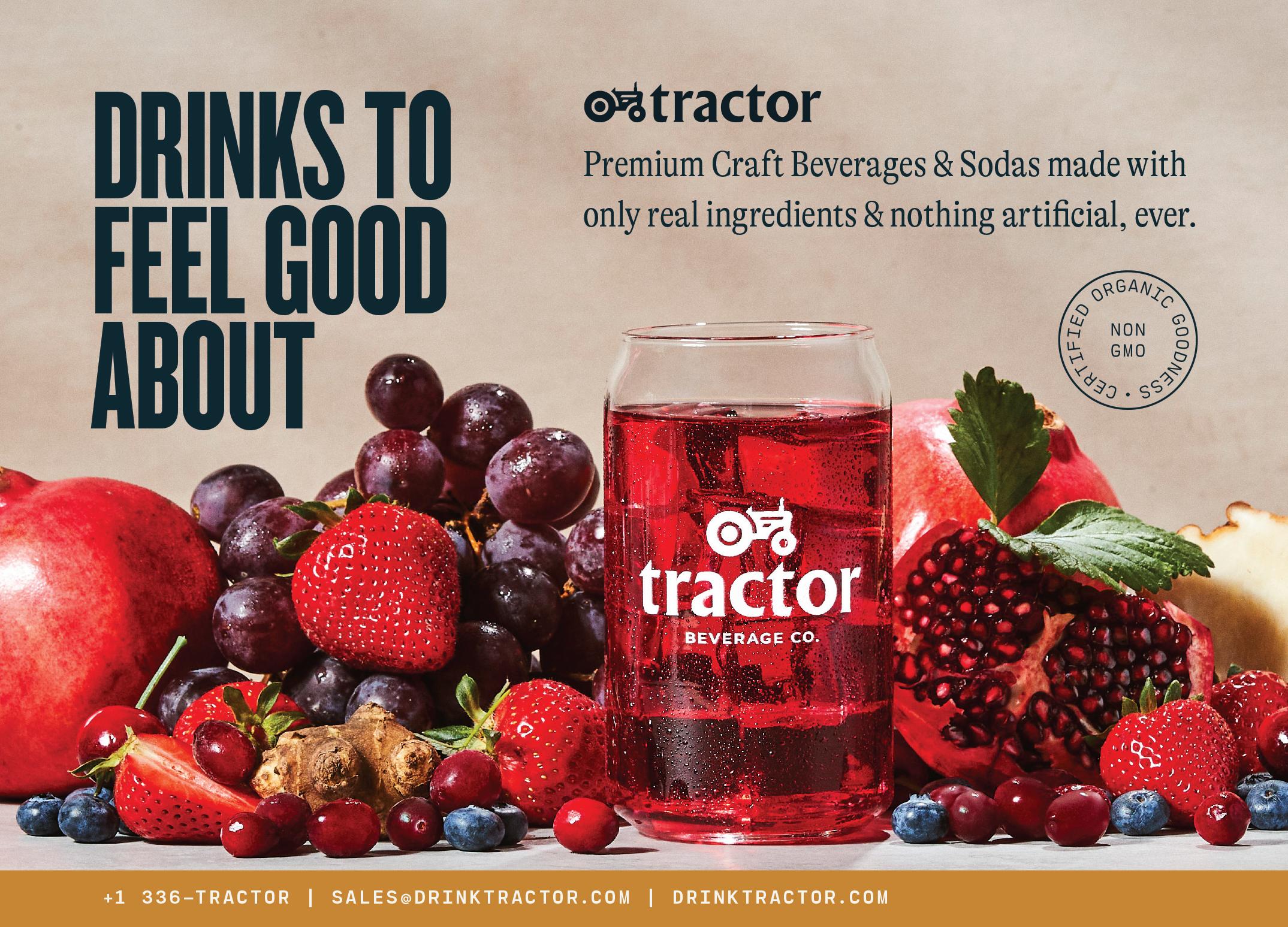
foodchainmagazine.com 67 Biscuit Belly
TASTE THE DIFFERENCE
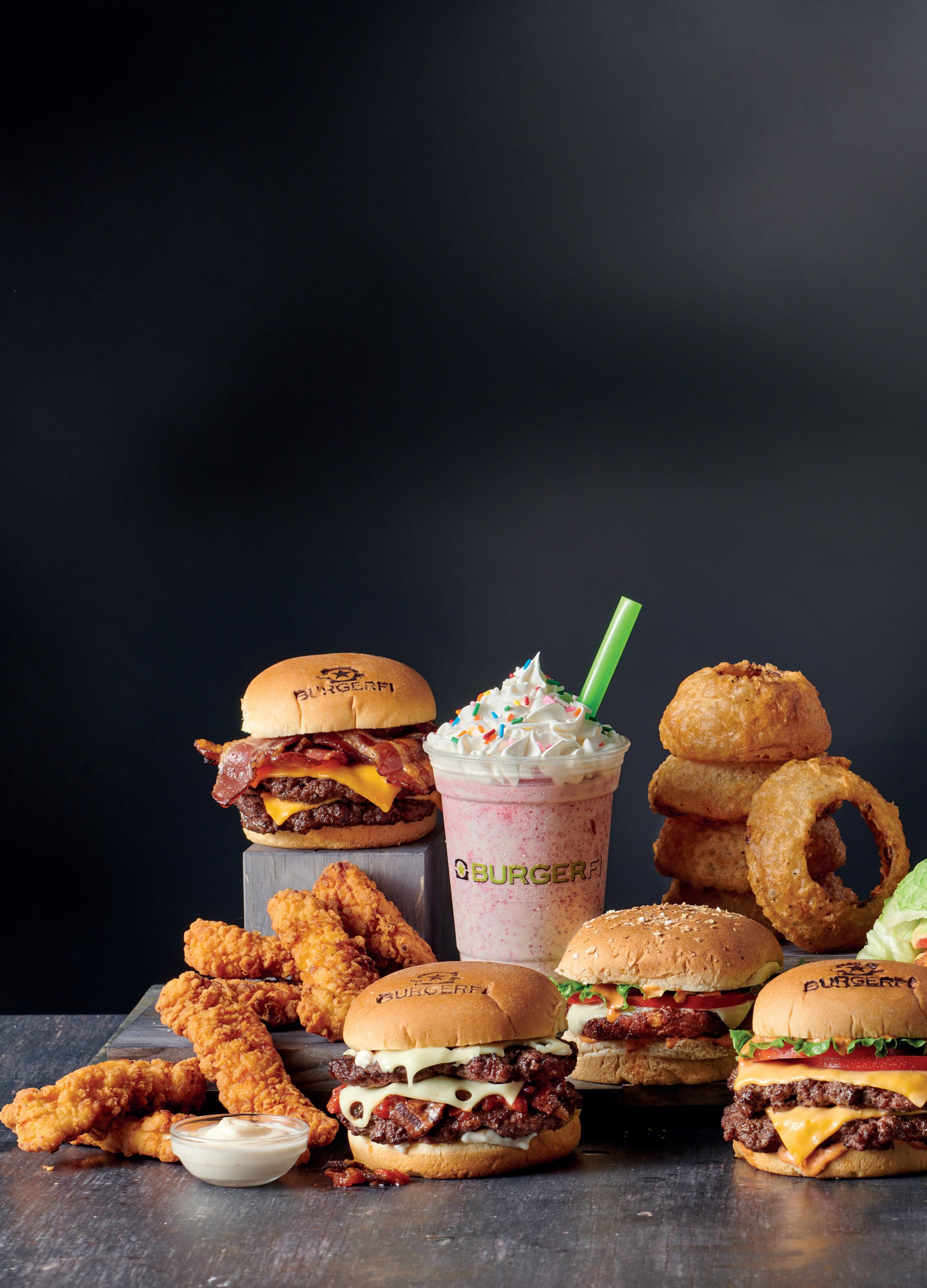
Try something spectacular – step inside and savor one of America’s leading burger joints
68
The last bite is the best bite. By the time you reach it, you have explored all the complexity of flavor and texture of a burger – the soft palatable squeeze of a bun pressing in on the ingredients that it so elegantly encases; the crunchy freshness of a humble lettuce leaf, and the juice of a ripely-picked tomato that bleeds through the greenery above it; the sticky, almost molten flow of American cheese; and then, finally, the succulent showstopper: the burger itself.
It is the reason you walked in, after all. Warming, filling, delectable. As it comes into contact with the other ingredients it becomes all these things and more, metamorphosing with each bite, inviting you to discern the intricate melody of its various tasting notes.

foodchainmagazine.com 69 BurgerFi
This time with crunch; this time with sweet relish; and this time with feeling. At the forefront of experiences like these is BurgerFi. Founded in 2011 by a team of gourmet chefs dedicated to serving a high-quality and always fresh fast casual burger product, the original location in Lauderdale-by-theSea, Florida has since been dwarfed by 100 plus stores across the US.
Now one of the leading brands in the fast casual scene, BurgerFi prides itself on using only the best ingredients. That means 100 percent American Angus beef, which is strictly free from steroids, antibiotics, growth hormones, chemicals, and additives.
Indeed, this is promised through the chain’s ‘Never-Ever’ guarantee, which ensures that guests need not worry about the origins of the ingredients… well, ever. ‘Go ahead,’ BurgerFi seems to be saying. ‘Taste the difference.’
Fresh and flavorsome
Ingredients come in fresh every day and are hand-washed, chopped, and prepared in-house. Fries are freshcut – never coming from frozen – and are first blanched before being fried twice to add a golden crunch. Guests can, moreover, opt for Cajun, urban, and truffle style fries, while also being able to top these with bacon or cheddar cheese sauce. The famous BurgerFi jumbo onion rings are battered by hand and made-to-order, guaranteeing a delicious experience each time.
Evidently, the chef-driven approach that got the company off the ground in Lauderdale-by-the-Sea has been deeply instilled and cultivated across the rest of the brand’s locations – and that strategy has paid off.
BurgerFi was named Best Fast Casual Restaurant in USA Today’s 10Best 2022 Readers’ Choice Awards for the second year running and ranked as
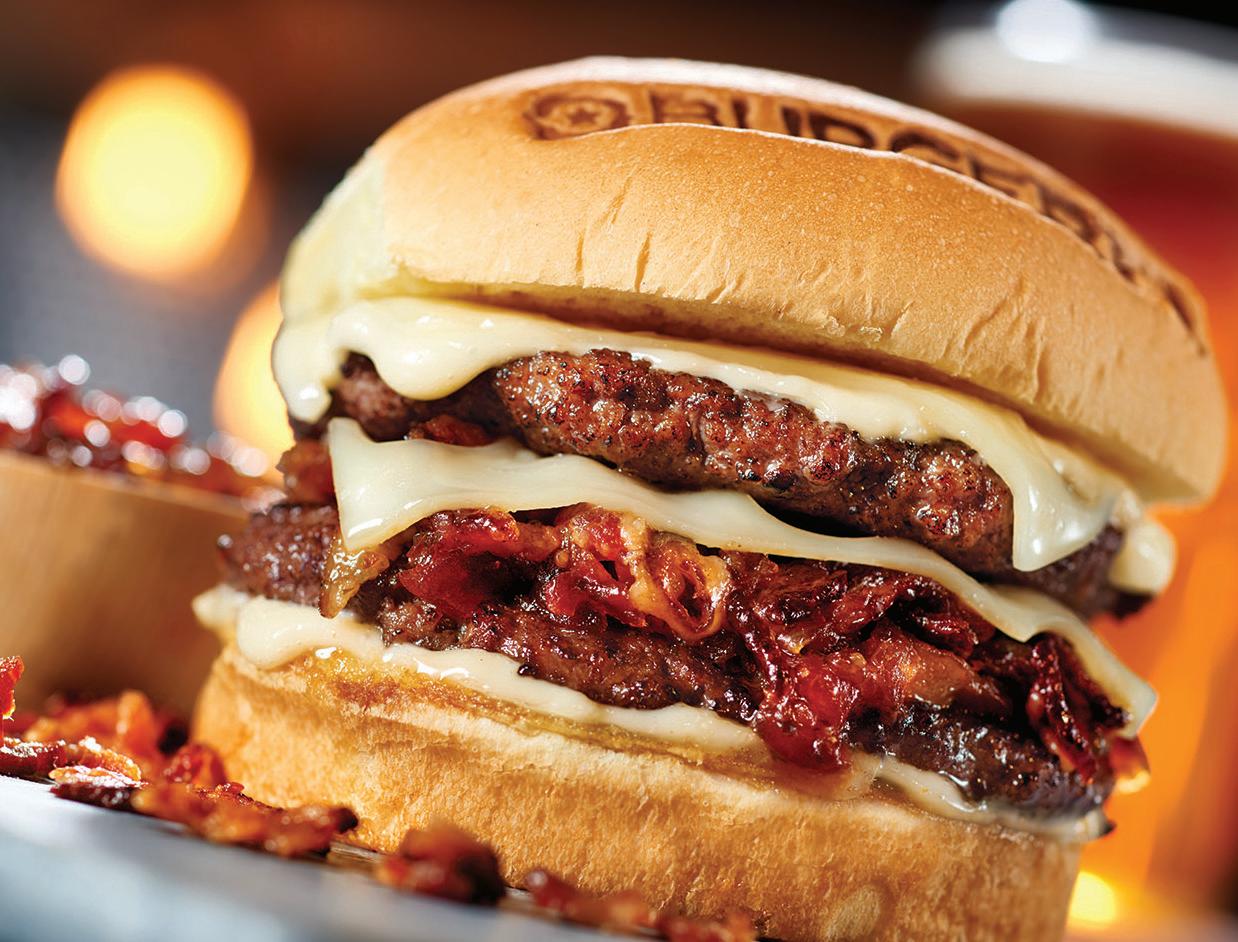
Hughes
We congratulate BurgerFi on its digital-forward approach to creating extraordinary experiences. Hughes® simplifies the complexity of a great customer and employee experience, providing a complete portfolio of managed services. We are excited to work with the BurgerFi team on multiple technologies, including digital signage and network services to build a robust omnichannel experience.

Hughes is a globally managed service provider. Our 50 years of experience in connectivity and
communication helps you thrive, regardless of what the future may hold.
As an experienced managed service provider, Hughes accelerates your ability to deliver an exceptional customer and employee experience with our robust suite of managed services. Backed by over half a century of technology innovation, Hughes is the partner to support your networking, digital signage, and cybersecurity needs. Let our team of experts manage the technology, so you can focus on running your business. For more information, please visit hughes.com/msp.
70 BurgerFi

“ “
the highest burger restaurant on the list. Other accolades include: QSR Magazine’s Breakout Brand of 2020, Fast Casual’s 2021 Number One Brand of the Year, and BurgerFi was recognized as having ‘A-Grade Angus Beef’ for the third consecutive year by Consumer Reports in 2021.
dessert,” says Patrick Renna, President at BurgerFi, who has been with the company since 2020. “The BurgerFi Sauce recipe alone uses more than 12 fresh ingredients and was crafted with flavors to perfectly complement our juicy and all-natural cheeseburger.

“ “
“While we are best known for our delicious, all-natural burgers, our menu also includes high-quality wagyu beef; antibiotic and cage-free chicken; fresh, hand-cut fries; and beer-battered onion rings, as well as custard shakes and concretes for
“Other favorites include the VegeFi (our own gourmet spin on a veggie burger), which is prepared in-house, wagyu beef hot dogs with all the toppings, and a glass of local craft beer,” he adds. “We are 100 percent committed to serving fresh, allnatural food of the highest quality. In fact, we utilize certified American Black Angus beef from the top ranches in the country. This means that the cattle we source our burgers from are free range and raised on a vegetarian diet. Moreover, we source
72
We are 100 percent committed to serving fresh, all-natural food of the highest quality
all-natural chicken that is free of hormones and antibiotics and fed a purely vegetarian diet of 100 percent American-grown grains at Springer Mountain Farm. The chickens are raised in climate-controlled and humanecertified homes to produce the freshest chicken from farm to tray.”
Exceeding expectations
Recent Limited Time Offers (LTOs) include the Juicy Lucy, which is made with BurgerFi’s awardwinning Angus beef. “We have a lot of exciting offerings that we are going to be testing out in the remainder of the year, and preparing for LTO offerings we will be showcasing in 2023,” reveals Patrick. “So, keep an eye out on our social media channels to make sure you do not miss the announcements!”
Yet, it is not just the sourcing of ingredients that Patrick sees as BurgerFi’s unique selling point. As he is quick to assert, the
The Ruby Company
The Ruby Company, a key supplier to the BurgerFi system, is a national produce, distribution, and supply company that builds partnerships between the farm and commercial purchasers to deliver the best products consistently and with integrity. We lead with a commitment to quality and service that goes beyond the typical. That approach has led to meaningful relationships with BurgerFi and others alike. BurgerFi is a concept highly focused on delivering quality product to the end user, and so are we. You cannot have burgers without fries (and onion rings), and it is our job to ensure the supply chains remain intact so that BurgerFi can continue to service their customers, no matter what. Our unwavering dedication will not only maintain course, but it will further develop and strengthen as the business continues to evolve. It is not just about working hard; everyone in the foodservice does that. It’s about going out of our way to execute, no matter how tough the challenge.

foodchainmagazine.com 73 BurgerFi
Springer Mountain Farms
Springer Mountain Farms is a proud partner of BurgerFi. Producing the unique, all-natural FI’ED Chicken sandwiches is no easy task and demands top quality chicken. Springer Mountain Farms is able to meet BurgerFi’s strict requirements by providing our chickens with a quality life and healthy diet. We take extra steps to ensure the health and welfare of our chicken, which is why
our practices are American Humane Certified™ and are never administered antibiotics, hormones, or steroids.
Creating the best tasting, top quality chicken is no easy task, but Springer Mountain Farms has spent the last 25 years perfecting our practices with the industry’s best minds and technology. That is why BurgerFi trusts Springer Mountain Farms to be their exclusive chicken supplier.
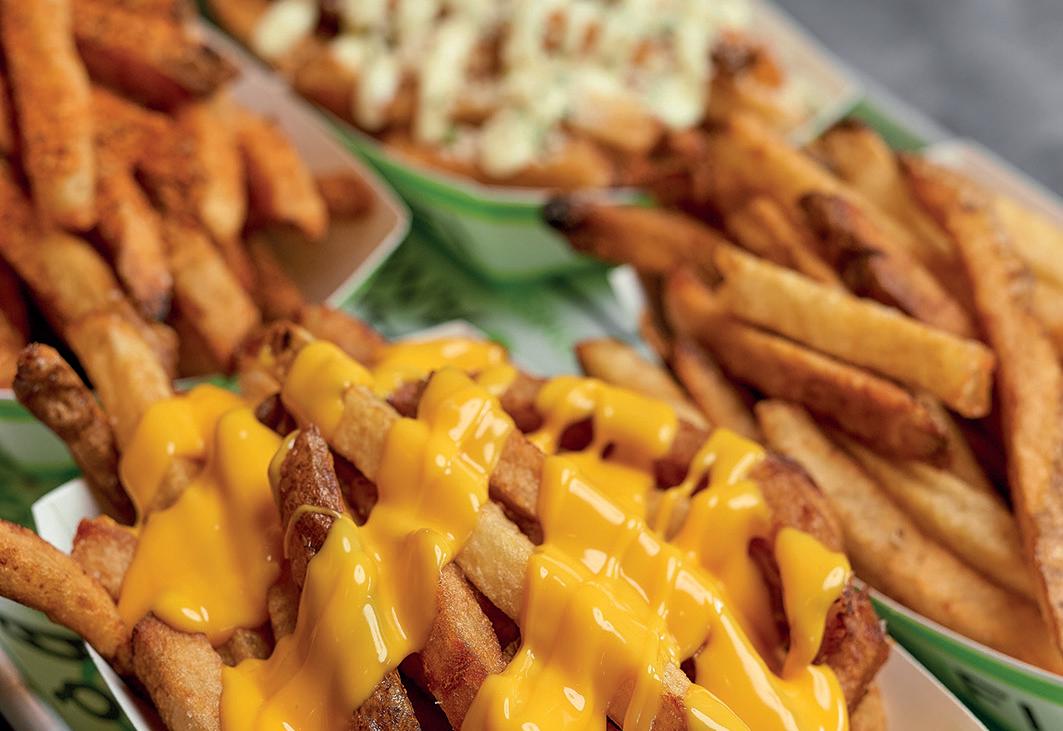

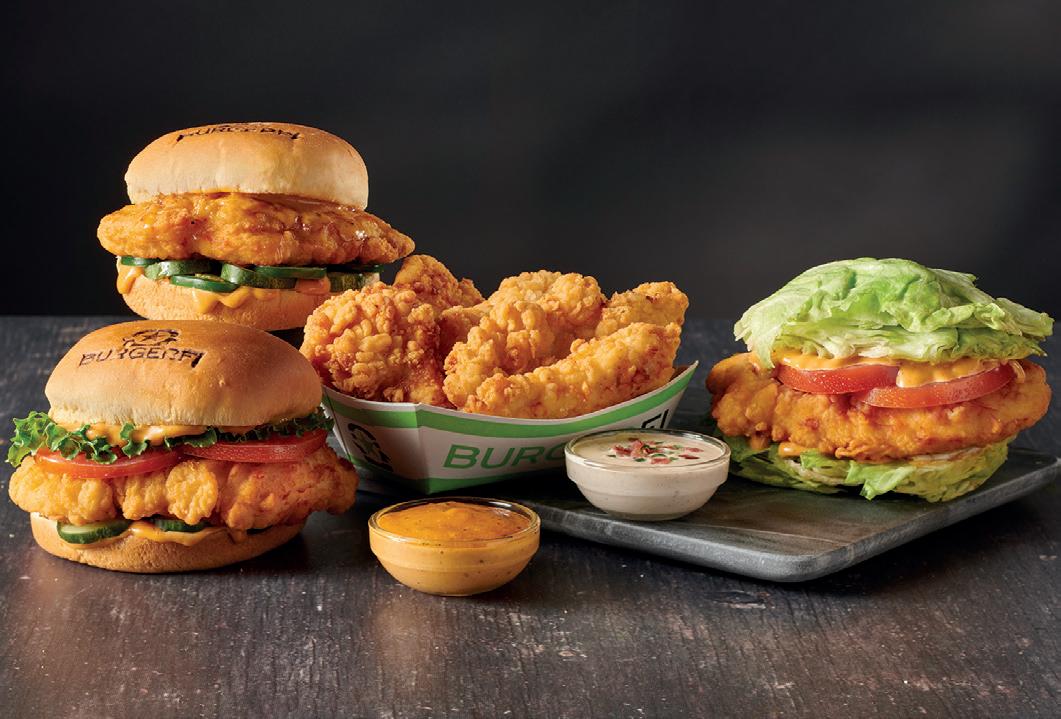
74
chain also excels in the customer service department. “Our employees will always be the most important part of BurgerFi,” he admits. “Without them, it would simply be impossible to deliver a better burger experience to our guests. Even before the pandemic, we have looked for opportunities to incorporate innovative technologies that can help our staff be more efficient. Most recently, for example, we have integrated self-ordering kiosks, allowing our employees to focus on a quality guest experience and help decrease ticket times.”
A multi-brand platform

Minor adaptions such as self-ordering kiosks brought about major returns on investment during the pandemic, the brusque and unrelenting arrival of which certainly seemed to shift the way the entire food industry operated. Despite this, Patrick comments that, as a brand, BurgerFi prides itself on an incredible ability to pivot and incorporate innovative technologies to help address challenges as they arise.
“In 2020, for instance, we saw that delivery and convenience were just as important to our guests as the in-restaurant dining experience,” reveals Patrick. “That is why we have jumped on trends such as contactless ordering via digital kiosks and guaranteed lowest delivery fees through the BurgerFi mobile application in order to meet guest expectations. Actively listening to guest feedback, as well as looking at qualitative data and insights, are key to ensuring a well-rounded and positive guest experience. In doing so, we will be able to continue attracting new and loyal BurgerFi fans.
“In the end, guests appreciate convenience, and our digital technology solutions are focused on streamlining the ordering transaction so that our diners can focus on spending time with friends and family as they eat fresh, high-quality, and delicious food,” he adds. “We are actively
investing in enhancing convenience for both the guest and the delivery driver. Ensuring the order is made available when we promise it and providing ways for guests to order in whatever they wish is at the top of our agenda.
“From a technology perspective, this will mean focusing on the user,” Patrick details. “The challenge there, then, is to make all our processes as simple as possible. The user may be the employee, guest, or delivery driver and they may want to eat in the restaurant, at home, or on the road. These variables must be considered as we investigate streamlining our business further.”
Also included in Inc. Magazine’s Fastest Growing Private Companies List, BurgerFi has evidenced an ebullience for expansion and recently acquired Anthony’s Coal Fired Pizza & Wings (Anthony’s). The 60-strong chain is spread across eight states and has been built on founder Anthony Bruno’s passion for pizza since 2002.
foodchainmagazine.com 75 BurgerFi
Margherita, pepperoni, broccoli rabe and sausage, ricotta cheese white pizza, eggplant and pecorino – even meatballs and sweet peppers baked on top of fresh, handstretched dough. All these options and more – from toasted sandwiches and rigatoni pasta to roast chicken wings and tiramisu – can be expected at an Anthony’s establishment.
“The Anthony’s acquisition marks the first step in our long-term inorganic growth strategy to build a premium multi-brand platform,” reveals Patrick. “It represents a fantastic complement to our brand, and we are well-positioned to strategically grow Anthony’s as it fits in with BurgerFi’s focus on high-quality restaurants. Both brands sit together very nicely as geographically overlapped and elevated concepts that our guests love. Anthony’s and BurgerFi have mutual strengths that we can utilize and capitalize.”


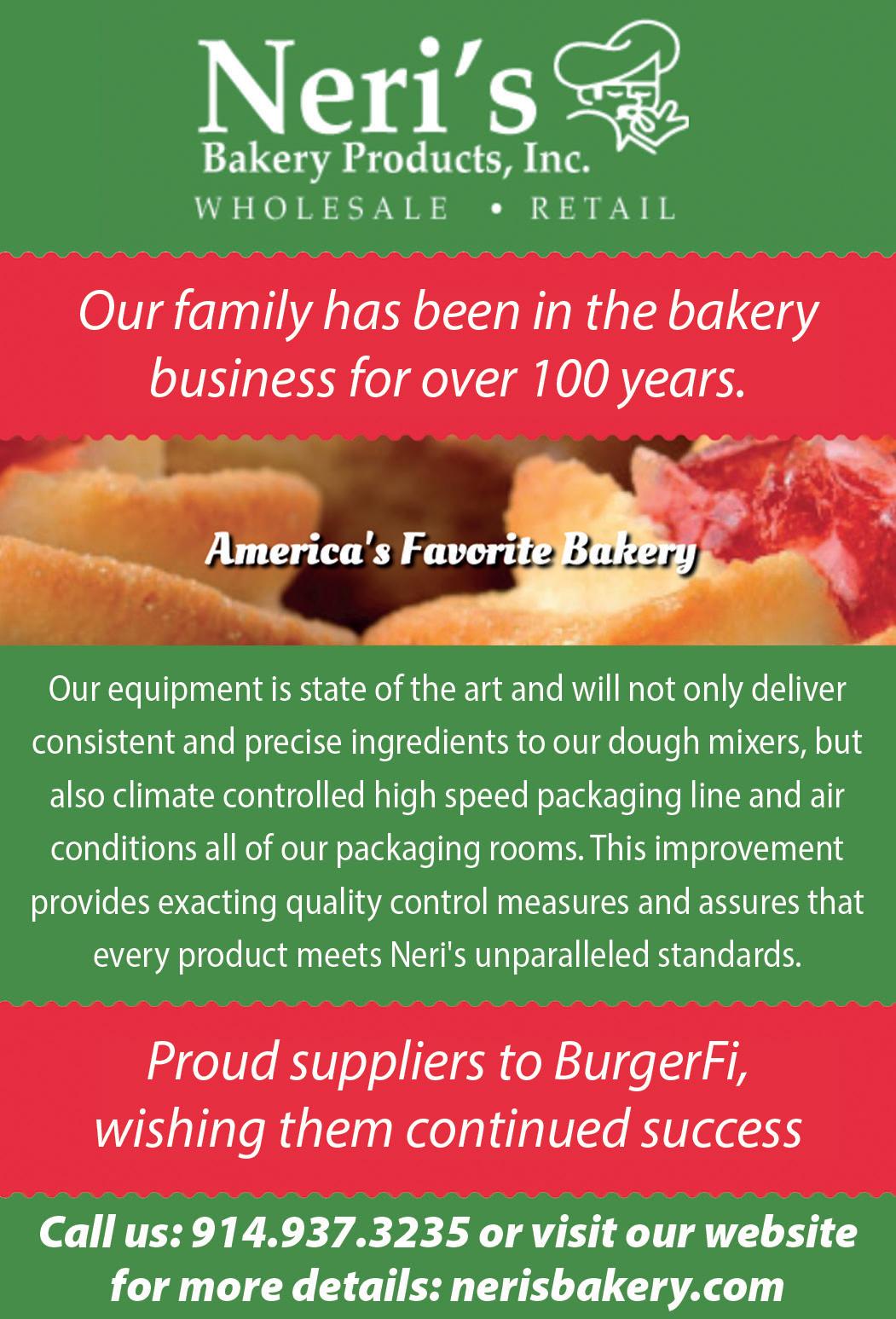
76
Utilize and capitalize. It is a robust, triedand-tested strategy; and BurgerFi intends to lead from the front with it. Through the rest of the year, the chain intends to open a number of new restaurants, most of which will be franchised, as well as continuing the expansion at more than 30 Gopuff locations.
Gopuff, the go-to platform for immediate delivery of customers’ everyday needs, will be delivering freshly made BurgerFi burgers and fries in more than 12 cities, including Miami, New York City, and Philadelphia, to expand BurgerFi’s national presence.
Stewart Sutherland
Stewart Sutherland has been supporting BurgerFi’s growth for many years. Together, we are innovating to meet our customers evolving expectations in a demanding marketplace. As a family and women owned/operated business, it’s important that our products and our values deliver for our clients.
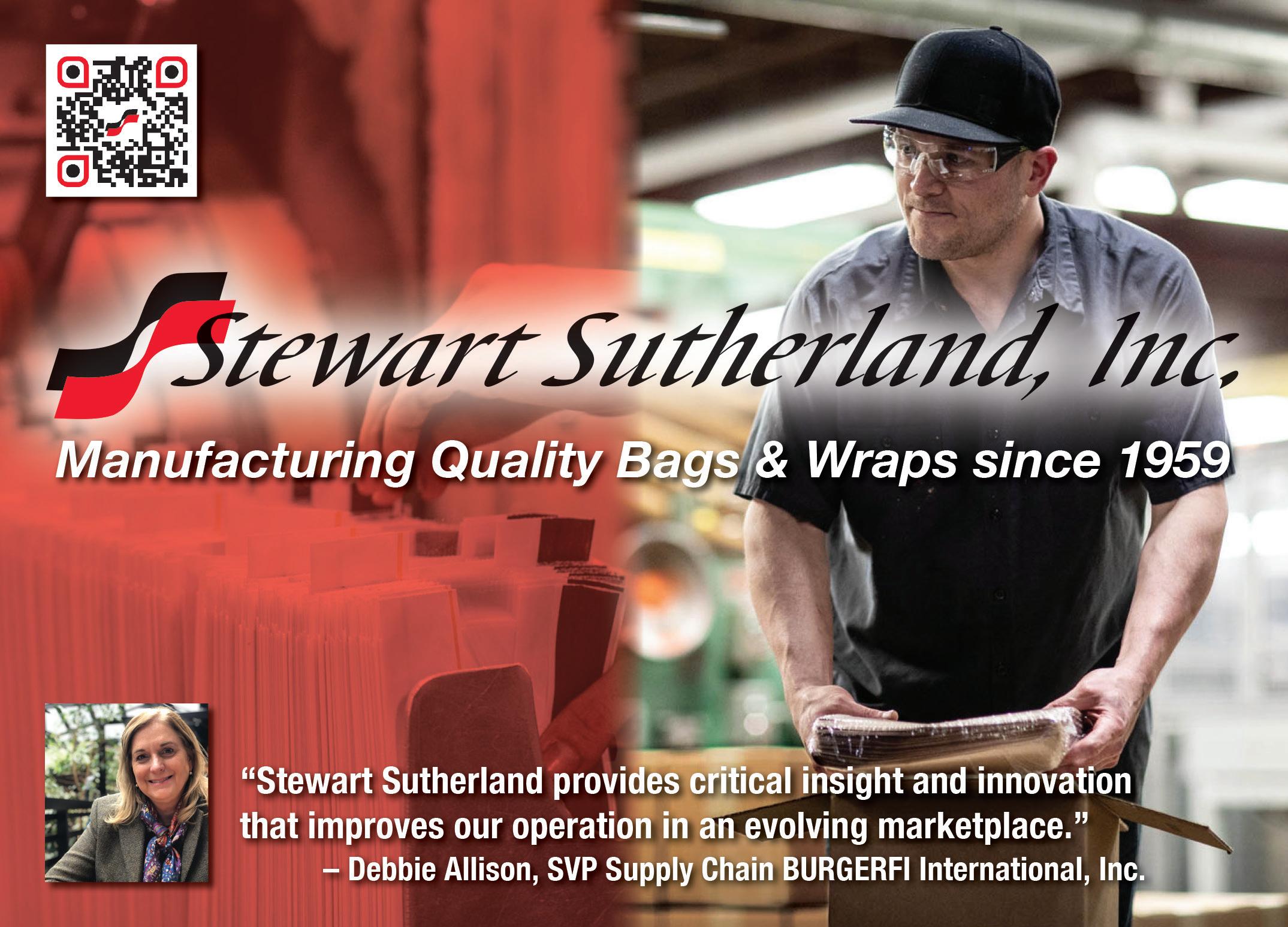
“Growth is our ultimate goal,” concludes Patrick. “In five years, I expect we will have expanded both the number of brick-andmortar stores as well as our delivery options for our guests. Going forward, we will tap more and more into our franchisees, elevating their product to the next level. As a company, we are very excited about the future and cannot wait to see what it has in store for us.” ■
www.burgerfi.com
We support our people and our community. This has built the foundation for the consistency our clients demand. Converting paper into foodservice products is what we do. What we value is our service and dedication to our clients and community. Let us show you what our dedication and service can do for you.
foodchainmagazine.com 77 BurgerFi

78
IT’S A WONDERFUL LOAF
Rising up the high street baking scene with Wenzel’s The Bakers – a sweet glimpse into a well-proven business model

The weather is beginning to turn cold, and darkness is creeping further and further into the morning of millions as they hurry to work to break free from the impending rush hour. Orange lights separate this cold morning from others, though, and they spell: Wenzel’s The Bakers (Wenzel’s).
The business behind the characteristic orange façade and the warming smell of freshly baked bread emanating beneath it began in 1975 with just one shop and an on-site bakery. Wenzel’s took things slowly, gradually developing its growing estate of stores. Centralized shops started to grow organically, and in the early 2000s the popular chain pushed out its robust expansion plan. Needless to say, the strategy paid off.
foodchainmagazine.com 79 Wenzel’s The Bakers
Slow expansion turned into rapid progression. Fast forward to 2022, and Wenzel’s now runs 100 shops. What started as one family’s Northwest London sweet dream has firmly become a favorite among clientele living under the NW postcode – and beyond.

Valued team
Wenzel’s and its famous baked goods can be found in stores across Greater London (Mill Hill, Shepherd’s Bush, Kentish Town), Bedfordshire (Luton), Berkshire (Maidenhead, Reading East, Windsor), Buckinghamshire (Aylesbury, Chesham, Denham), Essex (Basildon, Debden, Southend-onSea), Hertfordshire (St Albans, Hemel Hempstead, Rickmansworth), and Surrey (Staines-upon-Thames, Woking).
The mission is simple: offer the best of baking at reasonable prices to a batch of adoring customers. Simple, yes – but no easy feat given the heat of the competition. Fortunately, Wenzel’s rises above the rest with its sharp sense of dedication, insightful approach to innovation, and cordial customer service.
“Passion is a priority at Wenzel’s, and it leads most of our key projects,” begins Karl Spinks, General Manager at Wenzel’s. “Our management team works closely with each other on all projects, which allows us to remain a family business. There are very few
“ “
...the brand has curated a varied menu of almost every kind of baked good imaginable 80
“ “
– if any – borders between the team; we act as one seamless entity. This filters through to all staff in our other departments; product development suggestions and improvement requests are taken on board from every level of the organization.
“The working environment of all team members is very important to us, and we ensure that we have the latest equipment to create the best possible working conditions,” he goes on. “Indeed, we offer excellent career growth for our employees, and the company is a strong advocate for upskilling team members to help them grow as individuals.”
Key suppliers
Wenzel’s also works closely with local charities, food banks, and nearby schools with the aim of making the lives of others just that bit sweeter. Additionally, the business devised a plan to treat long-time celebrity fans to a Wenzel Orange Card. This is an extra special thank you to A-list loyalists for their ongoing public and private support, entitling them to a little slice of heaven whenever they want.
“But we do not stop there,” says Karl. “Looking externally, we rely on some key suppliers to help provide stability and structure. In doing so, we are able to provide the best quality

foodchainmagazine.com 81 Wenzel’s The Bakers
products to our customers. Without these suppliers, we would not be in the position that we are today.”
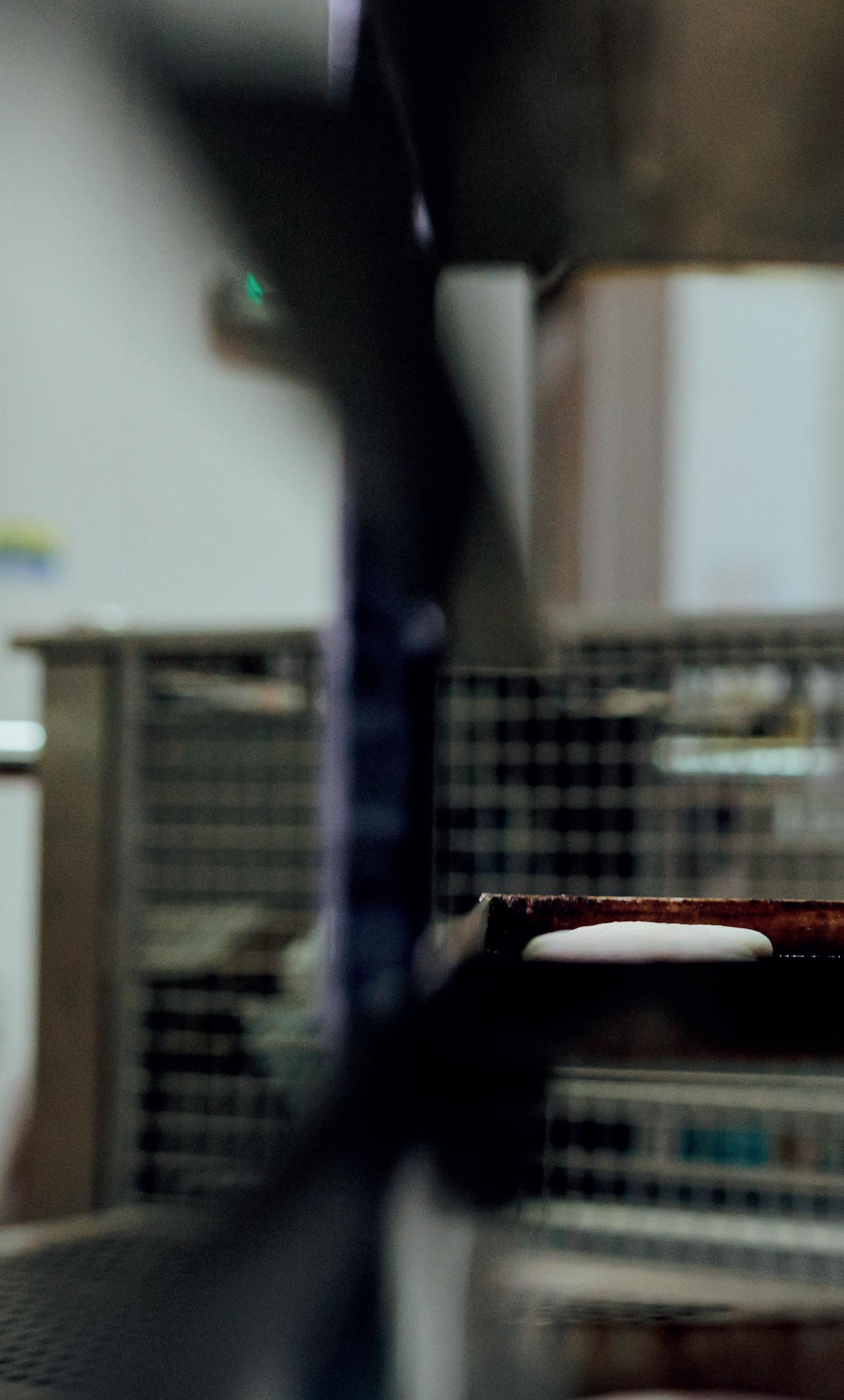


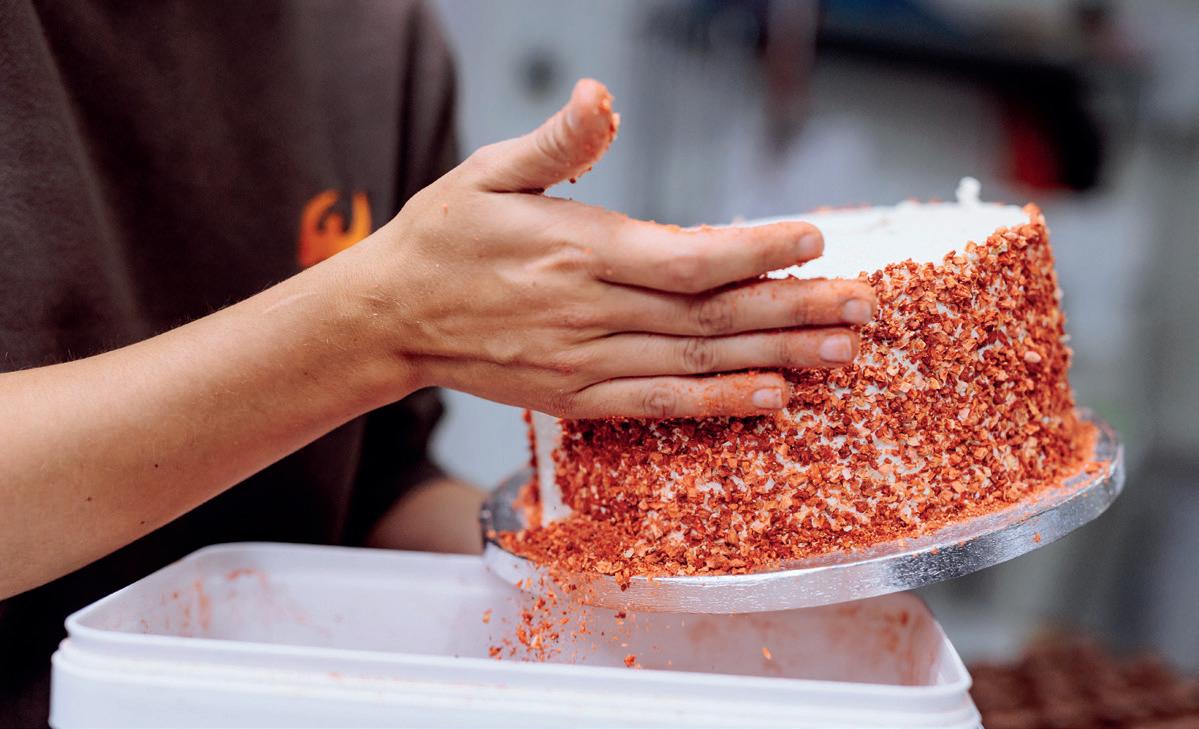
Delicious menu
Using only top-quality ingredients to create fantastically fresh products, the brand has curated a varied menu of almost every kind of baked good imaginable. First, Wenzel’s appears to say, let them eat cake: strawberry, vanilla, and chocolate fondant facies, all topped with a dollop of cream and coated in icing and a chocolate drizzle; fruit cake slices, made from a vanilla sponge which are also available in a vegan variety; and showstopping occasional cakes, including ‘Chocolate Elegance’, ‘Unicorn’, ‘Football Themed’, ‘Salted Caramel Cone’, ‘Oreo Cake’, ‘Fresh Fruit Gateau’, and ‘Photo Celebration’.
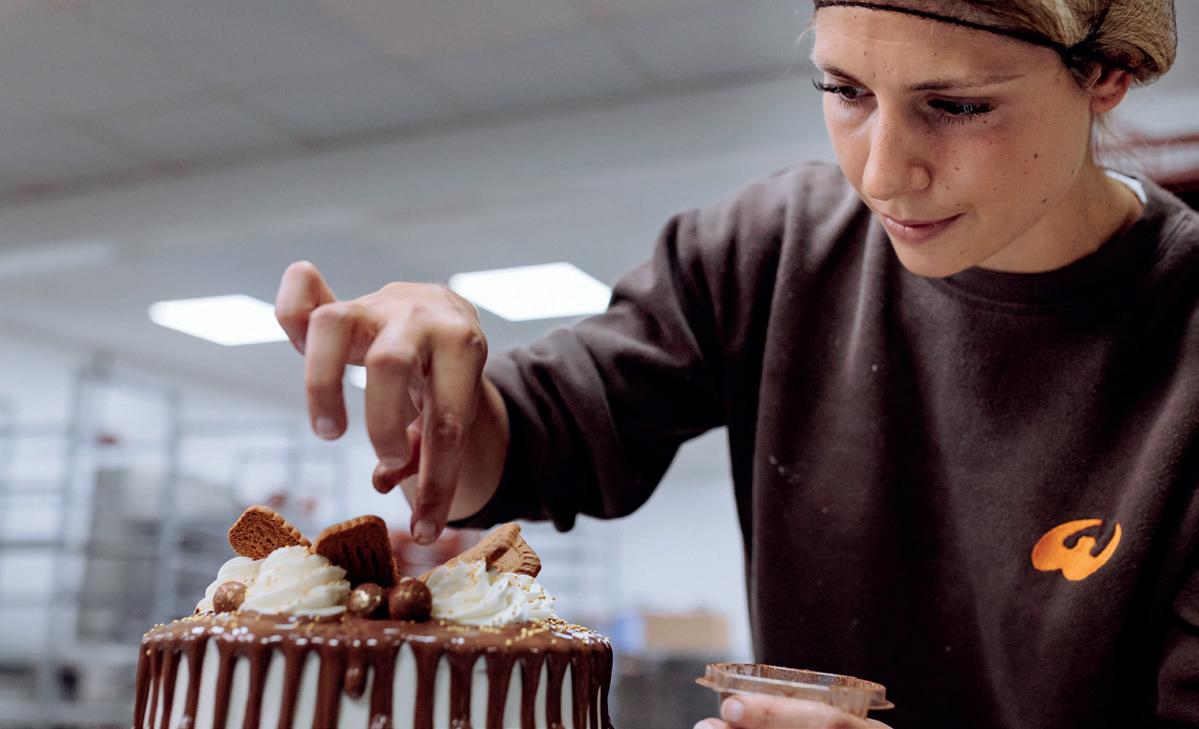
The Bakers 82
Wenzel’s
Second, Wenzel’s encourages customers to savor the savory: fresh loaves, baguettes, and pastries; jalapeño snacks, made with creamy soft cheese, breaded to add a golden crunch, and served with either mayonnaise, yoghurt and mint dip, BBQ sauce, or tomato ketchup; chicken wings and strips; as well as spring rolls, meat and vegan sausage rolls, and pizza slices. Third, groups are not a problem; in fact, they are encouraged with Wenzel’s delicious bridge roll, sandwich, and baguette platters (ranging from chicken and cucumber to egg mayonnaise and cress, plus many more).
“We instill traditional values, quality, and freshness in all our products, while also utilizing the best ingredients available,” details Karl. “This is tied in with our focus on employing a modern approach to business and providing our
“ “ “ “
customers with the latest trends and up-to-date offerings. We pride ourselves on providing something for everyone and have a range that will suit every palette. Complementing our food is an equally delicious variety of drinks: freshly ground coffee, tea, hot chocolate, and many different cold beverages.
“Across the business, moreover, we operate a wide range of locations in a varying degree of environments: retail parks, town centers, shopping malls,
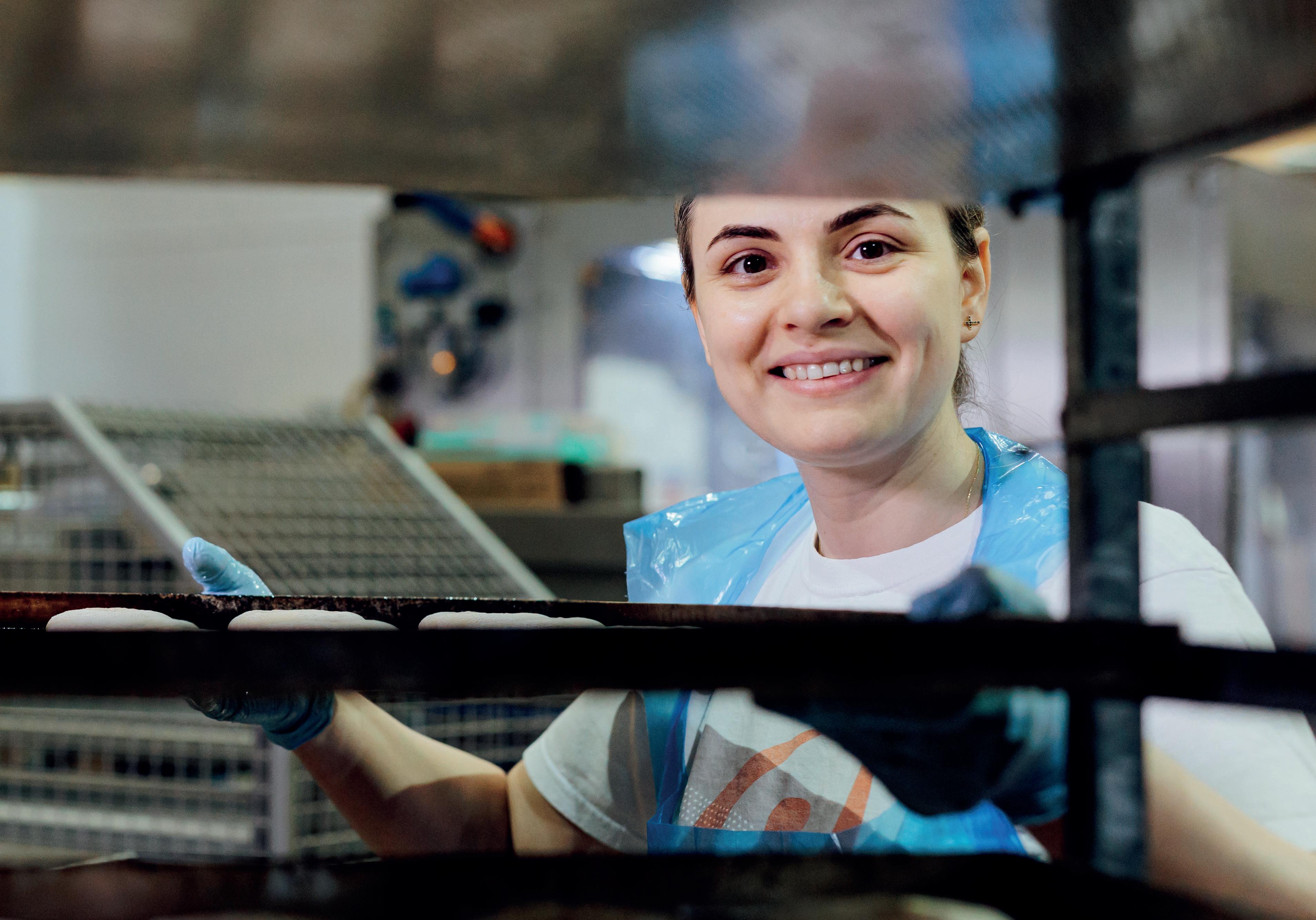
...the new product development team at Wenzel’s has developed an LTO line of Christmas products to elevate the London-based bakery’s market presence
foodchainmagazine.com 83
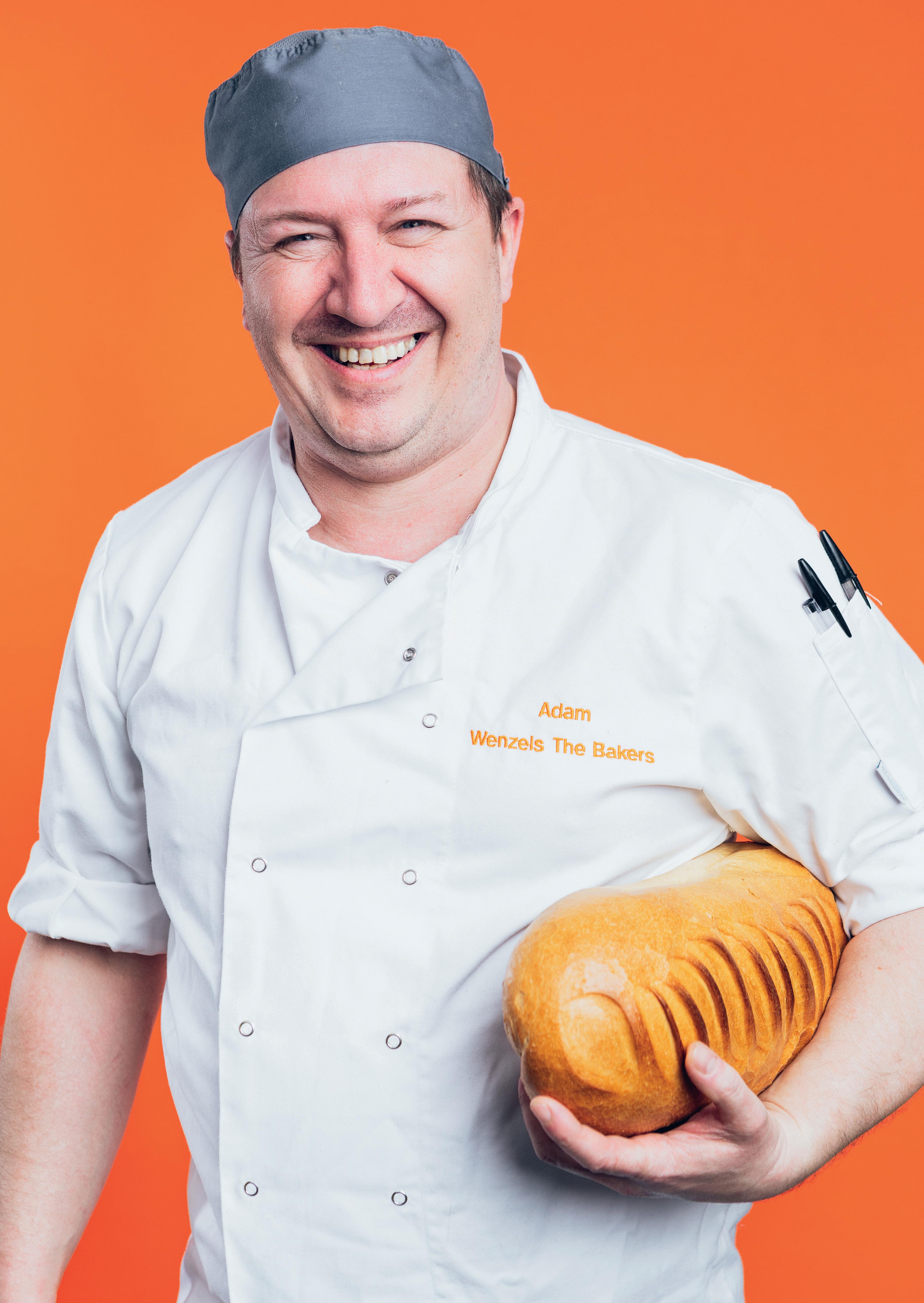
84
The range is going to be truly fantastic “ “ “ “
and tube stations,” he reveals. “Nevertheless, our ethos is the same in every shop location: we want to create warm environments with product placement at the forefront of our store designs. But we go further. Indeed, we provide staff with the best possible working conditions and are in the process of expanding the staff changing and canteen facilities at our headquarters. We have already had a new ventilation system in our 32,000-foot bakery, and plan to add solar panels in 2023 that will provide green energy to cover our usage.”
Customer engagement
Recently, Wenzel’s released gingerbread mummies and spooky themed donuts as a Limited Time Offer (LTO) for Halloween. As Karl tells us, the new product development team at Wenzel’s has developed an LTO line of Christmas products to elevate the London-based bakery’s
market presence. “The range is going to be truly fantastic,” he notes. “It will incorporate all areas of sales and consist of gingerbread coffee, handmade snowmen cupcakes, and seasonal savory hot slices – plus much more! It will draw from customer feedback and social media trends. Indeed, by engaging with our audience in this way, we are able to stay ahead of our competitors and keep our offering fresh and exciting.”
Fresh and exciting – two adjectives that acutely capture Wenzel’s future. Before the end of the year, the chain expects to open a further six stores, venturing into new territories and boroughs. Pushing northwards, Wenzel’s storefronts will be spotted across the Midlands and, back past its primary locus, along the south coast with another 40 stores planned for 2023. ■
www.wenzels.co.uk


foodchainmagazine.com 85 Wenzel’s The Bakers
serve Here to
Roadside service staff are always there for people in their hour of need. We have all breathed a sigh of relief on seeing a sign mapping the way to the next available services. Whether you’re tired, hungry or thirsty, these guardians of the motorway can be relied on, all over the country, around the clock. It’s truly a blessing that companies, such as Roadchef, manage posts across the UK, to provide us with what we need when we’re far away from home.

86
Roadchef; from serving 52 million customers over the counter, to serving over £4 million to customers in need




foodchainmagazine.com 87 Roadchef
Roadchef was founded in 1973, as a joint venture between Lindley Catering Investments and Galleon World Travel, in the form of a single rest stop. This break into the industry has carried the company to the present day, where it holds 30 locations across the UK and has seen its most exciting development, earlier this year. In April, the company was acquired by the asset-managing arm of Macquarie Group, under its European infrastructure fund –a move heralded by Mike Jackson, Director of Supply Chain and Head of Charity: “It’s the biggest news, without a doubt,” Mike opens. “Macquarie is an internationally renowned company.
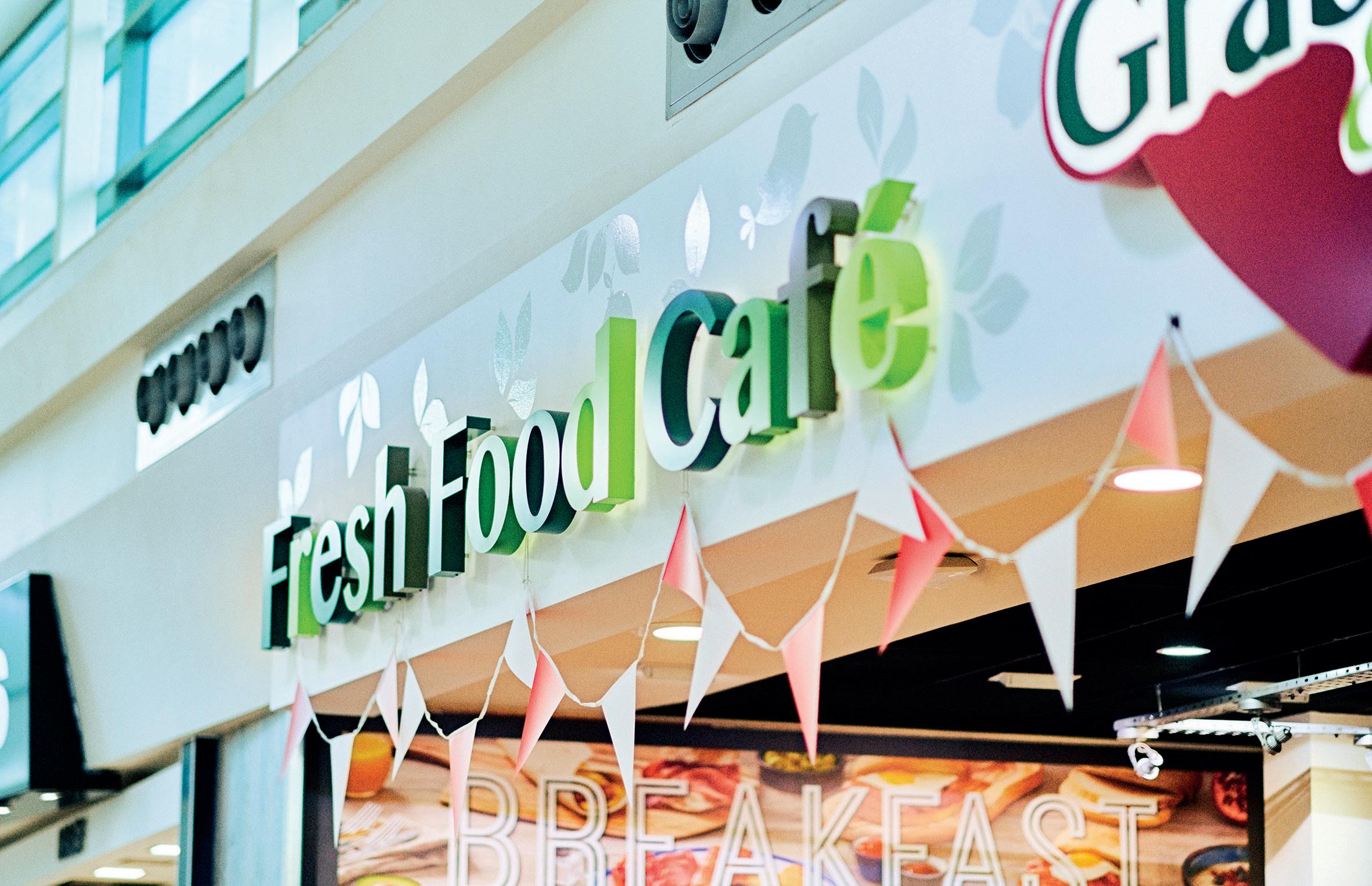
It’s going to make a huge difference to Roadchef’s growth and potential projects. It’s all very exciting.”
Dream team
The takeover swept through as the savior to bring some calm to the second half of a tumultuous period for the industry. Despite Roadchef being listed as the third largest Motorway Service Area (MSA) provider and holding 22 percent market share at the time of sale, the company has felt the squeeze between the pandemic and the war in Ukraine. Mike details, “We were all impacted by Covid personally, as the business was too. It was challenging: maintaining, rebuilding and then growing the company throughout the pandemic, but we pulled together as a team and worked through the last year. We more or less managed to get things back to where they were, until 2022
.
. . It’s going to make a huge difference to Roadchef’s growth and potential projects. It’s all very exciting 88
“ “ “ “
hit and we were faced with another tragedy.” He pauses: “God bless them, our friends in Ukraine. They are still going through it.”
The resultant effects have led to increases in costs throughout the industry, and have combined with the energy crisis and other supply chain challenges. However, Roadchef’s future is bright, as Mike adds: “We are being well-supported by our new owners. Thankfully, this is allowing us to do everything we can to work together with our suppliers, distributors and franchise-partners, and collaboratively, we are managing these new costs.”
Charity partnerships
Throughout Mike’s career with Roadchef, there has been a surge in one of the company’s less obvious sectors – charity work. With Mike standing as the Head of Charity, he marvels at everything the team has achieved in raising millions for a number
Moving Mountains Foods
Moving Mountains Foods is a ground-breaking British company leading the innovation in plant-based meat alternatives into unimagined territory.
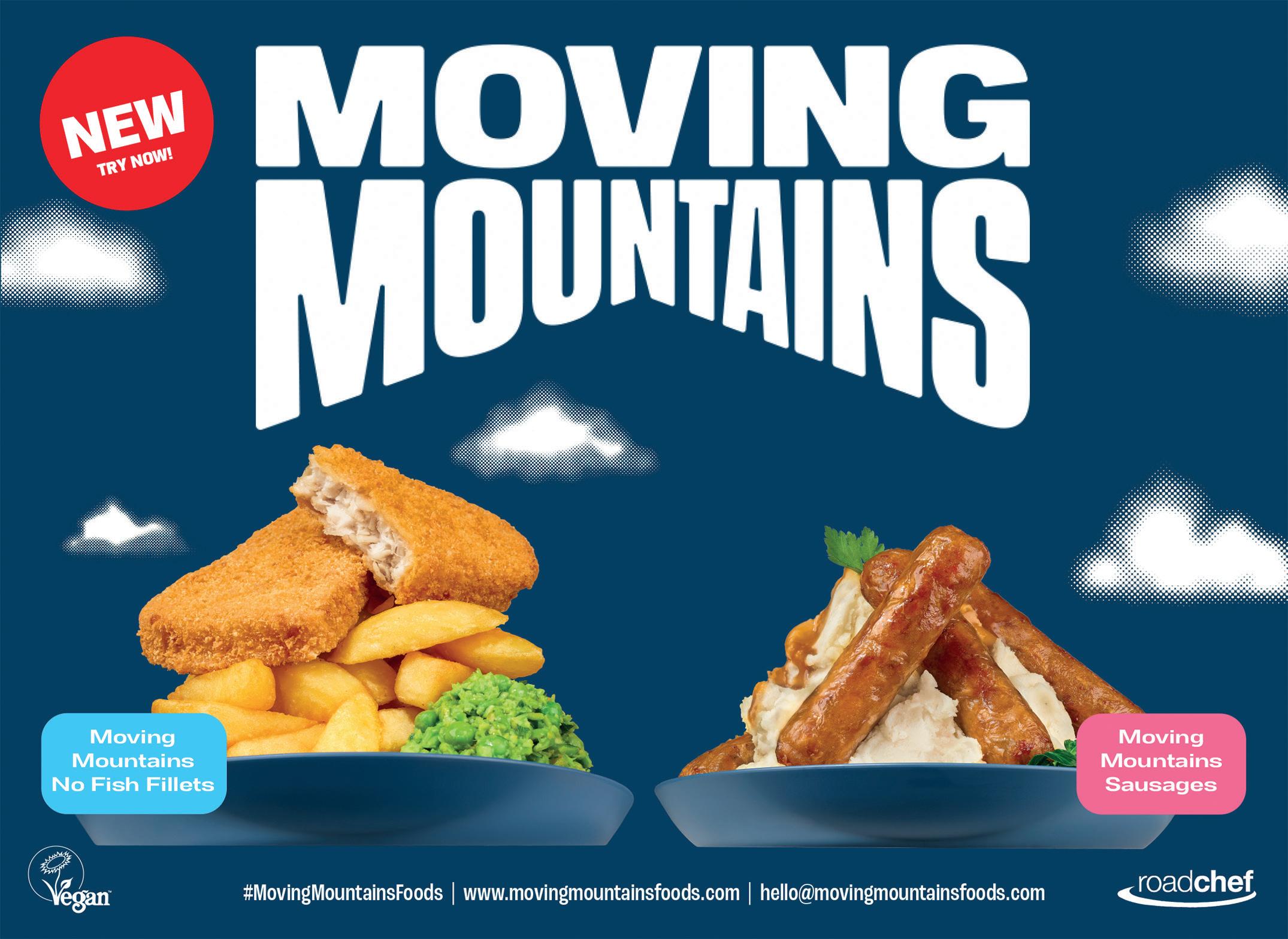
We are on a mission to make sustainability delicious, through real change that tastes great: taking our customers on an adventure into flavour and unlocking the power of every bite to make a difference.
Moving Mountains wants to achieve this by tackling its three ‘mountains’, focusing on taste, the environment, and health.
Try our delicious sausages and classic ‘no fish’ fillets today, and join us on our adventure into flavor!
Visit movingmountainsfoods.com to learn more about our mission.
#MovingMountainsFoods
foodchainmagazine.com 89 Roadchef



90
of noteworthy causes: “It still confounds me how we go from strength-to-strength with our fundraising. I can’t explain why it’s become so successful. I have worked for Roadchef for 13 years and been involved in all of the charity work for the last 11. I remember the NSPCC was the first charity partner we worked with, over an 18 month period, and in that time we managed to raise around £150,000. Ever since then, things have continued to grow. I’m sure that the experience we have gained in terms of ticking the correct boxes and getting people involved with the fundraisers has been a part of the success, however it also depends on the partners we are working with – its not all down to Roadchef. We have also formed partnerships with Marie Curie, the National Air Ambulance for whom we collected £600,000, a joint mission with the breast and prostate cancer appeals and finally, Cancer Research UK.
Ahead of the curve
“Without stating the obvious, Cancer Research is amazing at what it does,” he continues. “Although we’ve honed our approach to raising the most we can for these partnerships, it’s not all down to us or the participation of our fantastic colleagues. A huge power behind the wealth of support this duo receives is the combination of the charity’s experience with the relatable nature of its subject. We will soon be announcing our next huge milestone in our targets – we have hit £4 million in what is our fifth year of working with Cancer Research, despite the two years of lull that Covid, and now the cost-of-living crisis, has created. We raised £2 million in the first two years supporting the cause alone, so we’re aiming to hit £5 million by the end of our sixth.”
As well as charity work, Mike is responsible for managing Roadchef’s sustainability initiatives and its Environmental, Social and Governance (ESG) policies. Macquarie holds both elements high on its agenda, which will allow Mike to continue building upon
everything Roadchef has already done towards reducing its carbon footprint. He states: “I am becoming more involved with Macquarie on everything relating to sustainability. Over the years we have carried out a number of projects, including investing in green energy, recycling and working towards zero to landfill, and I am confident in our current predictions in continuing to be ahead of the curve in years to come.”
The highway to success is wide-open for Roadchef. It already had the mission but now with even greater means at its disposal, there’s no measure as to how far the company will be able to continue in serving the community, whether raising money for those in need, working towards making our motorways greener or providing somewhere for drivers to rest and recuperate. ■
www.roadchef.com
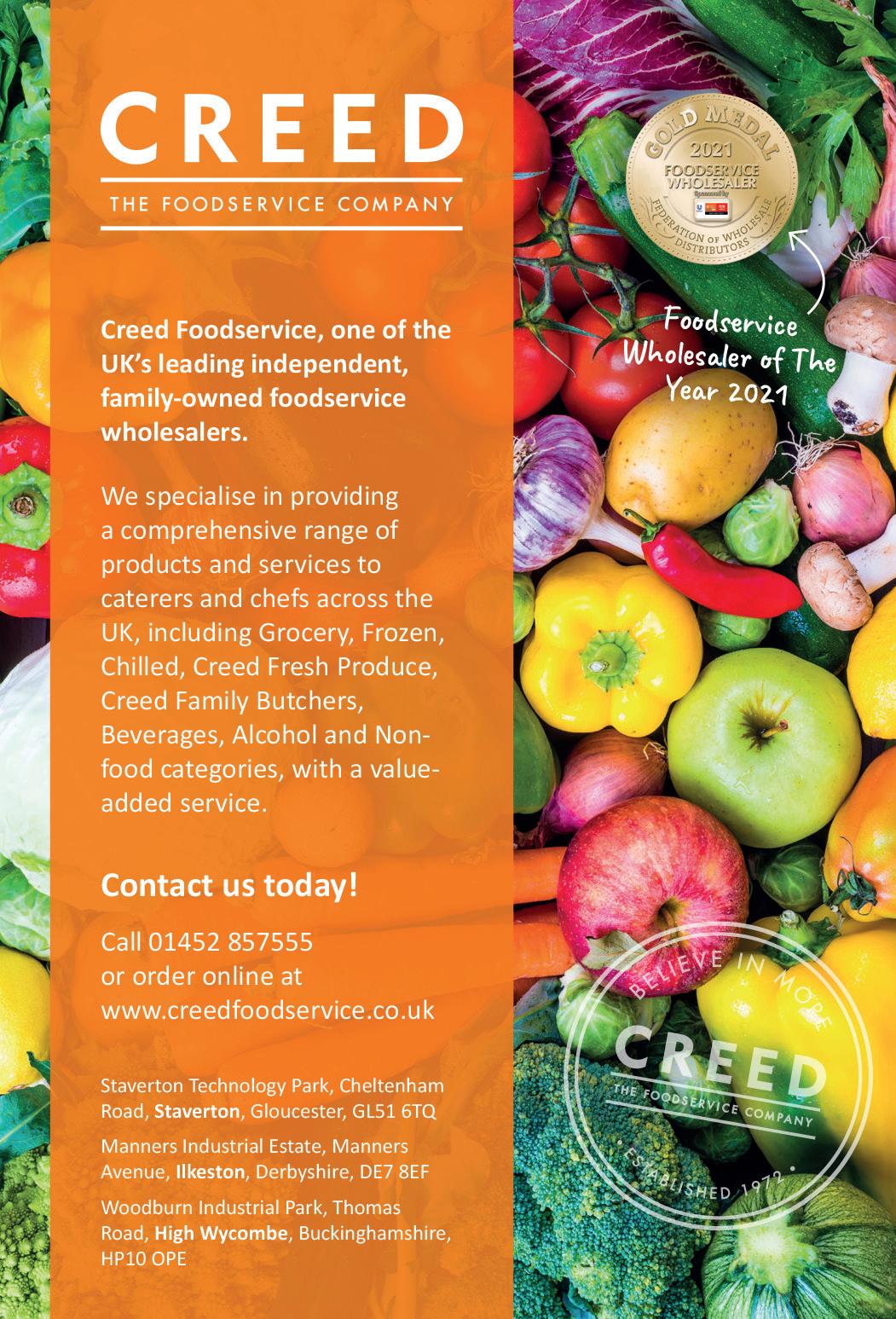
foodchainmagazine.com 91 Roadchef
INNOVATING OLD-SCHOOL
In modernizing a homemade feel, SusieCakes adapts old-school American baking for the 21st century

92

foodchainmagazine.com 93 SusieCakes


94
When walking into our bakeries you are greeted by our staff into a clean, bright and modern interior, that still has a classic feel,” opens Chad Kilpatrick, Chief Financial Officer. “We are very transparent about our process and always strive to make the best-quality products possible. We enclose all of our kitchens in glass so you can see our team members baking and combine this with the highest level of service across the counter.”
SusieCakes was founded in 2007 by Susan Sarich, in Brentwood California. For its creation, Susan added a sprinkling of her academia, having studied hospitality management at Cornell Business school, to a base of her fond childhood memories, with a large pinch of personal ambition. The final outcome is a spectacular blend of old yet new, modern yet traditional and familiarity doused with intrigue.
Celebratory essentials
Following her graduation, Susan worked for a number of different hospitality concepts, but wasn’t satisfied by the opportunities available to women within the industry. “She saw a need for a better opening for women to be able to build a career path for themselves in the hospitality sector, without having to make significant sacrifices in their personal lives,” Chad highlights. “One of the reasons she chose to develop a bakery business, is that a lot of the work is completed earlier on in the day. Meaning that, if you are a woman who is interested in professional pastry arts, it can create an opportunity for you to manage an exciting, professional career with SusieCakes and still be finished by four pm to pick up your kids from school. That was one of the main objectives that Susan had.”
SusieCakes prides itself on being a “classic American scratch bakery concept.” Its products are made fresh every day, at every location. It sources the finest ingredients from European butter to Madagascan vanilla and refuses to use preservatives or stabilizers in any of its products. However, beyond this concept, Chad explains that: “SusieCakes is in the celebration business. We take celebration seriously. In building our relationship with the local community, we try to gain trust by helping whenever there is a special occasion. So, whenever someone thinks about doing something special for a loved one, they think of us first – as we’re the best that you can get.”
This commitment to celebrating with its customers, or ‘guests’ as Chad refers to them, extends further than simply offering a range of different celebratory-themed styles of cakes. “We have a ‘Celebration Specialist’ role in the company, which requires someone who is well-versed in our approach, excellent at communicating and loves to connect with people,” he continues. “Their day-to-day involves meeting up with prospective clients and taking the time to sit down and learn about their special day: what kind of wedding it is, when and where it’s going to be, how many guests will be attending and what they are like. At SusieCakes, we take this really seriously. We want to provide all our happy couples with the best possible addition to their day. It’s so much more than just a cake tasting.”
In 2020, the ability to celebrate was brought to a halt by the Covid-19 pandemic –meaning the likes of SusieCakes had to find new and inventive ways of being there for its faithful customer base. Times of great change require adaptation and SusieCakes rose to
“ “
We have a ‘Celebration Specialist’ role in the company, which requires someone who is well-versed in our approach
foodchainmagazine.com 95 SusieCakes
“ “
the challenge of still providing celebratory essentials during such unprecedented times. “It was non-negotiable, we did a couple of major things after Covid hit,” Chad recalls. “We started the process of building an entirely new website, with the aim of making the online ordering process a far more seamless and enjoyable experience for our customers. We saw a lot more people wanting to order our cakes online and, although they could beforehand, we understood that it needed to be a bigger part of our business, which required further investment in our e-commerce systems.
Crafted with care
“We have worked very closely with our point-of-sale provider, Toast, which has been hugely successful, and we have a number of ongoing developments including a brandnew app, which will be rolling out next year.
Alongside this, we worked hard to improve and expand the delivery of SusieCakes products. We wanted to figure out how to ship our signature cakes anywhere in the country without compromising any of the recipes, which is not an easy thing to do, due to our lack of preservatives and stabilizers and use of genuine buttercream frosting.
“We believe in providing the highest and freshest quality for our customers. So, we spent around 18 months researching and developing the most appropriate type of packaging, to ensure that when one of our cakes arrives at your front door, it’s a comparable experience to walking into one of our bakeries – from every standpoint you can think of: the branding, the beauty and quality of the packaging, the 100 percent recyclable packaging. We partnered with BigCommerce, on account of the functionality aligning with our e-commerce business perfectly. For

96
example, let’s say your mom’s birthday is six weeks away from now and you want to preorder a cake for her, to be delivered in time for her big day – our advanced ordering system hosts the necessary features to allow you to do so,” he concludes.
SusieCakes provides a wonderful example of how a contemporary business can utilize today’s technology to enhance its traditional values of yesterday, instead of simply replacing them. In doing so, it manages to carry forward a delicious slice of the past into the modern food and beverage industry – a company that cares about people, its produce and proper celebratory service. ■
www.susiecakes.com
Toast
Today’s restaurant brands face more challenges and opportunities than ever before. Whether you’re building next generation digital guest experiences or managing cost pressure, restaurant leaders can’t win tomorrow with yesterday’s tech.

Born in the cloud, Toast’s software platform connects employees, operations, and guests, no matter how many locations you have. Our intuitive Flex POS terminals and Toast Go 2 handhelds power seamless front-of-house guest experiences, while our restaurant-grade Kitchen Display System (KDS) streamlines kitchen ops. Toast’s flexible APIs and integrations with over 170 certified technology partners mean your team and your tech stack can adapt to whatever comes next.
SusieCakes, Stickys, Silver Diner Development, The Melting Pot, Jamba, Papa Gino’s and hundreds of other leading enterprise brands trust Toast to power their businesses.
And with one billion dollars in pledged R&D investment, we’re just getting started. Learn more at pos.toasttab.com/enterprise
foodchainmagazine.com 97 SusieCakes
GO COCO-NUTS
From
When businessman
Franklin Baker began supplying flour to Cuban merchants, it seemed like he’d landed the worst business deal in history.

Forget dollars and cents, the Cubans paid him with a boatload of coconuts. Literally. But rather than sinking this
particular business venture, the genius entrepreneur from Philadelphia came up with a masterplan.
“He thought about what he could do with all those coconuts and started desiccating them,” explains Ferdinand Dela Cruz, CEO and Chief Sustainability officer of Franklin Baker Company of the Philippines.
a boatload of coconuts to industry pioneer – the Franklin Baker story
98
“Then when the business started selling the desiccated coconut, Mr Baker wanted to make it convenient for home and industrial bakers. He invested in machines to make the product better, eventually shut down the regular flour mill business and moved to desiccated coconut, starting a factory in New York.”

That first coconut deal was back in 1894. Having discovered that a great supply of
top-quality coconuts could be found in this part of the world, Franklin Baker incorporated a company in the Philippines in 1922. Now, 128 years on, Franklin Baker has a turnover of over $100 million and, as a company carrying his name, has become one of the world’s premier supplier of coconut ingredients to the food and beverage market.
foodchainmagazine.com 99 Franklin Baker
The company, with three manufacturing plants in the Philippines, two warehouses and an office in the US processes over 1.6 million coconuts per day. In its long history, Franklin Baker has exported coconut to several countries around the world for many decades and has worked closely with some of the world’s biggest food and beverage brands.
This year, the company is celebrating its 100-year anniversary of creating a thriving desiccated coconut industry in the Philippines.
These days, the firm’s three production plants are also a global supplier of coconut water, virgin coconut oil, coconut flour and private label retail products. Most well-known for its desiccated coconut – a popular ingredient in bakery and confectionary goods – Franklin Baker has set itself apart from the competition in terms of quality and reliability.
This has been achieved by listening to feedback from customers and developing variants of desiccated coconut, from regular and toasted to sweetened. Most important, of course, is the high-grade quality of the company’s products, which is a direct result of innovating processes over a long period of time.

Gold standard
The firm is also ahead of the game in product and process verification capabilities, operating microbiology and chemistry laboratories that are accredited to ISO 17025 standards. Its pathogen detection system uses an automated method that features polymerase chain reaction (PCR) technology to detect presence of Salmonella and Listeria, amplifying a target DNA sequence and subsequent polymerization. This advanced system is more sensitive (detecting more
100
microorganisms) and results are out much faster (less than 24 hours) compared to other microbiological methods.



“We take great care of the quality of our products, from the time the coconuts are harvested until they are packaged and delivered to our customers,” says Ferdinand. “Aside from being Grade AA & AA+ BRCGS certified which confirms our commitment to maintaining the highest standards of food safety, product quality, and regulatory compliance, we have minimal customer complaints relative to the volume that we produce. We are the gold standard in terms of desiccated coconut as indicated in our BRCGS Global Food Safety Standard (BRCGS), which is adopted by over 22,000 sites in more than 130 countries. Our policies and procedures provide a backbone towards a strong compliance related to product and packaging quality,

Hypac Packaging Pte Ltd











ADDING VALUE THROUGH SUSTAINABLE PACKAGING Hypac Packaging Pte Ltd (Hypac) has pioneered the supply of high barrier multilayer films since 1992, allowing MNCs and SMEs to enjoy a true partnership.


As a dynamic solutions company, Hypac is conscious of its environmental responsibility, and is working towards the development of recyclable and biodegradable pouches to align with its 2025 sustainability and plastic waste reduction goals.
By offering a competitive price guarantee based on contracts signed, Hypac strives to create the best value for all its partners with cost down opportunities, while offering short lead time deliveries.
As more than just a vendor, Hypac offers sales and technical support to many of its clients, and assists customers in the development of packaging. The company takes pride in offering tailormade packaging solutions to meet its customers’ exact packaging needs.
foodchainmagazine.com 101 Franklin Baker
which are in accordance to strict regulatory, company and customer requirements.” Aside from third-party certifications such as NonGMO Project Verified, Fair Trade USA, BRCGS, USDA, JAS, and UE Organic, ISO 9001:2015, ISO 22000:2018, HACCP, FDA Philippines, GMASAFE, AB PAO Accredited Testing Laboratory, SEDEX, Kosher and Halal certifications, Franklin Baker holds the 2016 – 2023 Award of Excellence, American Master of Taste & Gold Medal Endorsement, as well as the 2018 - 2023 Beverage Champion by Chefs in America.
Making the workplace a positive environment and supporting the coconut community in the Philippines where production takes place is hugely important to Franklin Baker.

Ferdinand emphasizes that the fact that generations of Filipino families have worked for the company is testament to the loyalty and level of care Franklin Baker has delivered to its employees over the years. The high level of employment created for so many families and individuals has resulted in Franklin Baker becoming an iconic company in the Philippine food industry.
“We work with coconut farmers and that is one of the attractions for employees here,” explains Ferdinand. “There is a sense of mission that we are not just exporting goods, we are actually exporting the best coconut products the industry can provide – and we are also helping coconut farmers have an outlet for the produce they harvest.
“We are able to contribute in a meaningful way to the community and the farmers that we work with. I think that resonates very well with the people. We have shareholders on the board and a management team who genuinely want to take care of our business partners, particularly the farmers.”
Future ventures
“ “
Since sustainability is a priority for the company, Franklin Baker has initiated projects that not only enable farmers to earn more and become better businessmen, but also increase their awareness of climate-related practices. In keeping with its desire to help the coconut farmers, Franklin Baker is a co-founder of the Coconut Coalition of the America’s (CCA), a nonprofit organization established to uphold sound and credible science, and promote responsible communications as well as sustainable practices in the coconut industry.
Improving operations and innovating its practices is a natural process for a business that has been leading the way in its field for more than 125 years. It was this strength in finding new solutions and adapting to change that allowed Franklin Baker to continue operating throughout the pandemic.
Seen as an essential company in the global food supply chain, Franklin Baker carried on
We work with coconut farmers and that is one of the attractions for employees here
“ “
102
doing what it does best, but worked extremely hard to take good care of its staff, ensuring they were safe, protected, and healthy.
With the pandemic behind us and a strong year of trading so far in 2022/23, what does the remainder of the year look like for Franklin Baker? More products and more growth.
“We are excited to venture into the coconut milk and cream market,” revealed Ferdinand. “We are developing packages and solutions for customers in this area, and of course we have done well with what we have previously produced for the market.
“In the medium term, we will be introducing more new products, embracing new challenges, and we are very excited to continue to propagate the Franklin Baker brand across new channels and new geographies.”
With the Russian-Ukrainian war in Europe, high levels of inflation, and uncertainty in the markets, it may not seem like the ideal time
for any company to be making grand plans for the future. But Franklin Baker does things differently, similar to what the owner did, 128 years ago.
“We are always optimistic,” says Ferdinand. “While there is uncertainty, there are still opportunities for this market to thrive, especially with the mega trends of health and wellness and shifts to a plant-based diet.
“There are a lot of developments in these areas, which favor the future of what we do. We are still a sunrise industry – and I think this industry is ripe for product innovation. Already known for quality, reliability and innovation in the industry, we intend to be more known as an advocate and champion of sustainability in the future.” ■

www.franklinbaker.com

foodchainmagazine.com 103 Franklin Baker
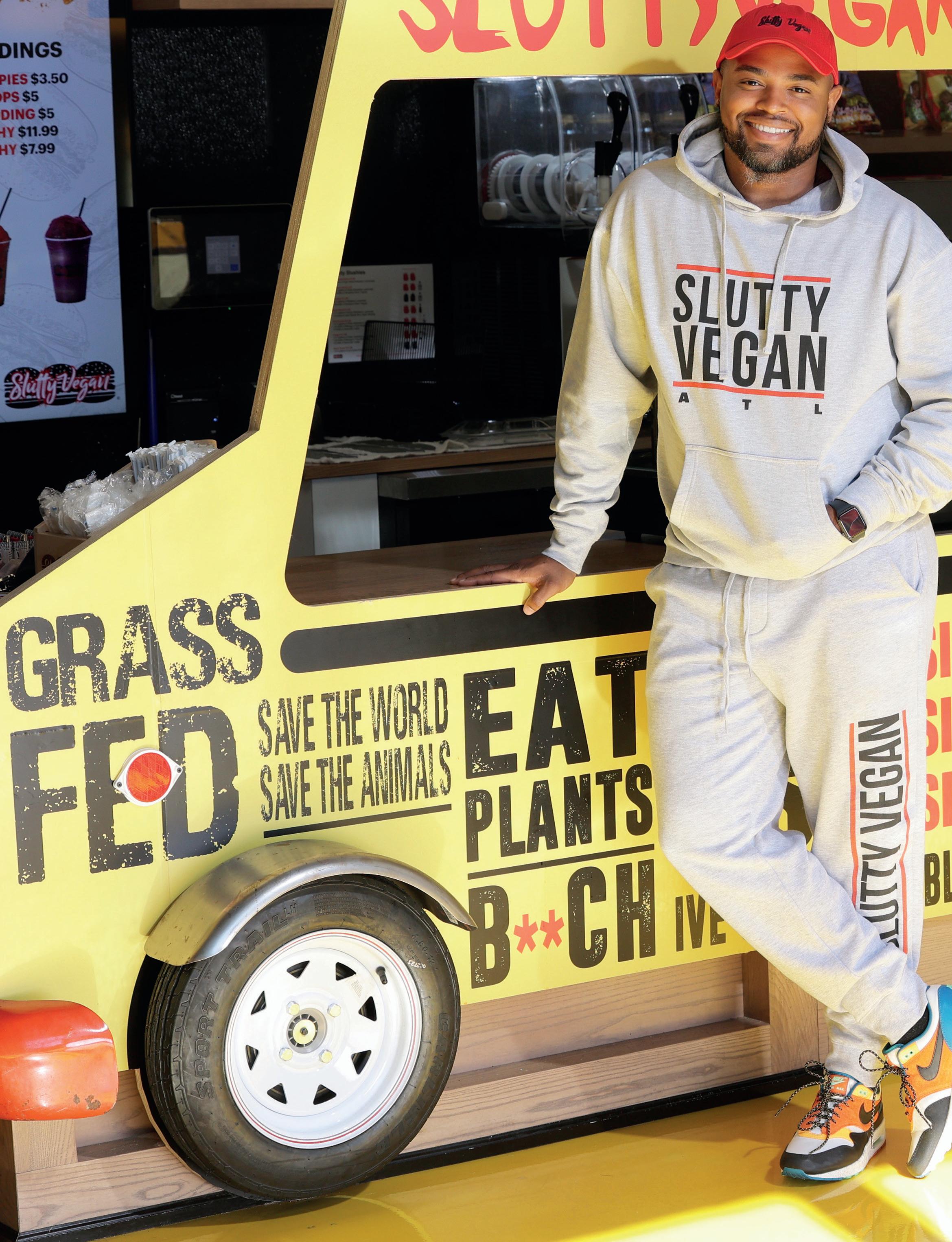
104
Biteme!
Flipping burgers via Instagram to building a fierce vegan food and lifestyle brand that has collaborated with Steve Madden – the story of how Slutty Vegan is changing the plant-based game for good
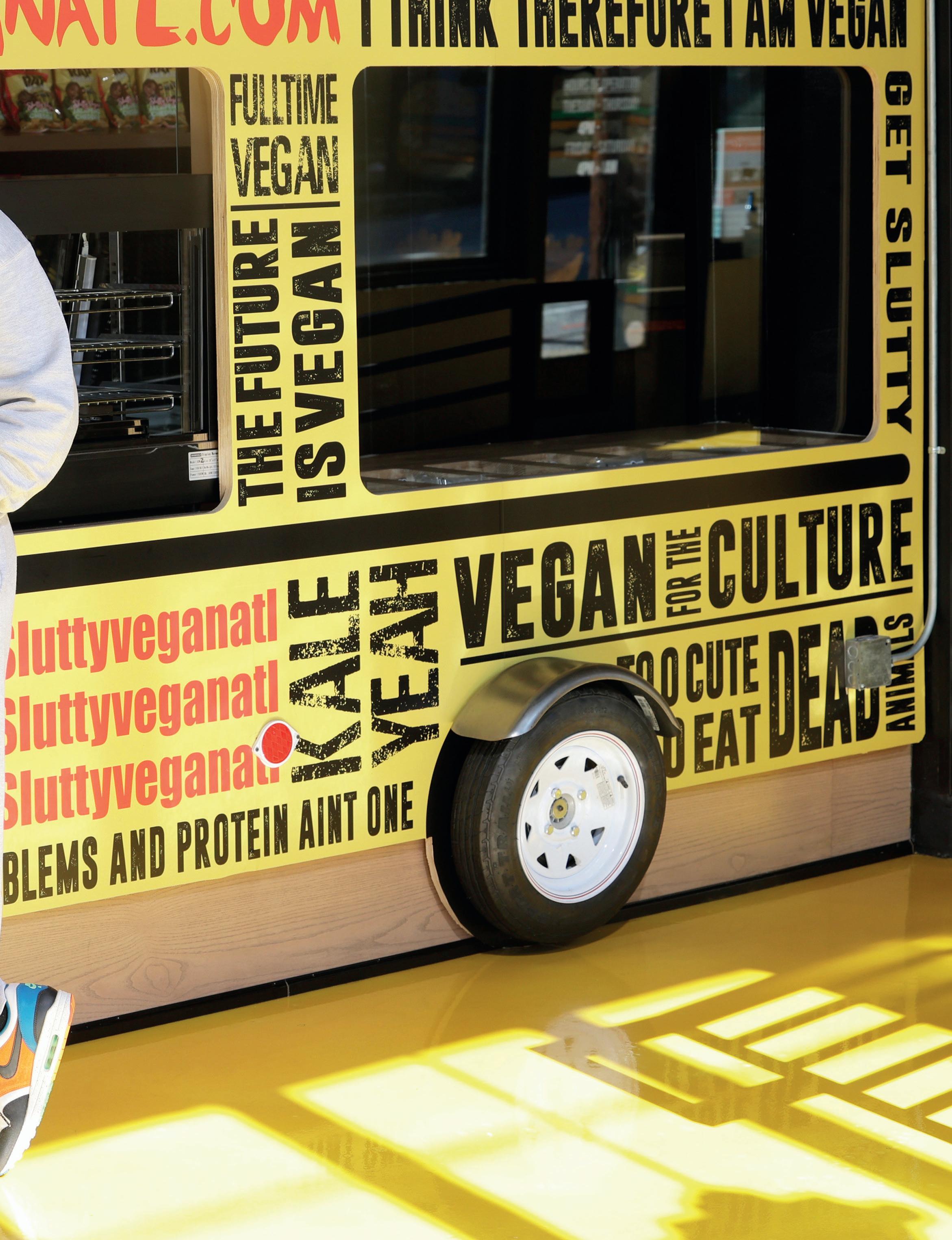 ◀ Jason Crain President at Slutty Vegan
◀ Jason Crain President at Slutty Vegan
Vegan
.com 105
Slutty
foodchainmagazine

106
What’s in a name? Jason Crain, President at Slutty Vegan, a plant-based, fast-food burger chain taking the US by storm, breaks it down for FoodChain. “When we speak about Slutty Vegan, you have to understand where the legend comes from,” he begins. “Our founder, Pinky Cole, struggled to find food late at night as a newly turned vegan. There were very limited options, and not much to choose from: salads, maybe; at a push, French fries. So, the origin of Slutty Vegan is about having access to vegan food, which tastes great, no matter what time it is. We are open until one in the morning, and offer incredible late-night options for those following a vegan lifestyle.”
As Jason goes on to explain, the name – as Shakespeare once suggested – is an arbitrary label. The proof is in the proverbial pudding – or burger, for that matter. “In our book, being a slut is not about sex,” he notes. “It is not about being promiscuous or anything like that; rather, it is about choosing to indulge in things that are positive, feel-good, and good for you. If you have experienced our food, then you will realize that these big, sloppy burgers are about recognizing you can indulge in good food while still sticking to your plant-based philosophies and ideals. We were intent on building a vegan brand with some vibes; something very opposite from the typical grass and greenery. We built an experience that feels more like an amusement park than a vegan restaurant with food that’s fun to eat, flavour-filled, and 100 percent plantbased. That’s the Slutty Vegan way.
“From those origins, we have curated a menu that is a little edgy but still tasteful,” Jason details. “In that, I mean we use names people will immediately recognize; however, because of that, we can then change the narrative. For instance, we call all our customers sluts when they walk in.
We might ask you to dance before you get your food. We might give you a birthday chant, or shout out which city you are from, we might even ask you if you are a Slutty Vegan virgin, and if so encourage you to get #SLUTTIFIED!
At Slutty Vegan, being a slut isn’t sexual, it is about being part of a community that understands that even plants can taste good and you can have fun eating them! We are truly a family-friendly establishment.”

Landmark store
In order to prove that, Slutty Vegan recently launched a kids menu, including the ‘Eat Plants Kids Cheeseburger’ and ‘Chik’n Tenders’, and it is proving incredibly popular already. Originally established in Atlanta, Georgia, Slutty Vegan is rolling with the (good) times, and growing with them, too. What started in a home kitchen and the back of a food truck has since snowballed.
foodchainmagazine.com 107 Slutty Vegan
With its attentiongrabbing name, engaging marketing, and innovative menu, the fast-food chain now has six different restaurants across Georgia and Alabama. It has also recently opened a landmark store in Brooklyn, New York, and a further location in Columbus, Georgia.
Indulgent alternatives
No meat? No problem. Partnering with Impossible, a frontrunner in the meat-free alternatives market, the chain offers over a dozen different burger and hot dog options. For example, the Ménage á Trois is a plantbased patty loaded with vegan bacon, shrimp, and cheese, plus caramelized onions, lettuce, tomato, and a healthy serving of the brand’s signature Slut Sauce – all topped with a vegan Hawaiian bun. Other options include the Big Dawg, a plant-based bratwurst with toppings of sauerkraut and sauce in a pretzel bun; and the innovative PLT: several sweet jerk plantains complemented with lettuce, tomato, and Slut Sauce. All of which come with golden crunchy-fluffy fries.
“We try and make an ordinary burger have some life and become more vibrant,” Jason reveals. “A big part of that is our secret sauce and seasoning: Slut Sauce and Slut Dust. Together, they bring everything up to a whole new level. Additionally, we serve food like vegan banana pudding, coleslaw, and sweet potato pie. It all tastes incredible and people recognize
that, though they are vegan, they can still indulge in the nostalgia of traditional foods because we are offering a meat- and dairy-free alternative.
“Everything we do leads with taste,” he goes on. “If it does not taste good, then it will not reach the menu –let alone our customers. We operate between two pillars: food that tastes great because it is cooked with love and seasoned well; and a unique experience that makes our customers want to come again and again. People walk in our doors and they are instantly met with energy, love, and a plate of food that will turn a bad day into a good one. That is what really brings people back. We also cater to a variety of customers: we launched a non-soy burger and gluten-free option for those with intolerances, and we continue to push limited-time offers to keep things fresh and exciting.”
With a background in technology, Jason is also keen to point towards the importance of data and analytics for any growing business. For Slutty Vegan, technology has been at the core since it was first launched and initially sold its burgers via Instagram. Today, things are slightly different; people no longer need convincing that plant-based alternatives are a viable option.
As Jason explains: “The plantbased market in Atlanta is very vibrant. There are tons of entrepreneurs and restaurateurs that have opened successful vegan and vegetarian places in the city. One of the reasons we chose
People walk in our doors and they are instantly met with energy, love, and a plate of food that will turn a bad day into a good one
108
“ “ “ “
our initial opening site was because it is in the heart of the west end in downtown Atlanta, which is home to some of the city’s most popular vegan places. We wanted to build on top of that, adding more options for the plantbased community by freshly mixing the old with the new.
“Undoubtedly, the vegan market is growing, and we consider ourselves a leader in that space,” he asserts. “We recently launched a retail division in partnership with Costco to bring our brand from the streets into the family home, bringing us closer to being a household name. The range is doing really well, and includes Pinky’s special dips: spinach and artichoke, hotlanta cheese, and buffalo cheese. We have just launched the range in about 250 Target stores across the South and New York. This is just the start; in the future, we envisage ourselves as a brand that can bring a host of high-quality vegan products like bacon and our signature Slut Dust to grocery stores nationwide.”
Things are certainly looking up. Slutty Vegan expects at least three new openings before the close of 2022, and is planning a further ten along the East Coast next year.

Founder and CEO, Pinky, is also releasing her much-anticipated cookbook in November, which will be widely available across the US. “It is a busy time!” laughs Jason. “But that is what makes it so exciting. Going forward, we intend to become a more familiar brand that offers plant-based foods across the country, whether that means in a restaurant or a grocery store.
“In the next few years, we are also excited to see the rise of Bar Vegan, our upscale cocktail lounge, which will be popping up in additional cities across the country,” he concludes. “Another brand of ours, Dinkies, is leading the way with its vegan cheese steaks and tater tots, and consumers can expect to see more of that name in a range of settings like commercial airports. But we are also keen to continue building ourselves as a lifestyle brand outside of the food space; recent collaborations with Steve Madden and The Lip Bar attest to that. Put simply, you will be seeing, hearing, and tasting a lot more from us in the future!” ■
www.sluttyveganatl.com
foodchainmagazine.com 109 Slutty Vegan
Wildnatureby
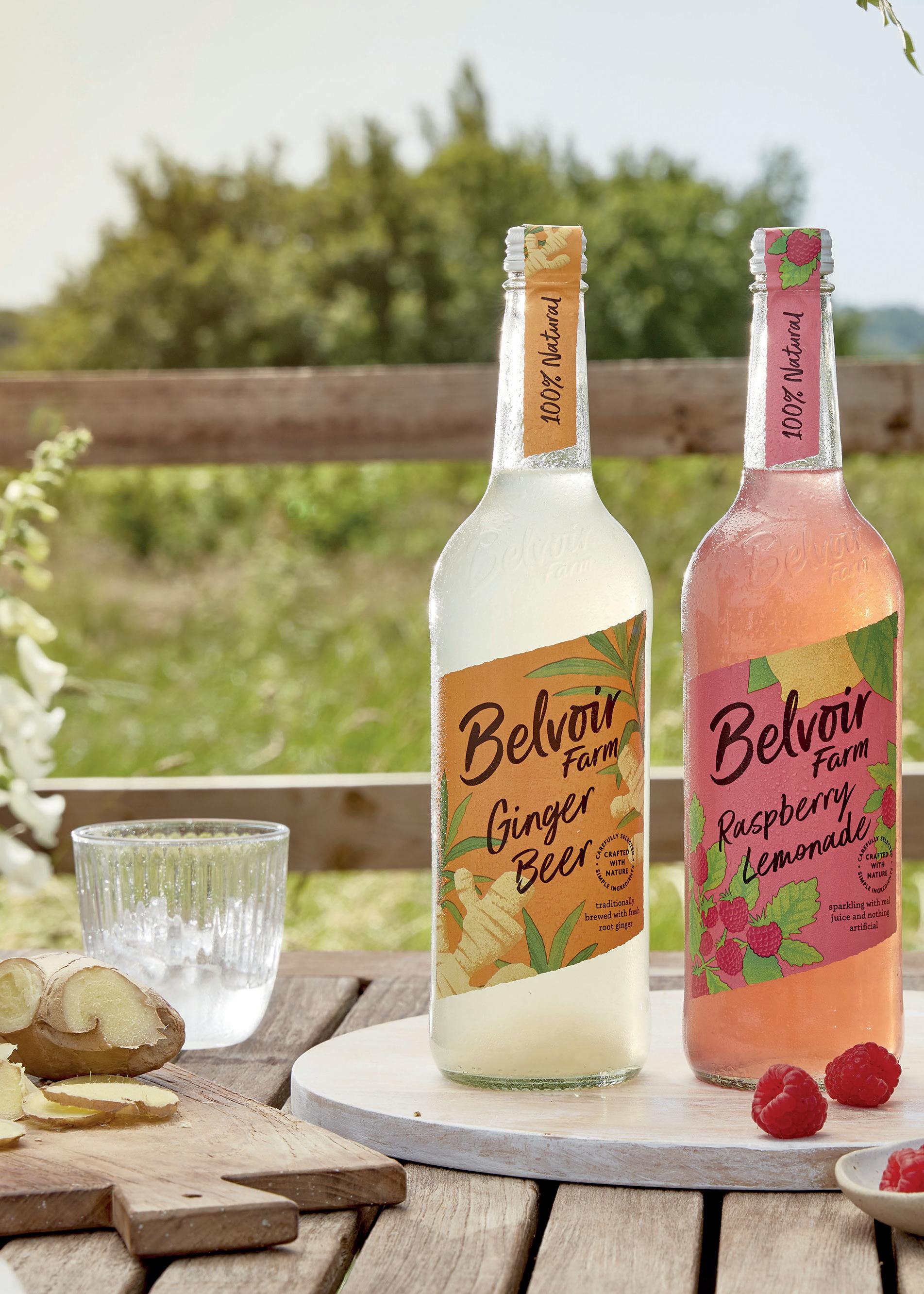
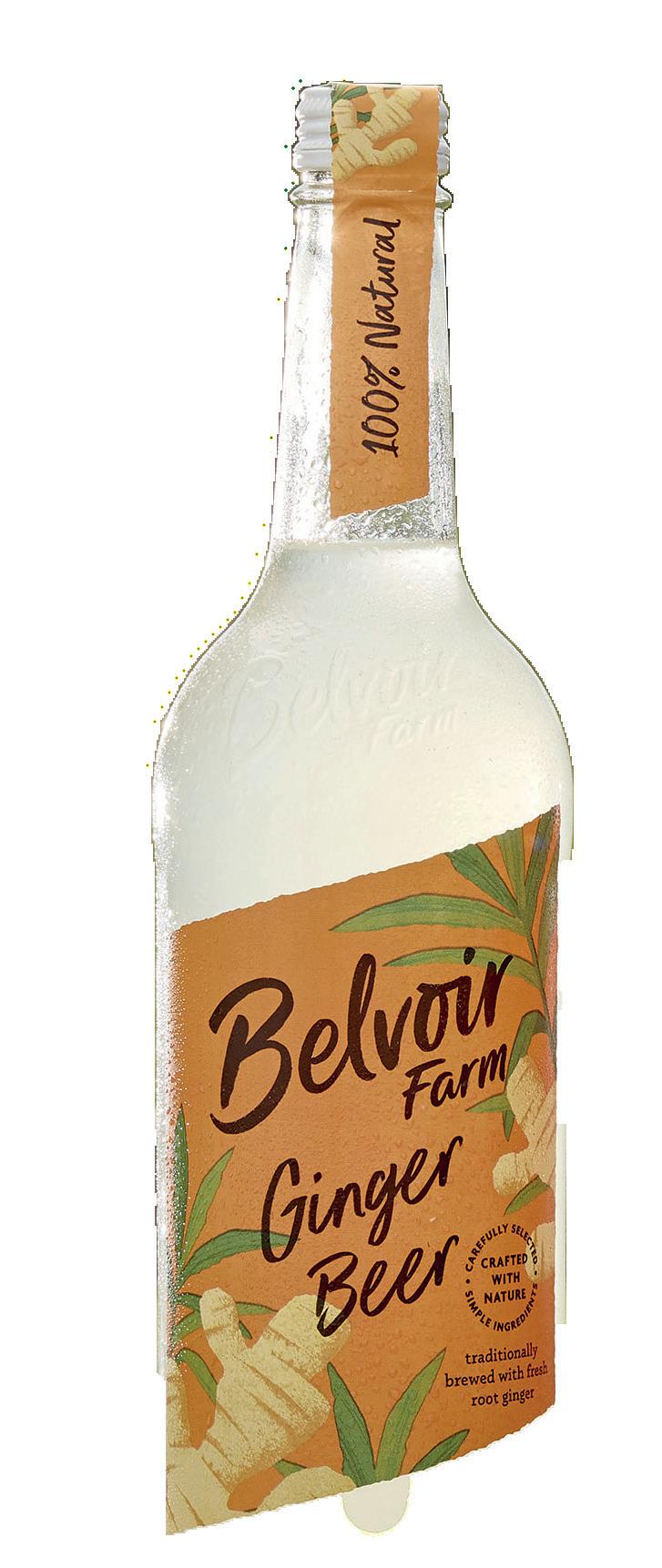
From kitchen table to multimillion pound business: how Belvoir Farm took the UK adult soft drinks market by storm
110
Nature is real. Nature is imperfect. Nature is beautiful. Belvoir Farm (Belvoir) holds these truths to be self-evident.
Tucked away alongside the wild hedgerows between Grantham and Nottingham in the Vale of Belvoir, there is a 2000-plus acre farm and family-owned business that is currently taking the adult soft drinks market by storm. But, first, a lesson in pronunciation.
Following the Battle of Hastings in 1066, so the story goes, a Frenchman stood atop a hill in what we now know as the Vale of Belvoir and said the following: Quelle belle voir! Or: What a beautiful view! However, over the next hundred years, French names were anglicized to reinstate English authority.
As a result, Belvoir is now (technically) pronounced beaver – just like the animal. Either way, though, the curious part of all this is that nature is inextricably bound up in the meaning of the word. And that is something crucial to the brand that bears its name.
Proud to include no artificial preservatives, flavourings, colourings, or sweeteners across its impressive range of cordials, sparkling juices, and botanical sodas, Belvoir is family-owned and run –and it is quickly approaching its 40th anniversary.
Established as only a mildly successful fruit farm by Lord and Lady John Manners in 1984, it was soon clear that something had to change to keep the business viable. Therefore, when harvest season came around, the Manners decided to press any unsold fruit into juice and make some cordials with it – all by themselves. And it tasted good. Really good.
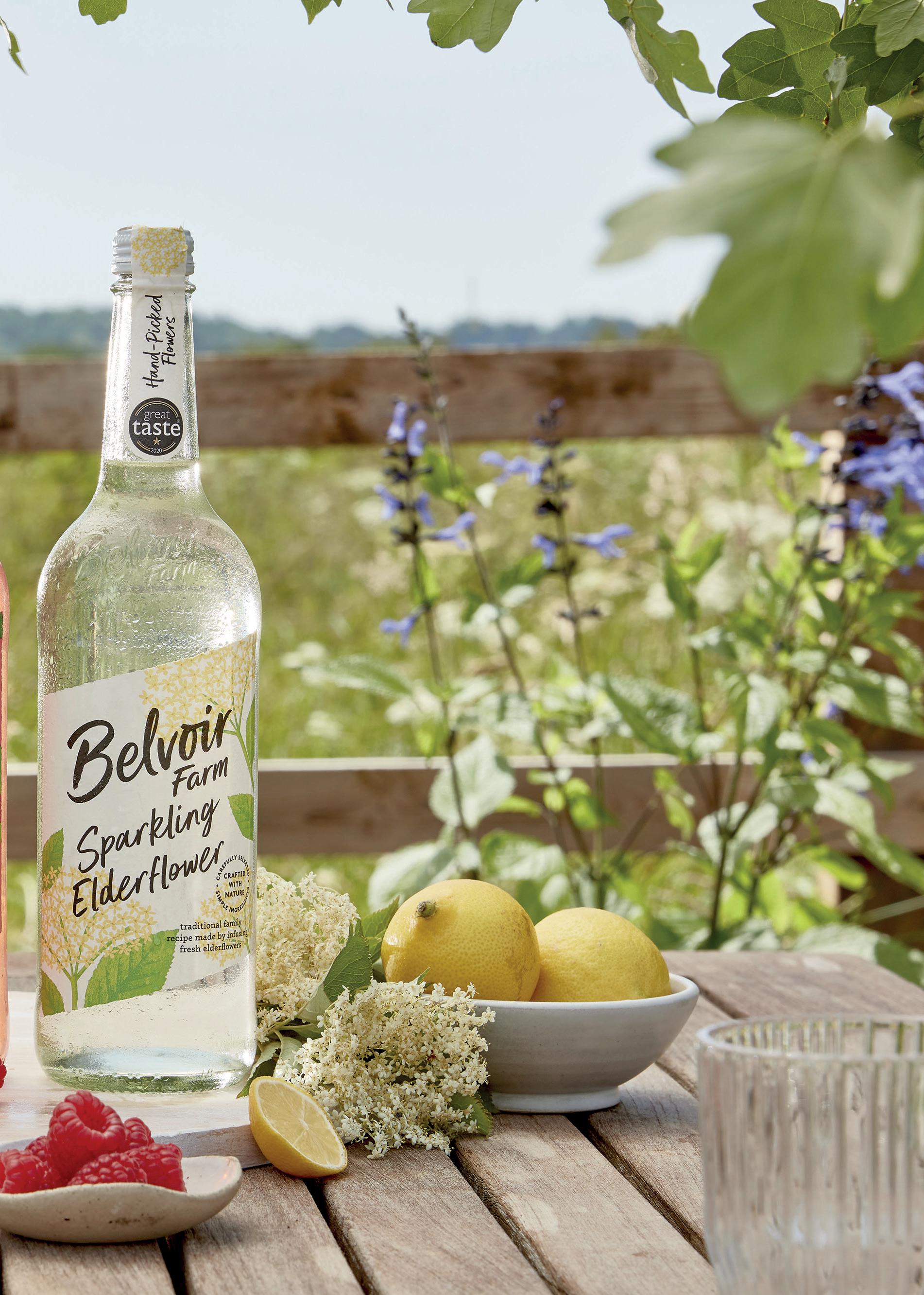
foodchainmagazine.com 111 Belvoir Farm
As Frank Fitzgibbons, Production Director at Belvoir, tells Food Chain, that is the basis for everything customers now know and love about the brand. Perhaps most famous for its elderflower cordial, Belvoir has upscaled its operations dramatically to meet growing demand.

Originally taking place on the Manners’ kitchen table, says Frank, Belvoir soon moved into an upgraded but still relatively small facility. It was very labour intensive and manual, often relying on the local public to come and pick the elderflower at harvest time. “The business sold just over 1000 bottles to local food stores and farm shops in its first year,” he explains. “By the time I joined in 2003, production had grown to two million bottles every year, and that has just skyrocketed over the years. Last year, for instance, gross sales rose to £27 million. We are now producing 22 million bottles annually.
“We have a very well-automated site and are constantly investing in the business,” Frank goes on. “In 2015, we established a new, purpose-built
.
.
.We continue to do so today. One example of that is our sixty-head filler machine, which was purchased in 2019 and has improved our line speed and throughput by 40 percent 112
“
“ “ “
factory to create capacity and enable us to meet the increasing demand for our products. Since then, we have invested heavily in modern filling and capping machinery, packing equipment, and processing kit for our juices and elderflower infusions. Back in 2008, we really had to start investing – and quickly. The business was starting to grow exponentially in terms of distribution, and thus we had to begin integrating sophisticated technology into our processes. We continue to do so today. One example of that is our sixty-head filler machine, which was purchased in 2019 and has improved our line speed and throughput by 40 percent.”
Nature at its source
Despite the monumental surge in production demands, little has changed in terms of the recipe. To this day, Belvoir still follows the original one used by the Manners in 1984. As the saying goes: if it is not broken…
“Even with that continuity, we have still increased our range of products alongside company growth,” reveals Frank. “Stock Keeping Units (SKUs) have increased steadily since we started, and while we are still very much an elderflower-based business, we do also sell other juice-based products in tandem. Several years ago, for example, we created a sparkling raspberry lemonade, and that has proved very popular. We also love ginger! We produce delicious ginger cordials and ginger beer, and also often look towards the seasons. That means summer punch or citrus drinks when it is warm, and winter cordials or berry punch mixes when it is cold.

“Above all, though, we pride ourselves on quality,” he adds. “We source real, natural ingredients. We do not cut back on them. It is all about what we source, how we source it, and then, of course, how we produce it. Though our bottling processes are now

foodchainmagazine.com 113 Belvoir Farm
automated and upscaled to meet volume demands, we make the liquid using very simple techniques to maintain the integrity of our ingredients and keep them as natural as we can. The elderflower, for instance, is made with fresh flowers picked that day in the local community and from our own 60-acre organic plantations, and we do very little with it apart from infuse it with water, sugar, citric acid and lemon juice and let nature’s magic take its course.”
Award-winning flavor
For this decidedly simple approach to crafting adult soft drinks, Belvoir has garnered a lot of attention from the critics. Earlier this year, for instance, the company was named 2022 Soft Drinks Brand of the Year by The Grocer Gold Awards. Moreover, in the last ten years alone, Belvoir has received 21 Great Taste awards and another 4 this year.
Yet all that recognition and plaudits has not made the Leicestershire-based company complacent. “New product development is very important to us,” asserts Frank. “Recently, we launched a range of botanicals, which was spearheaded by our in-house innovation team. In terms of size, the team is relatively small. However, as a unit, it works incredibly hard to find and source new and exciting ingredients. As a result, we have been able to continue our success outside of elderflower cordials, and we are seeing strong interest in these new botanicals. In fact, we have gained some key distribution contracts and awards recognition based on their flavour alone!




“We are very adept at launching new items, such as sparkling juices or botanical creations, and are proficient in getting them to market quickly,” he continues. “We pride ourselves on the transition from initial concept to end product; we are able to act quickly and maintain high standards throughout. Saying that, though, if we do not have it right then we will not rush it –again, quality and taste come above all else.”


As a brand, Belvoir is also insistent that it maintains standards for ethics and sustainability. For Frank, the fact that Belvoir’s roots are as a farming business, and therefore bound to the environment around it, must inform decisions the brand makes when it comes to its place in relation to the living world.


“Over our 2000-plus acres of arable land, we have planted thousands of trees and new hedgerows, installed bird boxes, we grow land just for winter bird feed and we set up beehives,” he reflects. “It is all about being genuine and caring for the environment. To that end, we joined forces with Certified Sustainable and Carbon Quota. Together, they measure our activities with regards to sustainability, and how we interact with the local environment.”
Since 2018, Belvoir has reduced its carbon emissions by 36 percent – a figure
114
that has been independently validated by Carbon Quota. More recently, the company was awarded a top tier Gold Award from Certified Sustainable, demonstrating that the soft drinks producer has practiced good waste management.

“For a company of our size, we think that is terrific, and it motivates us to work even harder towards our ambition of becoming carbon neutral by 2030,” details Frank. “We are now zero waste to landfill too, and have been for more than a year. Other initiatives helping us on our environmental mission include the installation of solar panels across our main site and the planting of 28 acres of wildflower and 10,000 trees through the Countryside Stewardship Scheme.”
Recently, Belvoir has been exploring the value of television advertising, leading a campaign to show its commitment to everything we have talked about thus far;
from high-quality ingredients to sustainable production methods, the company intends to expand and amplify its ethical framework going forward.
“We are currently in the process of putting together a new three-year business plan that takes into account the current economic climate and global situation,” notes Frank. “So, the goal is to continue doing what we are good at; producing quality adult soft drinks with integrity while also introducing new ideas to the market.
“We want to become a leader in our field – not a follower,” he concludes. “We are very proud of what we do, and we are hoping to keep that momentum going in difficult times. The headwinds are challenging. However, we have a steady crew and the ship is sailing in the right direction.” ■
www.belvoirfarm.co.uk
foodchainmagazine.com 115 Belvoir Farm


116
Senior Vice President, Susan Lee ▶
Ahead of the gourmet game
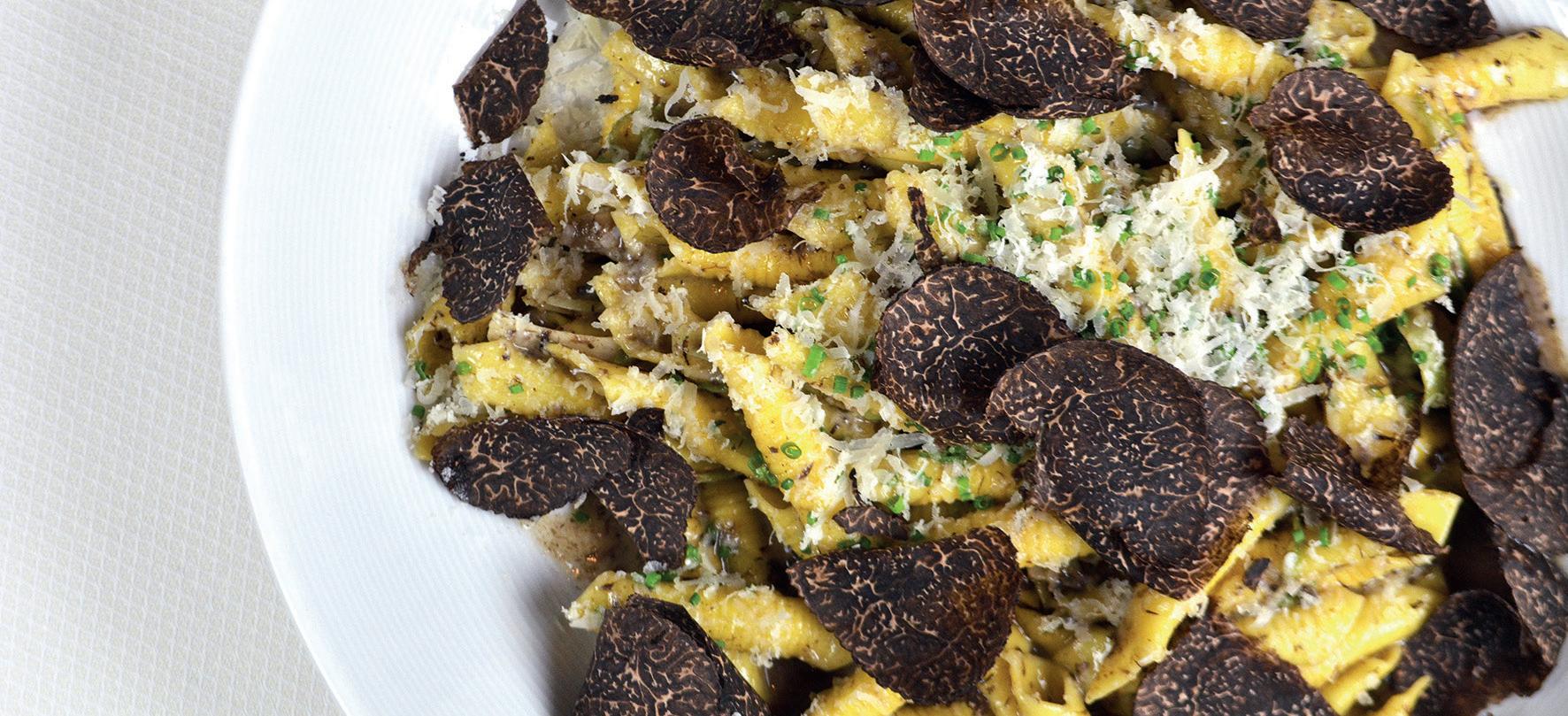
The Altamarea Group (Altamarea) is driven by a simple pursuit: crafting incredible dining experiences which ensure consistency and excellence at all levels. As a result, its restaurants have been recognized by the New York Times, the Michelin Guide, the James Beard Foundation, Zagat, and many more.
Currently, Altamarea operates 20 restaurants around the world. Senior Vice President, Susan Lee, recently sat down with Food Chain to discuss the brand’s rise, new restaurants, and a promising future.

But first, a little context. Altamarea was founded in 2009 by Ahmass Fakahany, whose mission was to
create an experience that extends beyond food and beverage. Since then, the company has propelled the luxury Italian dining scene in New York City, with a beloved following and dedicated team of industry professionals leading the way.
Altamarea’s flagship restaurant, Marea, is one of the busiest of its kind in the city – perhaps on the East Coast. It was, like the rest of the company’s portfolio, built upon a vision to create distinct restaurant brands that offer outstanding service and unsurpassed quality. At Marea, diners can expect a variety of dishes, ranging from caviar and oysters to seasonal antipasti and award-winning hand-made pastas.
foodchainmagazine.com 117 Altamarea Group
An insider’s guide to the Altamarea Group and its mouthwatering collection of fine dining establishments
It is worth pausing on the latter. One of Marea’s signature dishes – a red wine-braised octopus and bone marrow fusilli – has a cult following. Another dish, the seasonally driven quadrotti, is filled with sweet summer corn and finished with chantarelles and shaved black truffle. The menu is also composed of fish dishes, whole fish preparations, as well as a selection of meats and sides. Think pan-seared dover sole, 50-day dryaged beef ribeye, and confit potatoes. There is something for everyone.
“Marea welcomes around 2000 guests a week, the brand loyalty is truly remarkable,” admits Susan. “The restaurant stands out from the competition, particularly within the high-end Italian fine dining scene. Location is certainly a key factor – Central Park is beautiful, and the visibility for Marea continues to draw crowds. The food, wine, overall quality, and rigorous attention to detail heightens the entire experience. All the pasta is made in-house; extruded, hand cut, and shaped and filled every day. It is quite laborious, but of course worth it. There are at least two-tothree people preparing pasta as their sole job, because it’s such a key part of the restaurant experience. They are invaluable team members, and you can see the pride they have in their craft.
multiple fronts of Morini in New Jersey, Washington, D.C., Long Island, and Miami Beach. More recently, however, we’ve been able to expand abroad, with a Marea location in Dubai, and Morini in Istanbul and Riyadh.”
“ “ “ “
With all those options, which is Susan’s favorite? “That’s like asking a parent to pick their favorite child,” she laughs. “I don’t know if I have an answer for that! I love them all – but if I am going to Marea, then I am definitely going for the crudi assortment (sliced raw fish and shellfish) and all the seafood. Whereas, at Ai Fiori, I am obsessed with the trofie nero. I’ve loved it for over 12 years since I first worked for the group. Still, I go back for more! The desserts there are phenomenal, worth the trip just for that. When I go to Morini, I have to have the black truffle ricotta cappelletti with prosciutto, it’s a signature dish. Also, the olive oil cakes! They are so delicious! I sometimes sneak one out even though I don’t need any more carbs in my life.”
Happy customers
“Beyond Marea, we expanded to Ai Fiori and Morini, which are both very popular,” she adds. “In fact, we have
Despite its success and recognition within the Italian fine dining niche, Altamarea has demonstrated a commercial and personal ebullience for variety, spreading its wings with the opening of 53 earlier on in 2022. Situated on 53 West 53rd Street in Manhattan, the restaurant has been built on a contemporary Asian dining concept. The new location

When I go to Morini, I have to have the black truffle ricotta cappelletti with prosciutto, it’s a signature dish
118
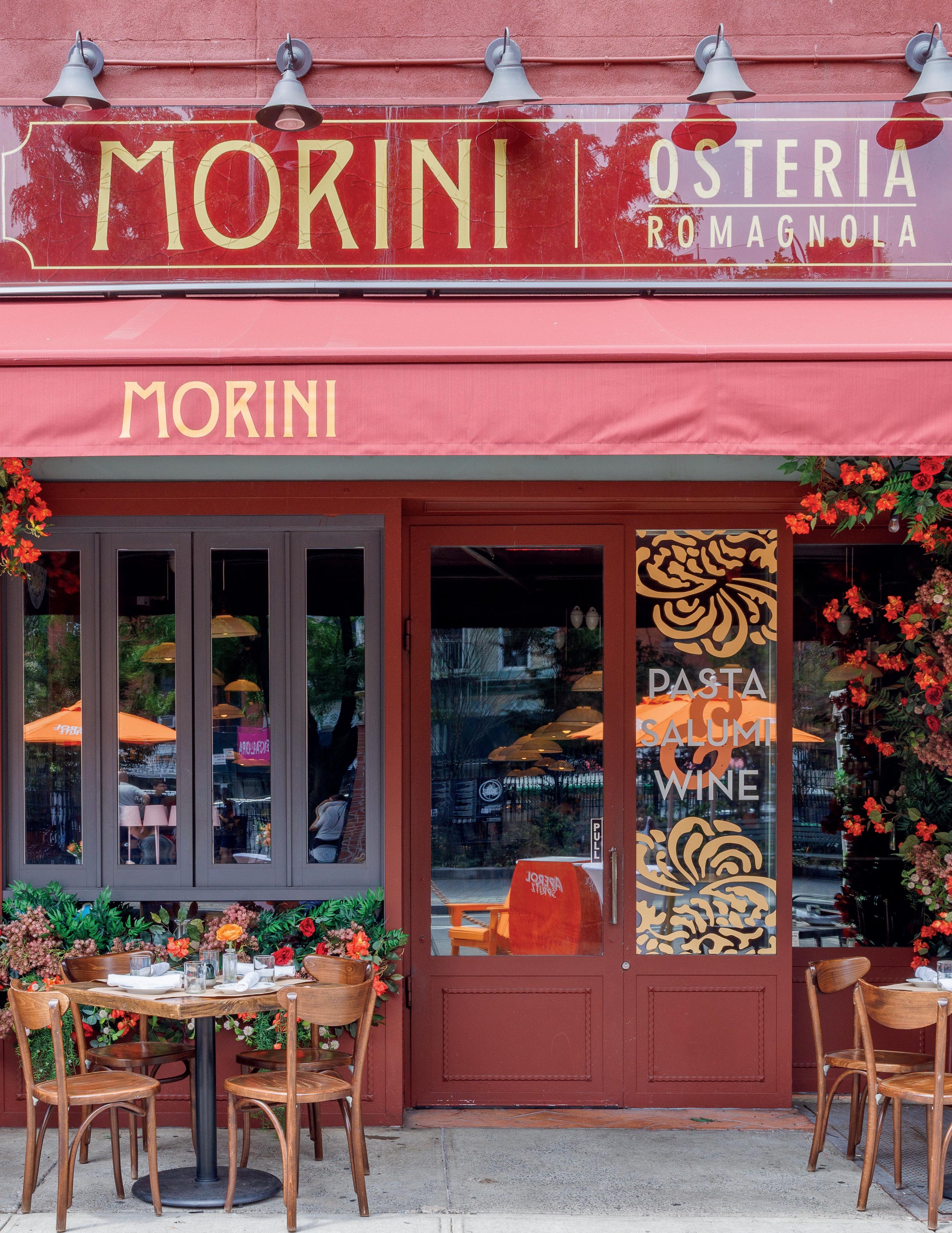
foodchainmagazine.com 119 Altamarea Group
can be found next to the Museum of Modern Art and sits within the Jean Nouvel Luxury Residential Tower. Diners can expect a focus on Cantonese, Singaporean, and Japanese influences and ingredients, which runs the gamut from fluke kombujime, to truffle xiao long bao, kung pao quail, and lobster rice in lotus leaf.
Staying ahead of the game and continuing to diversify through fresh and bold takes on contemporary dining
experiences is part of what makes Altamarea stand out from other restaurant groups. The immediate hit that 53 has been attests to this. But where does the group draw inspiration from: diners or the market?

“I think it has to be a little bit of both,” answers Susan. “You obviously must pay attention to what the client wants, and if you are blind to that then you probably won’t be in business for very long. Listening and responding to our clients is a priority;

120 Altamarea Group


122
we seek to give them what they want, we always consider the desires of our clients and the market trends while staying true to our culinary integrity.
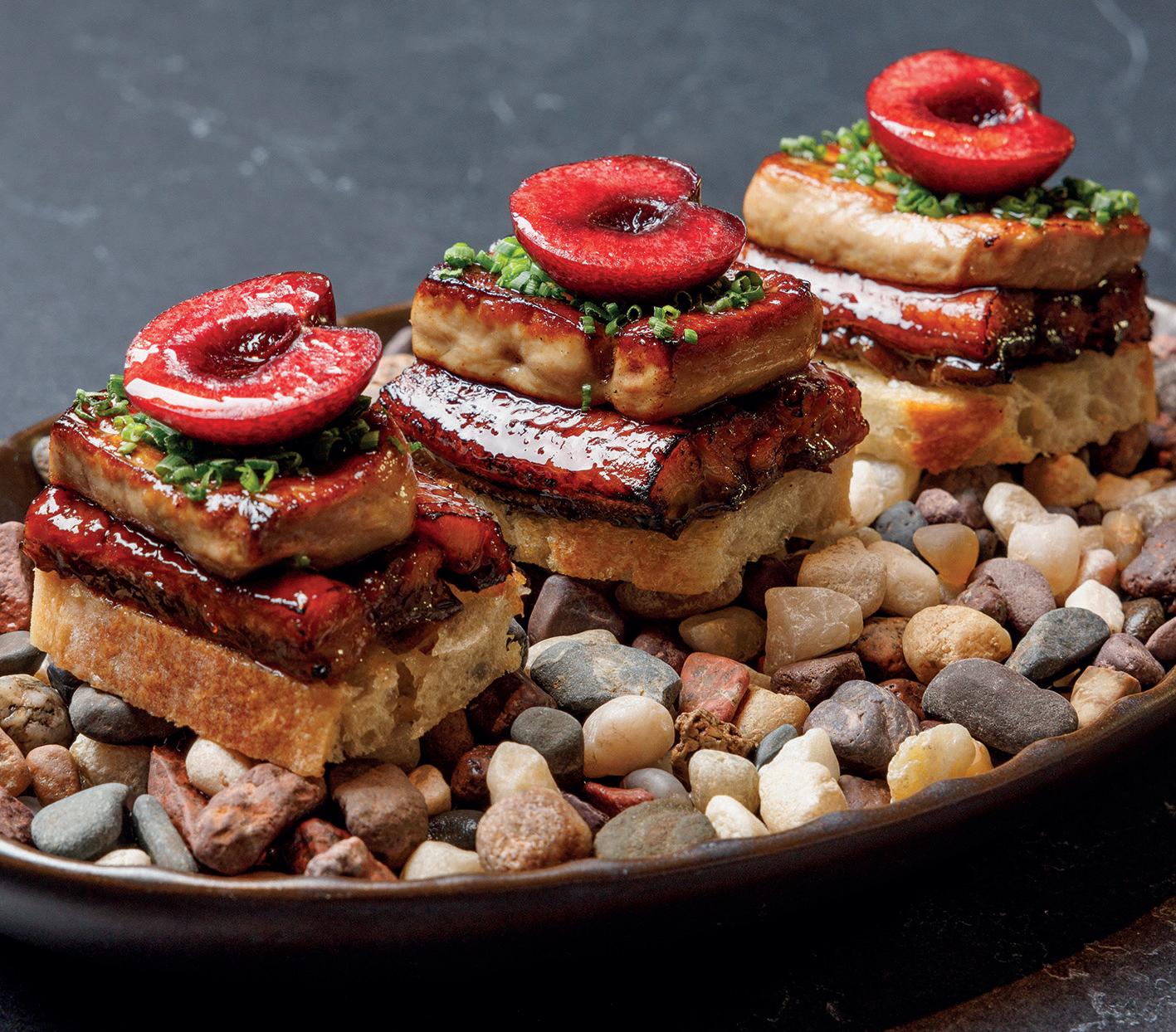

“At the end of the day, we’re in the business of saying yes,” she continues. “Ahmass is 100 percent client-focused. We’re firm believers that you are only as good as the opinion held by the last person you served; you are only as good as the last dish you put out. Everybody in the executive team is dedicated to this sentiment. We’re all industry veterans; everyone has been doing this for 20-plus years, and we would not still be here if we did not love it. We also embrace that we are in the service of people; if you do not have that in your blood then this is probably the wrong business for you.”
Holistic growth
Not everything has been smooth sailing, though. As Susan details, the last two years have been fraught with a host of challenges brought on by the pandemic. For instance, before the arrival of Covid-19, machine orders might have taken a week or two. Now, lead times can take as long as eight months.
In fact, one stove top plancha took ten months to arrive at one of Altamarea’s restaurants, which has forced the group to be ever more dynamic in its approach to
procurement and logistics. “The biggest challenge, however, is the current labor shortage New York City is experiencing,” Susan reflects. “We lost about 250,000 industry people during the pandemic and only about 80 percent of them have returned. So, we are dealing with an industry that has been crippled by Covid-19 in more ways than we can count. Hopefully, people will start coming back in numbers as we head into the fall.
“However, on the whole, I think we are on a good trajectory,” she concludes. “We don’t like to rush innovation or expansion. Instead, we like to pay attention to what is happening right in front of us. I would like to see some growth in our executive team over the coming years because we did shrink quite a bit, adding a couple of key players here and there. But really, we want to maintain our focus and keep it consistent. In the end, that is how you organically grow a business and then who knows. If Ahmass wants to do another 53 opening down the line because it is so popular, then I am game for anything. At the end of the day, we think about growth in a holistic fashion and that is both assuring and exciting, because we’re all about good food, good drink and good company.” ■
www.altamareagroup.com foodchainmagazine.com 123 Altamarea Group
LOVE From with MEXICO,
Why the Ramirez Hospitality Group successfully brought Mexican cuisine to the States

124
There is a Mexican proverb that goes ‘Barriga llena, corazón contento’, which translates to ‘full stomach, happy heart’. This is what you can expect when you visit a restaurant under Ramirez Hospitality Group’s umbrella. The family that owns the business believes in the vision of Jose Ramirez, who brought to life his version of the American dream.
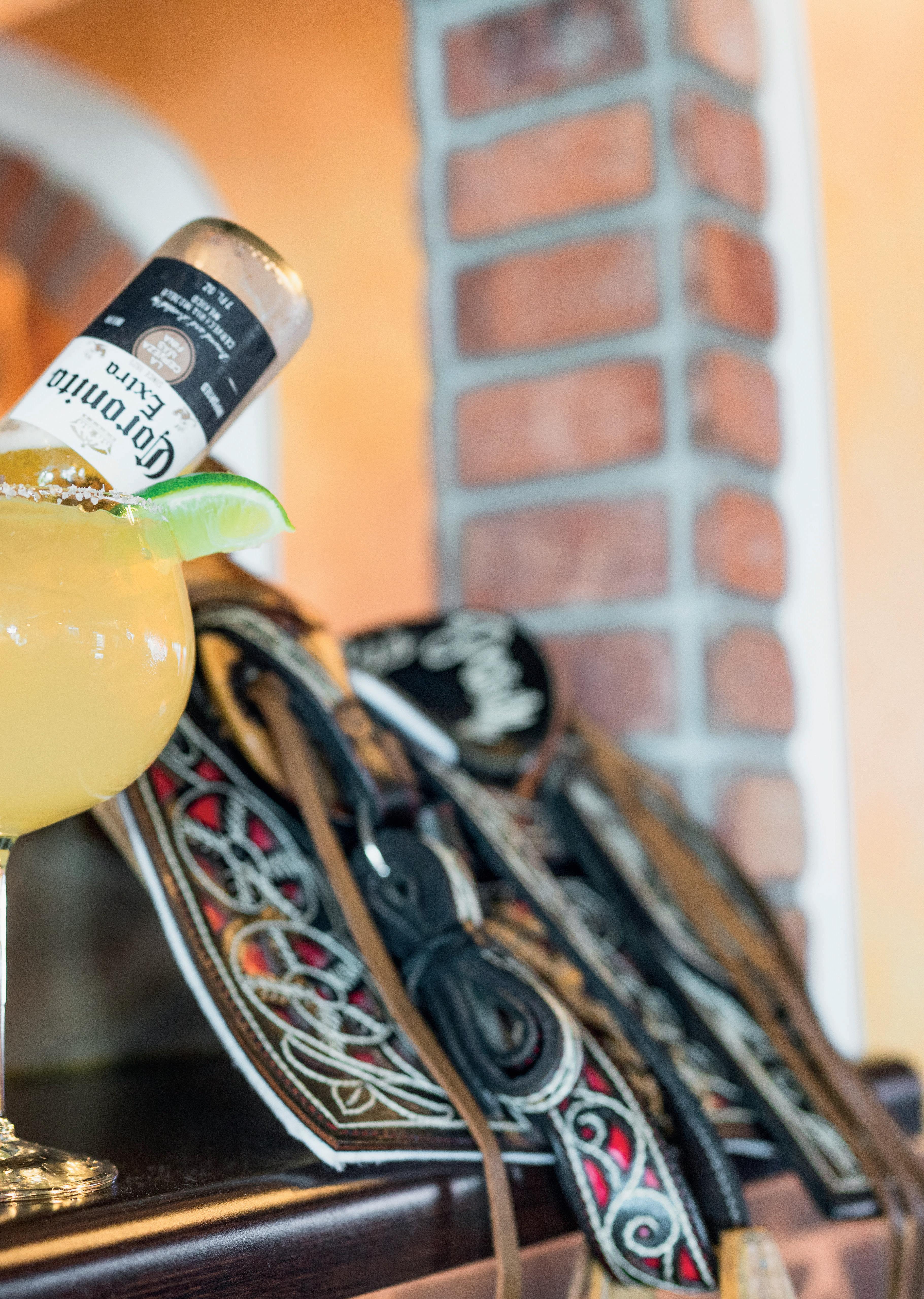
This year, the business celebrates 20 years of that vision. “We have the option for our team to work short-term of course, but Ramirez Hospitality Group really wants to bring out the long-term, the longevity, to make this industry one in which careers are established,” begins Daniel Ramirez. “The restaurant industry can be incredibly rewarding; we have had so many great employees work with us for nearly 17 years,” he says. For him and his brother, Luis Ramirez, who are Co-CEO’s, the essence of the Ramirez Hospitality Group rests in providing the tools for its employees to open their own restaurant or kickstart their own career in the hospitality industry. “We want to be able to bless them, and let them be the best version of themselves, not only with us, but wherever they want to go personally and professionally,” says Luis.
The two wanted to recreate the feeling of experiencing their father, Jose Ramirez’ hometown. Jose worked as a server at Las Palmas, working 60 to 70 hours per week, eventually becoming the Server Manager. Jose saved up
foodchainmagazine.com 125 Ramirez Hospitality Group
“ “ “ “

One night in Mexico, that is what customers can expect from a visit to one of the Ramirez Hospitality Group’s locations 126
enough money to open the first Los Dos Potrillos location in Centennial in 2002, and, having invested everything he had into his restaurant, Jose told the first customers of Los Dos that if they didn’t like the food, he would buy it for them.
Now, with four locations in Centennial, Littleton, Highlands Ranch, Parker, and a fifth on the way, Los Dos Potrillos provides customers in the South Metro area with traditional Mexican food, while maintaining a family-friendly experience thanks to years of hard work by the Ramirez family.
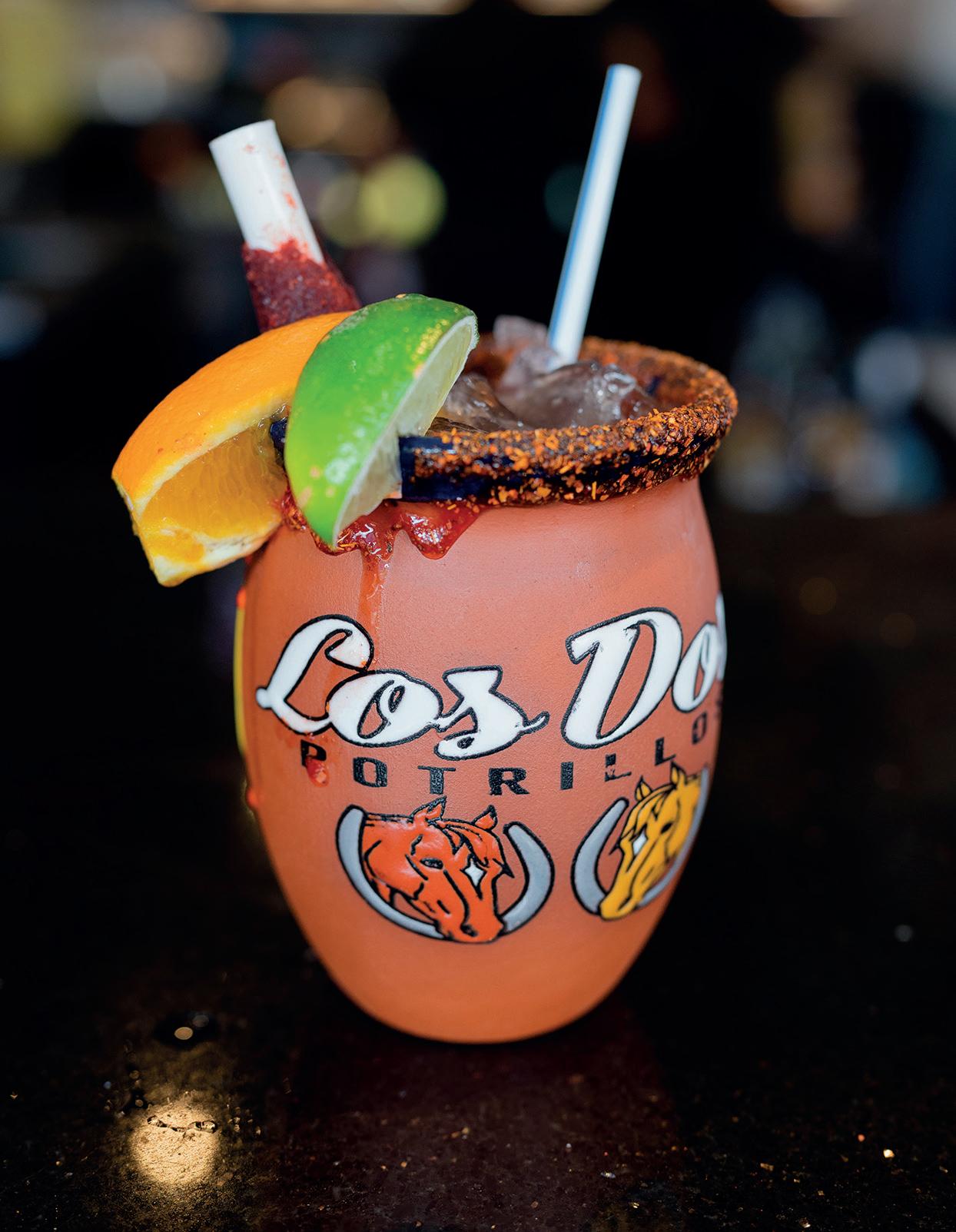
“One night in Mexico, that is what customers can expect from a visit to one of the Ramirez Hospitality Group’s locations. Each one is built on the vision of letting our customers visit Mexico, and offering them the same food we knew as kids. We have a little bit of everything. When you come in, you are going to hear some of the most famous singers from Mexico; the margaritas, the atmosphere, the energy is fun and electric,” expresses Luis.

Daniel takes Luis’ thoughts one step further, saying: “Walking into any one of our concepts is magical. The moment you walk through those doors, you are welcomed home, because we have created a space of community and family, just like the one that we grew up with.”
Future opportunities
We then ask the brothers to share more about the specialty dishes that the business is known for, and the options are endless. “Our number one seller right now is our Carnitas. We make these in a big traditional copper Mexican pot. The chef starts at five in the morning, and it takes about seven hours to make. We also have approximately 13 homemade salsas, and once all those flavors are combined, it is truly something special. Our food is uniquely tasty, and that’s what keeps customers coming back.”
Then, as we hear from Daniel, there is also the company’s renowned green chili. “This is where the Colorado taste comes
foodchainmagazine.com 127 Ramirez Hospitality Group
in. Instead of a flour base, we use a corn starch base, and some other spices I cannot say but you can put that on anything. We put it in burritos, we eat it with a spoon or, in a bowl with a tortilla, and it is home made every single day. We have tortilla makers who produce the best tortillas from scratch every day,” he says.

With a fantastic concept ready to grow, Daniel and Luis are excited about the opportunities that lie ahead, especially the new concept that is set to take off in November

2022. “We have the opportunity to purchase our buildings now, which will give us a little leeway, and serve as an excellent asset when it comes time to opening new locations, like the one in November. We are excited about this concept, Los Dos Potrillos Cocina y Cantina. We have taken the best 50 items from all our restaurants, and those are the items that are going to be on the menu.

Maintaining family values

“In addition to that, we are going to introduce a pickup window, which has come as a result of the pandemic. People don’t like going into the restaurant so they would rather collect their order. We really want to expand this operation across the business, then move it into more locations across the US, and eventually maybe one day head over to the UK,” shares Daniel.
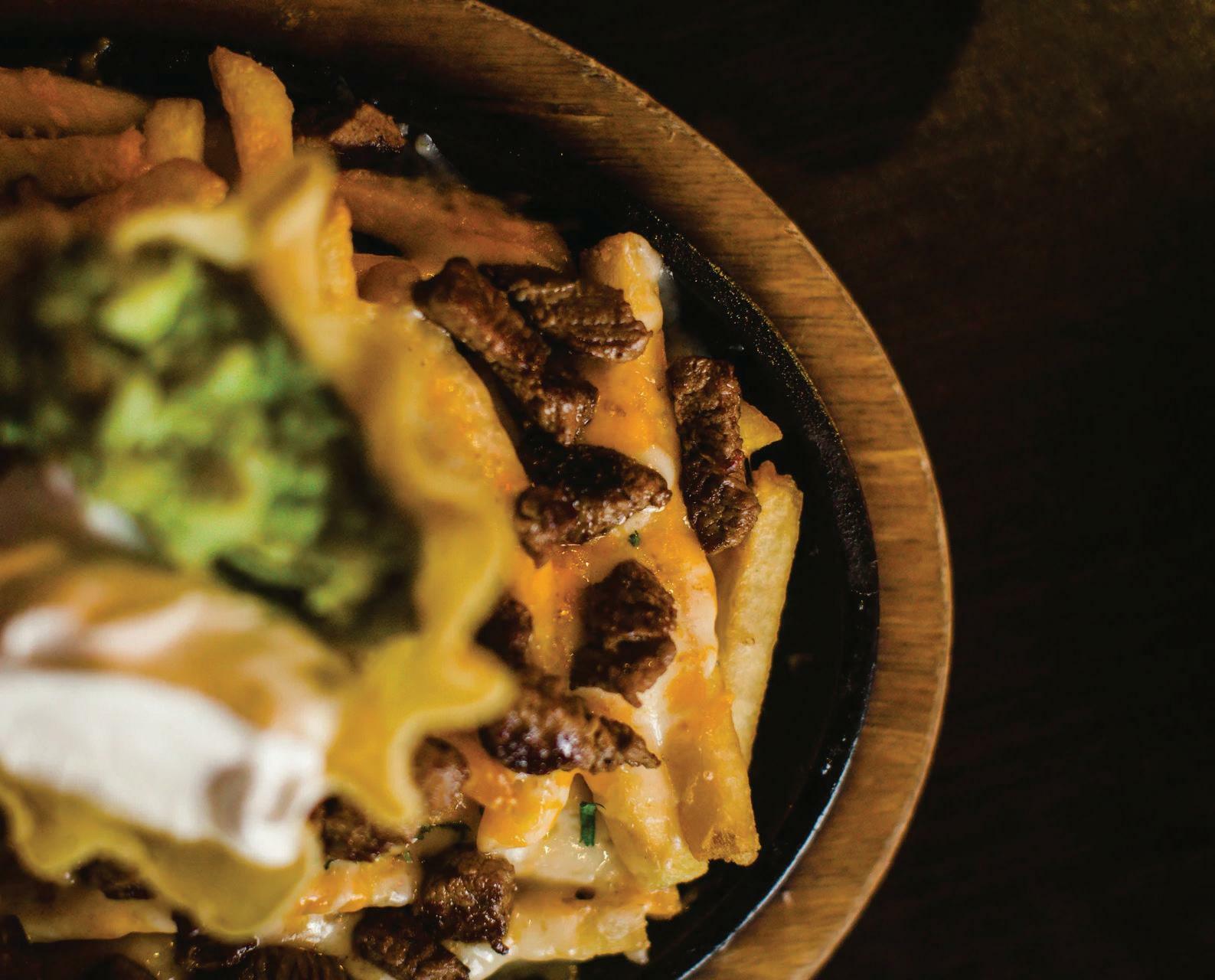

The brothers are excited about where the business is heading, and with goals to have over 200 locations of their new fast casual concept, they want to continue instilling the same values their father raised them on. “Our employees continue to be the best versions of themselves, and because of that, we love what we do and from my perspective, there is no other job I would like to do. I have the best partner in the world with my brother and despite the obstacles that we’ve faced, we always come back stronger and better than ever and we keep that relationship well.”

As young, Hispanic entrepreneurs, the Ramirez brothers are proud to represent their family as first-generation Americans. Therefore, both of them are determined to fulfil their father’s vision of becoming a restaurateur. “Our dad wanted to open one restaurant, and we got to open two, and now we are about to have more than six and it is truly something special we have been able to do,” Daniel concludes. ■
www.ramirezhg.com
Ramirez Hospitality Group 128
Congratulations to






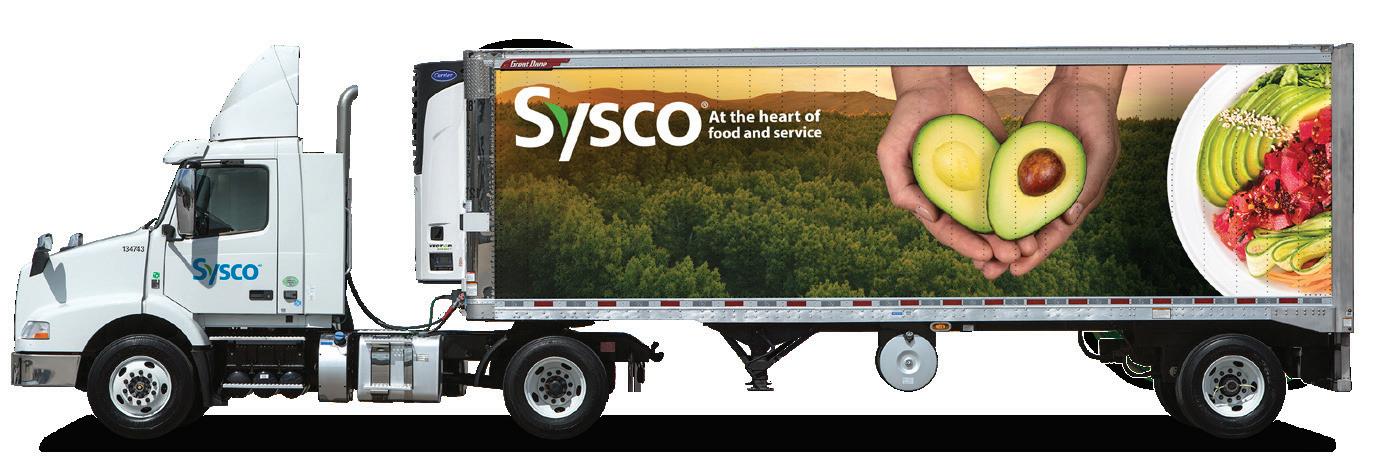
© 2022 All rights reserved. Sysco Corporation 3503806
Dos Potrillos has been providing Denver with exceptional food & service for 20 years!
Los
We at Sysco greatly appreciate our partnership and look forward to many years of continued success.
Redefining a legacy
The unique, game-changing approach to the moviegoing business that is setting Santikos Entertainment apart
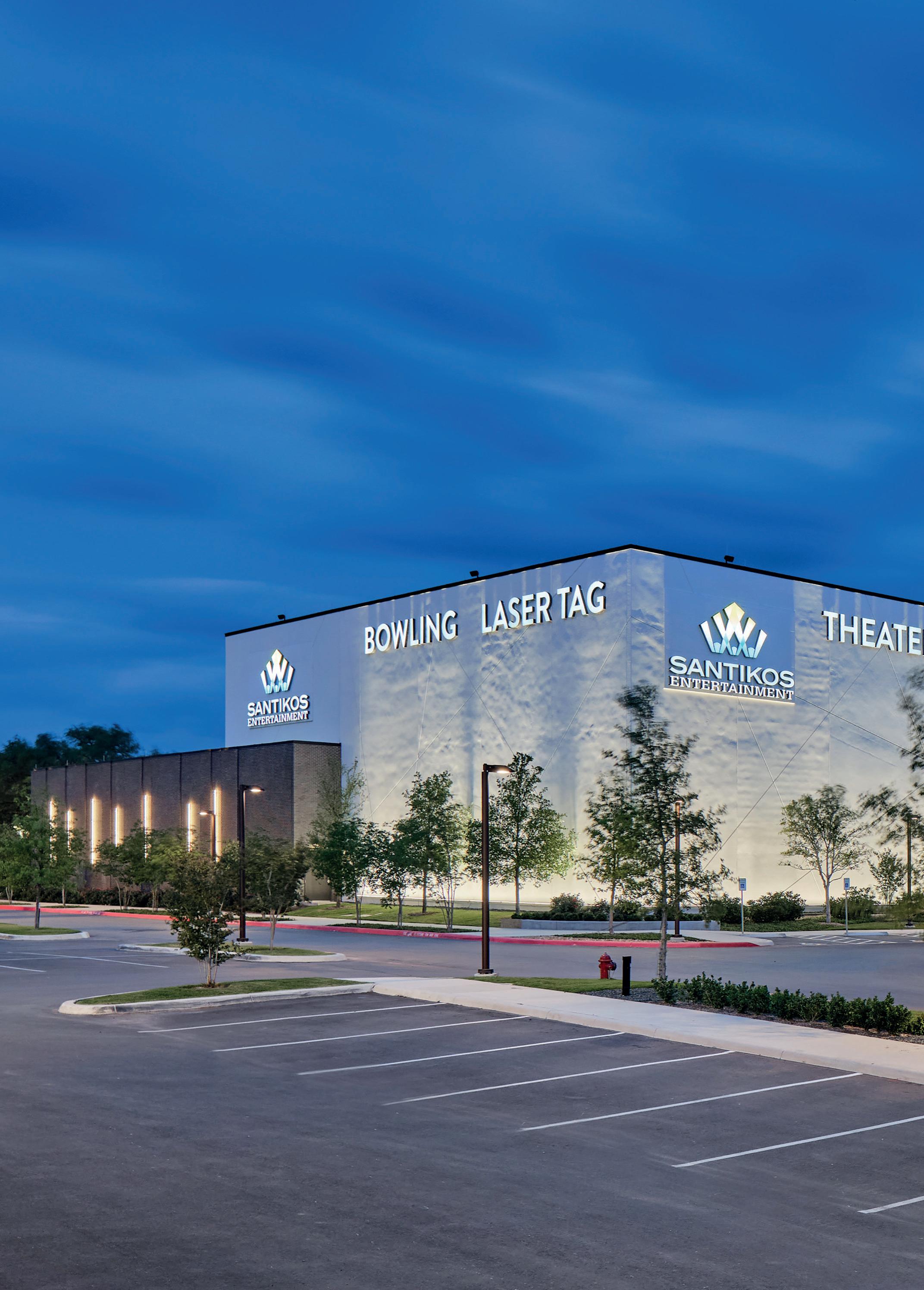
One thing we have learned over the years is that the movies are not dead,” contends Rob Lehman, COO at Santikos Entertainment.
“I have been in this industry for more than 30 years, and fear surrounding streaming and how it might impact the theater business is not new. First, there was VHS, and then Blockbuster; next came home theaters, then Covid-19 and Netflix. There has always been some threat. Soon there will be another.
130


foodchainmagazine.com 131 Santikos Entertainment
“ “
“ “
“However, what we have learned, especially over this past summer with Top Gun: Maverick, is that if Hollywood continues making great movies, then people will keep coming,” he goes on. “People want to enter a dark auditorium and get lost in the magic. You do not get that experience with streaming.”
Since 1911, Santikos Entertainment (Santikos) has been helping people get lost in the magical stories of the big screen across the state of Texas. Just as beguiling, though, is the Santikos story itself. So let us tell it.

Louis Santikos, who would later give the company his name, left his home in Athens, Greece, for central Texas at the young age of 19. He picked up some work in a local grocery store, and while he was stocking the shelves, he noticed a long line of people waiting outside the Rex Theatre across the street; smiles adorned faces and lips let out hushed whispers of anticipation. In 1911, after saving whatever he could, Louis was able to buy that very theater and thus began a legacy.
Louis’ son, John L. Santikos, would take that seed and nurture it over the coming decades. One theater quickly became two, then three, and the Santikos name was soon written in bright lights across more than a dozen locations. By merging cutting-edge technology with a comfortable and welcoming atmosphere, conjured by pre- and post-movie chatter over a drink at one of the

There are community parks, basketball courts, food banks, and hospital rooms all across the region with John’s name on them. We are the community movie theater chain here in San Antonio
132
many bars featured at Santikos venues, John established the brand as the leading theatrical experience in the Texas area.
Movie-star legacy




Though John passed away in 2014, the legacy that his father started and that he helped blossom is still alive, and, more importantly, it continues to help others. On his passing, John gifted the bulk of his estate to the San Antonio Area Foundation. Beginning in 2015, the John L. Santikos Charitable Foundation has distributed millions in grants and scholarships to support specific areas of interest John had. These include people in need, enhancing health and wellness services, providing youth with education opportunities, creating vibrant arts and culture programs, and offering services that have helped improve the quality of life for people living in the region since 1964.
Ben E. Keith
At Ben E. Keith, we believe in the value of consultation on a personal level. It is difficult to add true value for operators as a foodservice distributor, if we are not on location to help diagnose the underlying causes of the issues that we are working to help create solutions for. Our 116-year history has been built on forming meaningful relationships that foster genuine business partnerships. The result of those partnerships is to properly supply our customers with both product, and valuable tools and information that help them realize their ultimate goals.




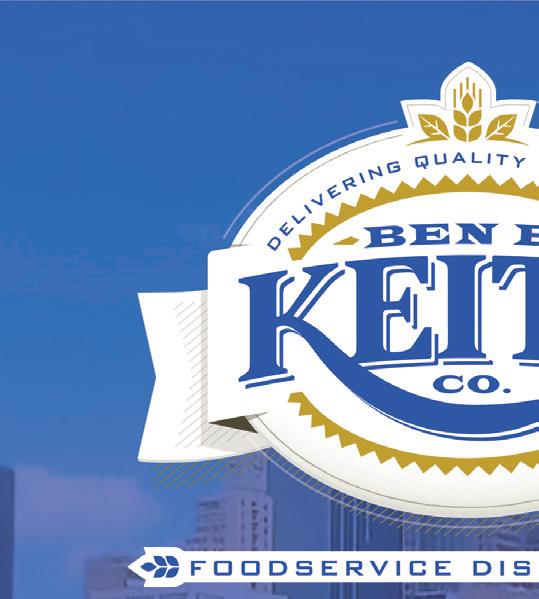
foodchainmagazine.com 133 Santikos Entertainment
As Rob points out, that means profits from every purchase made at a Santikos location goes directly to fund charities that benefit local people in need. “Since John passed away, we have given over $70 million back to the San Antonio area, and if it were not for Covid-19, that number would be higher,” he reveals. “There are community parks, basketball courts, food banks, and
hospital rooms all across the region with John’s name on them. We are the community movie theater chain here in San Antonio.
“John left a truly staggering legacy,” Rob continues. “Currently, we have ten theaters here in San Antonio. We have carved out a 55 percent share of the box office market in the region. Indeed, we operate the number one and number

134
two theaters in Texas in terms of box office gross. If you look at the US as a whole, these locations represent the country’s tenth and fourteenth biggest theaters. Fortunately, all that success means we can continue doing even more for our communities.”
Rob joined Santikos in 2017 after running successful food and beverage departments at two different theater chains, bringing with him a wealth of experience and fresh ideas. As he notes, food and beverage sales play an

integral role in the success of movie theaters. When Top Gun: Maverick was making waves and breaking box office records, Rob explains, the studio behind the picture was taking 65 cents off every dollar Santikos made. However, food and beverage sales buoyed by the film meant the theater chain could also partake in its success.
Streamlined snacks
With that established, it is not surprising then that when Rob joined Santikos, first as Senior VP and in his current role as COO, he wanted to take the company’s food and beverage department further. He has done that by implementing a more streamlined approach to food service and delivery.
Cheeseburgers, mozzarella sticks, fries, and nachos are all in the hands of a young theater clerk calling out an order number without much clue about what is happening. It all sounds too familiar to those in the theater game. Enter the APEX system.
“To give you an idea what APEX is, let us run through a typical order at one of our theaters,” details Rob. “You walk up to the concession stand and you order popcorn, soda, and a cheeseburger. First, we will give you your popcorn and soda and then take your phone number. The remainder of the order goes back to the kitchen, where it is prepared with care. Then, when it is ready, we will walk your food to a locker, put in the order number, and then send you an automatic text message with a barcode. You can scan the unique barcode at the locker, and the door holding your food will open.”
“Working with Apex has been a long process,” he adds. “We had to integrate it with our Vista software program, but it has since worked really well. Another thing that might not be apparent initially is the labor savings it offers. With less time serving customers, our employees can spend an increased period of time making the food even better in the kitchen before simply walking over to the
foodchainmagazine.com 135 Santikos Entertainment



136
lockers and then moving on to the next order. APEX has definitely been the biggest thing we have done in the last five years.”
More than movies
Alongside self-serving popcorn warmers with a built-in buttery topping dispenser, Santikos has also ventured into high-end cinema experiences by investigating the viability of dine-in settings. To give some context, it is worth having a taste of the kind of foods on offer: traditional and boneless wings served with BBQ, buffalo, lemon pepper, or sweet and spicy sauce, epic nachos topped with either spicy beef or chicken, as well as melted cheese, pico de gallo, sour cream, and jalapeños.
Then there is the California burger and its vegetarian equivalent, which tops a patty with fresh guacamole, pepper jack cheese, lettuce, tomatoes, and pickles. Harking back to the Santikos name are Greek gyros, a mix of lean beef and thinly sliced lamb, red onions, and fresh tomatoes served with warm tzatziki-coated pita bread.
“In terms of dine-in theaters, we have The Mezz Experience at the Palladium, which is our number one location,” says Rob. “Upstairs, our four big auditoriums were remodeled in 2017 to see how a dine-in experience would play out in the final two rows of the screen. Though that is the only example we have continued of its kind, it is truly a sight to behold. At The Mezz, you will find a well-stocked craft bar and a beautiful entranceway, and then once you enter the screen, a pod seat awaits, offering privacy and comfort all at once. It offers an incredible way to watch a movie.”


That is the business Santikos is in: finding new and innovative ways to tell stories on the big screen. As our conversation draws to a close, Rob is keen to echo this point, highlighting that the company is determined to change how future theaters will be built.

“It is no secret that we have a lot of screens on this side of town,” he says. “So, we wanted to do something different for our next venture. We started hammering out ideas, probably over several pints of Legacy Lager (our own Santikos house beer, which was created in collaboration with Freetail Brewing), and what we came up with is truly exciting, and it is starting this month. We will create a whole new destination that people will want to spend time in across nine auditoriums, 14 lanes for bowling, over 50 arcade games, party rooms, two VIP theaters, and a bar.
“With these high-end theaters, we are changing the whole model,” Rob concludes. “Santikos is now an entertainment business, which does not just mean movies anymore. Come to some of these theaters and go bowling, play arcade games, or just sit at the bar with a cold beer and watch some sports on our TVs. Times are changing. I am excited about where we are headed over the next five years and how John’s legacy will grow.” ■
www.santikos.com foodchainmagazine.com 137 Santikos Entertainment

138
AT HEART
From humble beginnings to a California community - how Superior Grocers has become a cut above

Superior Grocers (Superior) opened its first store in Covina, California in 1981. Since then, it has grown to encompass 70 stores throughout Los Angeles, San Bernardino, Riverside, Orange County, Ventura County and the outskirts of southern California. One of the largest independently-owned chains of grocery stores in southern California, Superior’s philosophy is to offer the highest quality products at a value with exceptional customer service. Shoppers can always count on excellent quality, variety and value when shopping at Superior.
In addition to celebrating its 40th anniversary last year, in 2021, Superior’s charismatic CEO and Founder, Mimi Song, was inducted into the Food Industry Hall of Fame. Executives and industry insiders said it is a well-deserved honor for Mimi, who as a young woman, in 1977, immigrated to Los Angeles from South Korea. From her first job as a cashier at a Korean grocery store in Los Angeles, Mimi founded Superior with a single former Smith’s Food King store in a less than
Superior Grocers foodchainmagazine.com 139
prime location. She came to the US with no experience of the industry but through hard work, dedication and determination, she and her team have grown the business to where it is today. Universally admired for her attitude, energy, work ethic and emphasis on teamwork, Mimi’s attributes are reflected in the company’s core values of integrity, service, passion and excellence, which have undoubtedly, helped to secure Superior’s success.
Today’s Superior team, headed by President, Rich Wardwell, alongside CFO, Blake Larson, VP of Marketing, Dale Nakata, VP of Grocery, Sally Hernandez, VP of Produce, Jon Holder, VP of Meat, Mari Mani, VP of Bakery & Hot Foods, Agustin Cabrera, VPs of Operations, Miguel Alarcon and Micheal Hilton, VP of
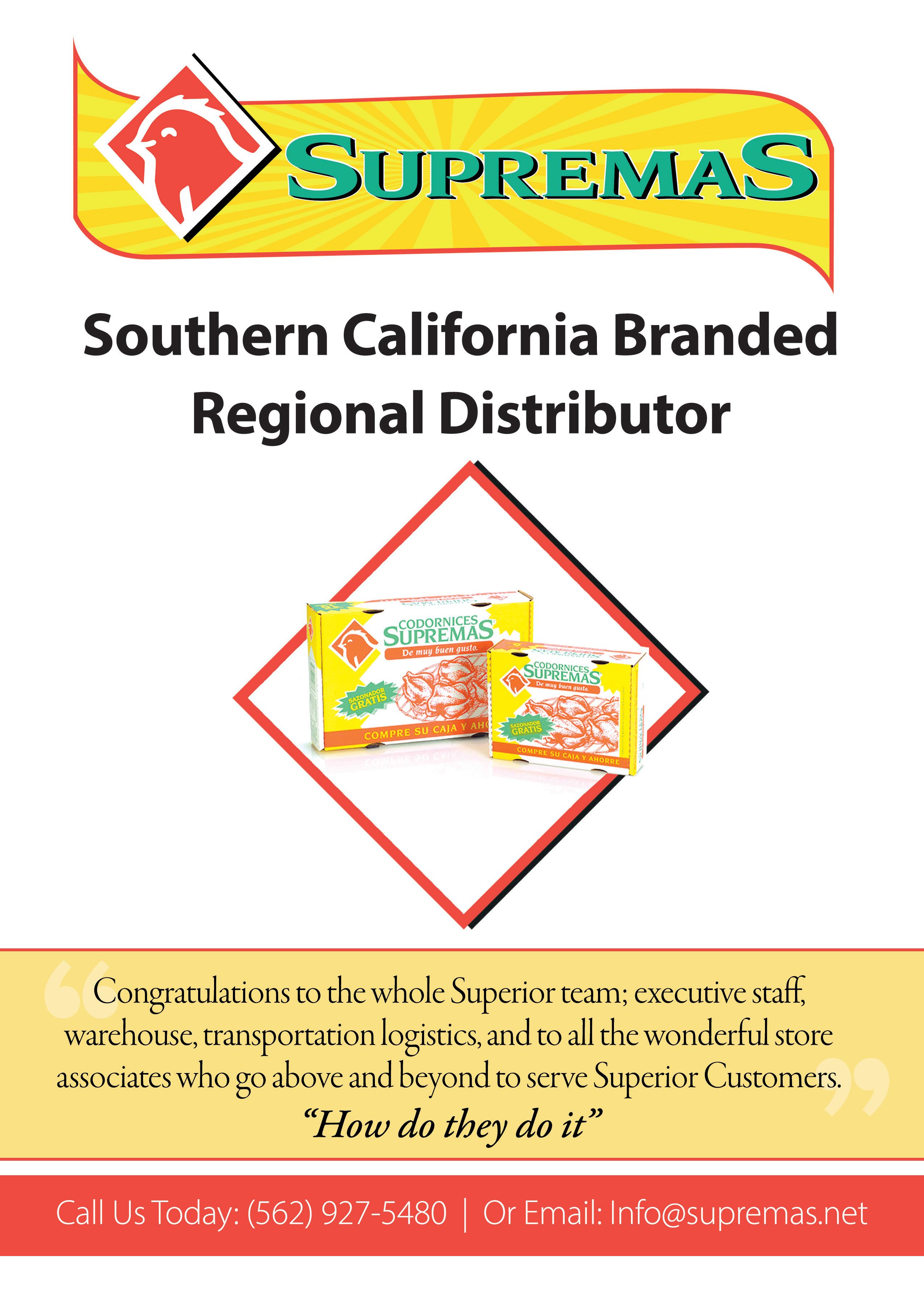

VP of Distribution, Mark Harding, VP of Facilities & Construction, Leon Lopez, VP of Asset Protection, Darian Griffin and VP of IT, Bob Ing, continue to champion those values. As Rich says: “We are dedicated to building a community of loyal customers, vendors and staff where food shopping is fun and the spirit and love of family guide our actions.”

Acquisition strategy
Superior is proud to have prospered in neighborhoods where others have tried and failed, and this success seems due to an inherent commitment to, and investment in, the communities it serves. Almost all of Superior’s stores are in markets that serve the Hispanic community. As an immigrant, Mimi’s special allegiance and responsibility to other
140



“ “
Superior is proud to have prospered in neighborhoods where others have tried and failed 142
“ “
With five new location sites currently under construction, Superior opened a new store in September and will open another one in November. As Rich expounds: “We will also be looking to advance our brand offering into neighboring states. Our goal is to be at 100 or more stores by 2025 and with the recent acquisition of Numero Uno, we are well on our way.”
Mission Foods & Guerrero Tortillas Zero Net Carbs Tortillas

To meet the needs of health-conscious consumers, tortilla and wrap brand Mission Foods has introduced Zero Net Carbs Tortillas that also contain zero sugar, as well as being keto-certified, high in fiber and low in calories. Made with high-quality ingredients, the product line comes in two varieties: original and sundried tomato basil, the latter featuring zesty sundried tomatoes and fresh basil flavors. The launch is particularly timely, as consumer research reveals that more than half of shoppers are seeking foods with less
Superior takes great pride in the abundant variety of freshly prepared products found in its bakery, meat and seafood concessions. “We sell a wide assortment of products but mostly cater to the Hispanic communities in which we operate,” explains Rich. “While we offer select products, such as grass-fed, choice beef and a variety of over 40 organic
sugar, and more than a third are looking for fewer carbohydrates on nutrition labels. Guerrero Tortillas, the brand known for inspiring traditional Mexican home cooking with its tasty tortillas, tostadas and snacks, is bringing you a new line of better-for-you products that don’t sacrifice the authentic flavors you love and enjoy: new Zero Net Carbs Tortillas. Keto-certified, zero sugar and high in fiber, the Zero Net Carbs Tortillas are currently rolling out nationwide. These tortillas are available in two, mouthwatering flavors: the original customers know and love, and tangy, smoky chipotle.
Superior Grocers foodchainmagazine.com 143
produce items, our power actually lies in our basics. With over 400 produce offerings, including a wide variety of service meat, seafood products and our popular in-house tortillas and chips along with a full-scratch bakery producing fresh pan dulce and cakes, our emphasis is always on delivering quality, variety and value.
“We are also continuing to add ‘better for you’ products to our offering as part of our commitment to improving the health of our communities.” Indeed, Superior makes
it easy to eat healthily by offering fresh produce, lean proteins and wholesome grains; all at affordable prices. A broad range of healthy food choices and education surrounding how to create and maintain a tasty, healthy diet are all part of how Superior contributes to the health and wellness of its customers. Community health fairs take place at all stores throughout the year. These events provide free health screenings and offer awareness and disease prevention education to empower customers to make the best nutritional choices and to keep communities thriving.
“ “
In addition to beautiful, spacious stores, filled with fresh foods, Superior also offers services to support the local community. One of Superior’s core values is placing a high priority on exceptional customer service. That is why the business offers a range of
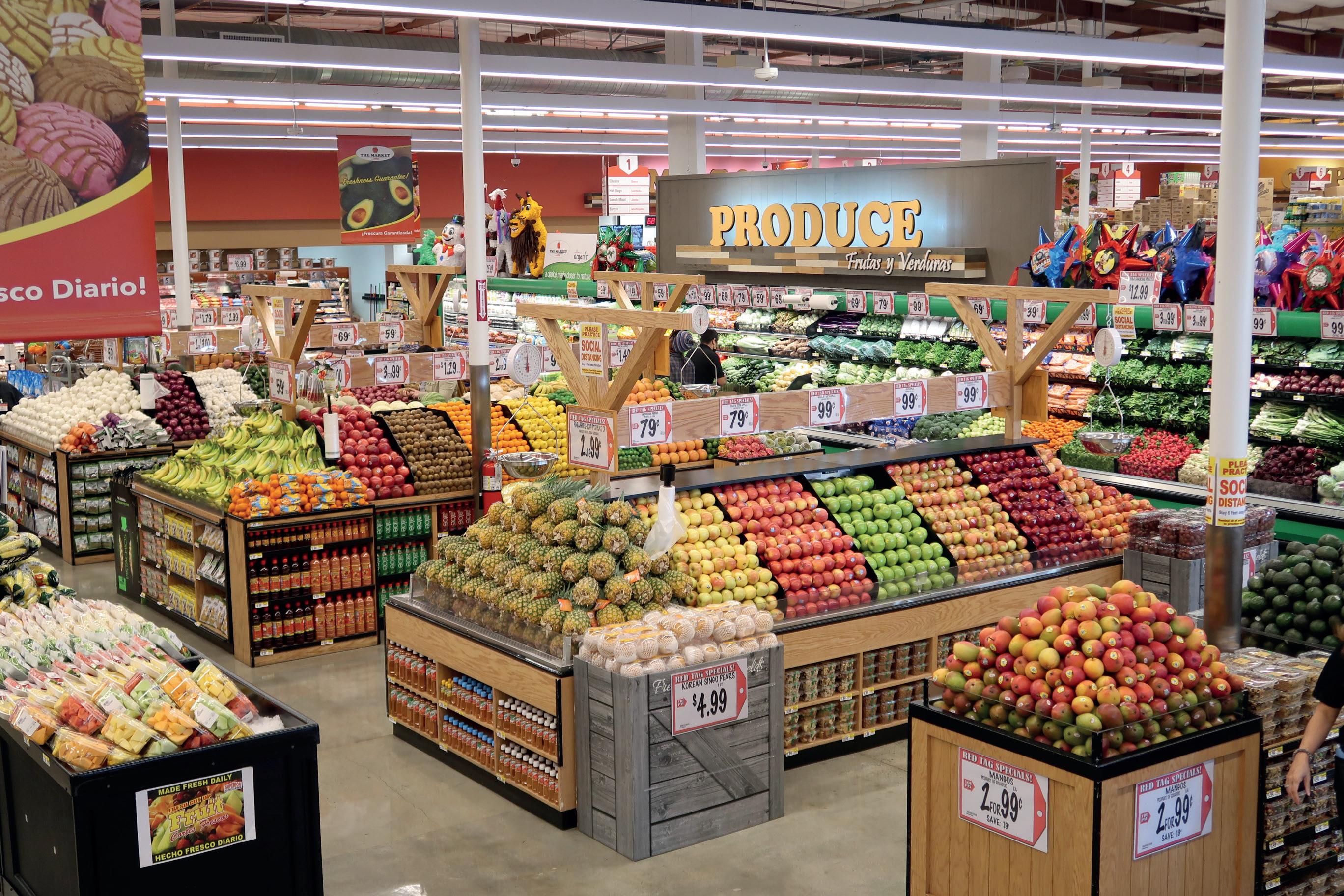
We have always been focused on service and the delivery of a frictionless shopping experience
“ “
144
services to satisfy its customers’ additional needs. From utility bill payment processing and money transfer services to check cashing and ATMs, Superior takes the time to invest in its community and ensures that all people are served equally with care and respect.
Community support
Like many other businesses, Superior was heavily impacted by the Covid-19 pandemic. “We had to change the way we did business overnight,” says Rich. “We had to meter people at the door, operate every other check stand, deploy six-feet social distancing at all service counters and we had to stop and sanitize surfaces every half an hour. In order to make sure our employees were safe, we put

up barriers at service counters, rearranged break rooms, set up outside areas and hired companies to come in and regularly sanitize the stores. All self-service areas had to be manned in order to meet the customers’ needs and we changed operating hours to service the elderly in our communities.”
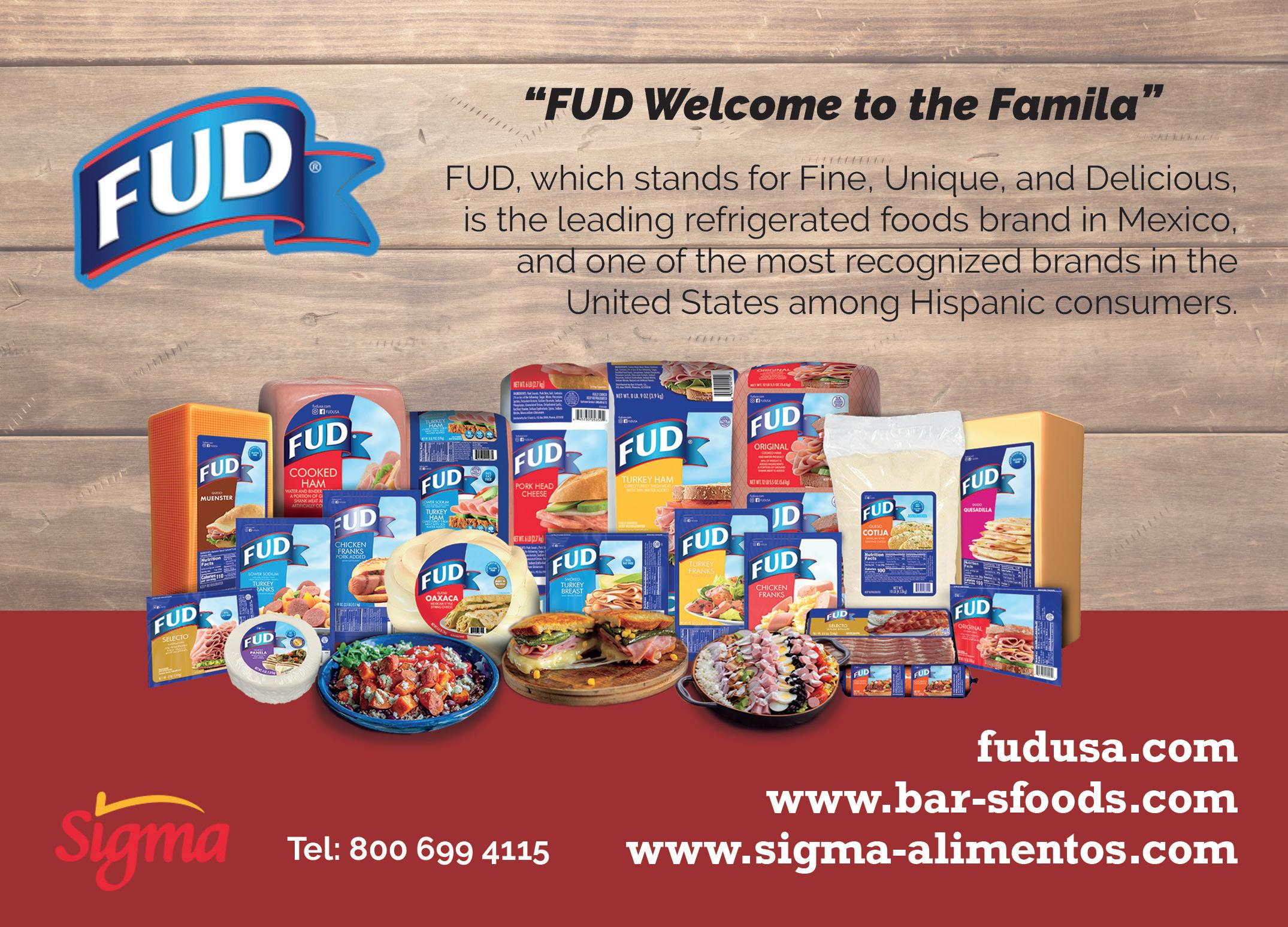
Superior Grocers foodchainmagazine.com 145
As Rich goes on to discuss: “We have always been focused on service and the delivery of a frictionless shopping experience. While our stores boast self-checkouts, in-stock conditions and full-service specialty departments, we obviously had to pivot drastically to be able to meet the needs of our communities during that incredibly difficult time.”

Shared values

Furthermore, as Rich continues: “We feel we will continue to grow as the go to place in the communities we serve. There is nothing more important to us than the people that serve at our stores and the customers that allow us and trust us to serve them. We treat each other as we would like to be treated ourselves.”
Superior knows that a community is strongest when it builds from within and the organization wholeheartedly believes that children are the future. That is why Superior’s non-profit organization, Community Re-Engineering Inc. was established in 1995. The Superior foundation helps fund local youth programs that make communities thrive. Proceeds totalling over $3.5 million dollars from the annual golf tournament under the non-profit organization have been distributed to local youth programs and schools. The organization’s vendor partners have been instrumental in helping Superior to achieve this goal through their generous support and participation. From the California Grocers Association Educational
146
Foundation to City of Hope, numerous partner organizations have received Superior’s support and share in its values of providing exceptional education and health programs.
True partnerships
Rich goes on to explain that Superior gives back to the local community through its education and arts foundation. “Most recently, we provided a local school with backpacks for all the children. We also offer scholarships through the Western Association of Food Chains and the California Grocers Association.
“Additionally, we are proud to support our employees by providing educational support; an example being the opportunity to earn a retail management certificate from Cerritos College. We also just completed our Inaugural English at Work program. This program aims to help our employees in their everyday lives by providing them
with a laptop and the educational provision of English classes. We understand that a job is about more than just a pay check; it’s about respect, recognition, professional growth, and the ability to provide for loved ones. We’re committed to providing career development opportunities in addition to competitive wages and a comprehensive benefits package.”
At Retail Merchandiser, we get the sense that working at Superior is about joining a family of people, committed to excellence. We begin to understand that people are Superior’s foundation. Mimi’s visionary leadership enables Superior’s management, employees, customers and vendor partners to work together and create true partnerships in their southern California communities. ■
www.superiorgrocers.com



Superior Grocers foodchainmagazine.com 147
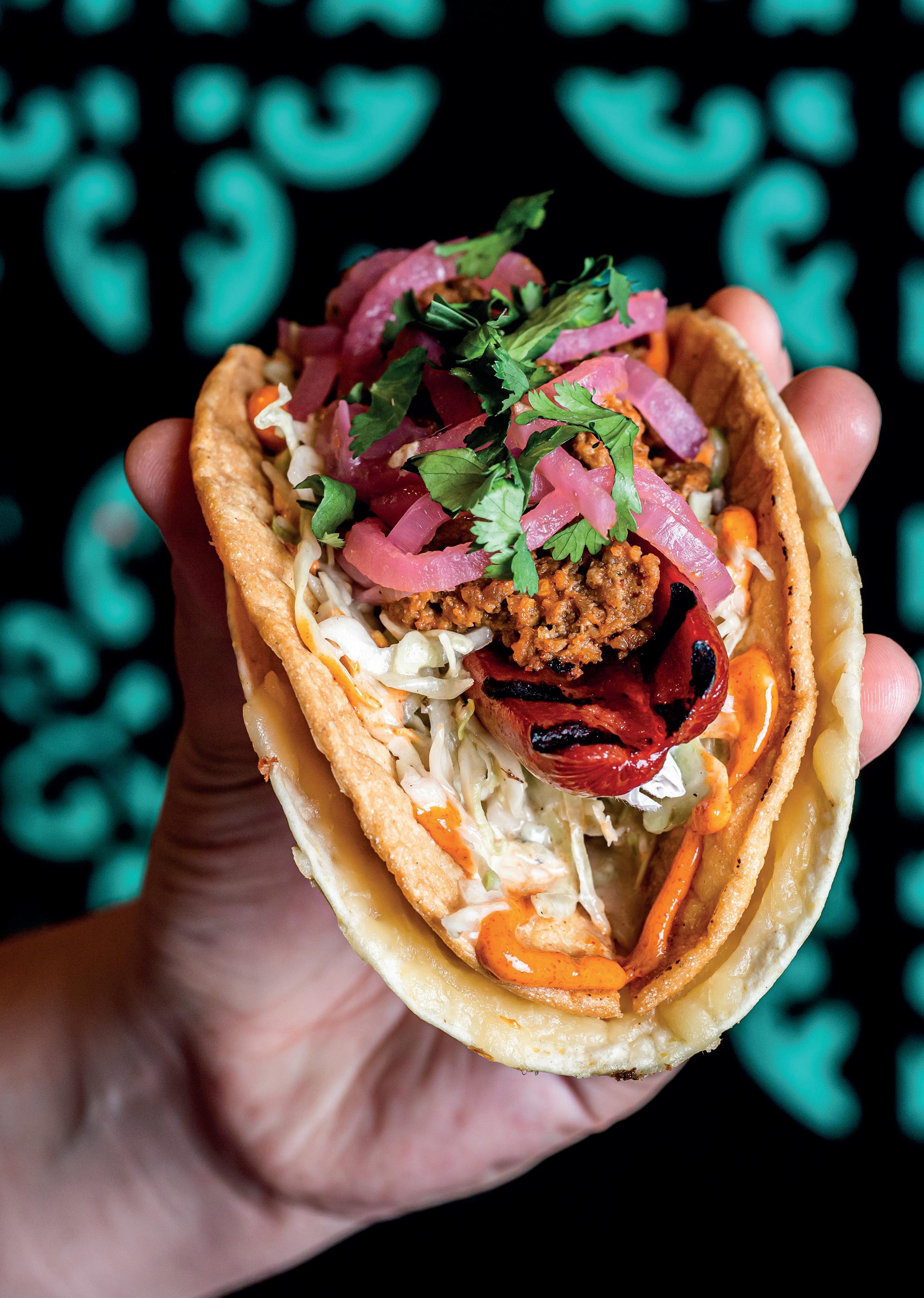
▲
148
Tijuana Tommy Taco
A NEW NIGHT OUT
The origin of the name Paladar is important to us,” begins Andy Himmel, Founder and CEO at Paladar Restaurant Group. “It comes from the Spanish word for palate or taste; however, we chose the name because, in Cuba, a paladar is a home eatery or small restaurant based out of someone’s house or apartment. Therefore, when we wanted to open a restaurant, we knew it was the name for us. Our customers come home to eat.”
Thus began the Paladar Restaurant Group. The company was established in 2007 with Paladar Latin Kitchen and Rum Bar (Paladar) in northeast Ohio and suburban Cleveland. Since then, new restaurants have cropped up near Washington, D.C. and in the metropolitan Philadelphia market. However, before all that, the group wanted to create an experience that the average suburban diner would not usually have access to (unless they travelled to a nearby city, for instance).
 Have a taste of Paladar Restaurant Group’s delectable international tour de force of South American and Caribbean cuisine
Have a taste of Paladar Restaurant Group’s delectable international tour de force of South American and Caribbean cuisine
foodchainmagazine.com 149 Paladar Restaurant Group
As Andy goes on to explain, most restaurants dotted around the area at the time were American, Italian, or Chinese –and, therefore, much more accessible and straightforward to the average consumer. One knows the difference between carbonara and chop suey. But what about feijoada stew and queso fundido? Not so easy.
“ “
“There was nothing around that seemed to take advantage of the great flavors and profiles that are found in Central and South America, Cuba, and the Caribbean,” says Andy. “So, in that sense, we were looking to create a new night out for suburban diners. We opened up Paladar, working extremely hard on the brand, the positioning of the menu, the marketing, and the terminology used since, in many cases, these words on the menu would be totally new to customers. Part of that process was therefore educational, and our goal was to showcase the hearty, soulful, and craveworthy food from that area of the world in an accessible way.”
Therefore, instead of listing a guajillo pepper sauce on the menu, Andy says it will
read spicy pepper sauce instead. “When we began, we were much more direct with the types of ingredients that we were using in our restaurants, using Spanish headers and such,” he reveals. “However, we found that this created a kind of barrier. That is not to say we are dumbing down; rather, we are simply making the menu approachable. We had to make our menu function in a way that did not make people turn away and order a steak elsewhere, but also read in a way that was still exciting for more adventurous eaters.”
“ “
Indeed, eight years after the first Paladar, a sister brand, Bomba Taco + Bar (Bomba), was launched. More casual in its approach, three more locations have opened in the suburban Cleveland market and two in the metropolitan Philadelphia region.
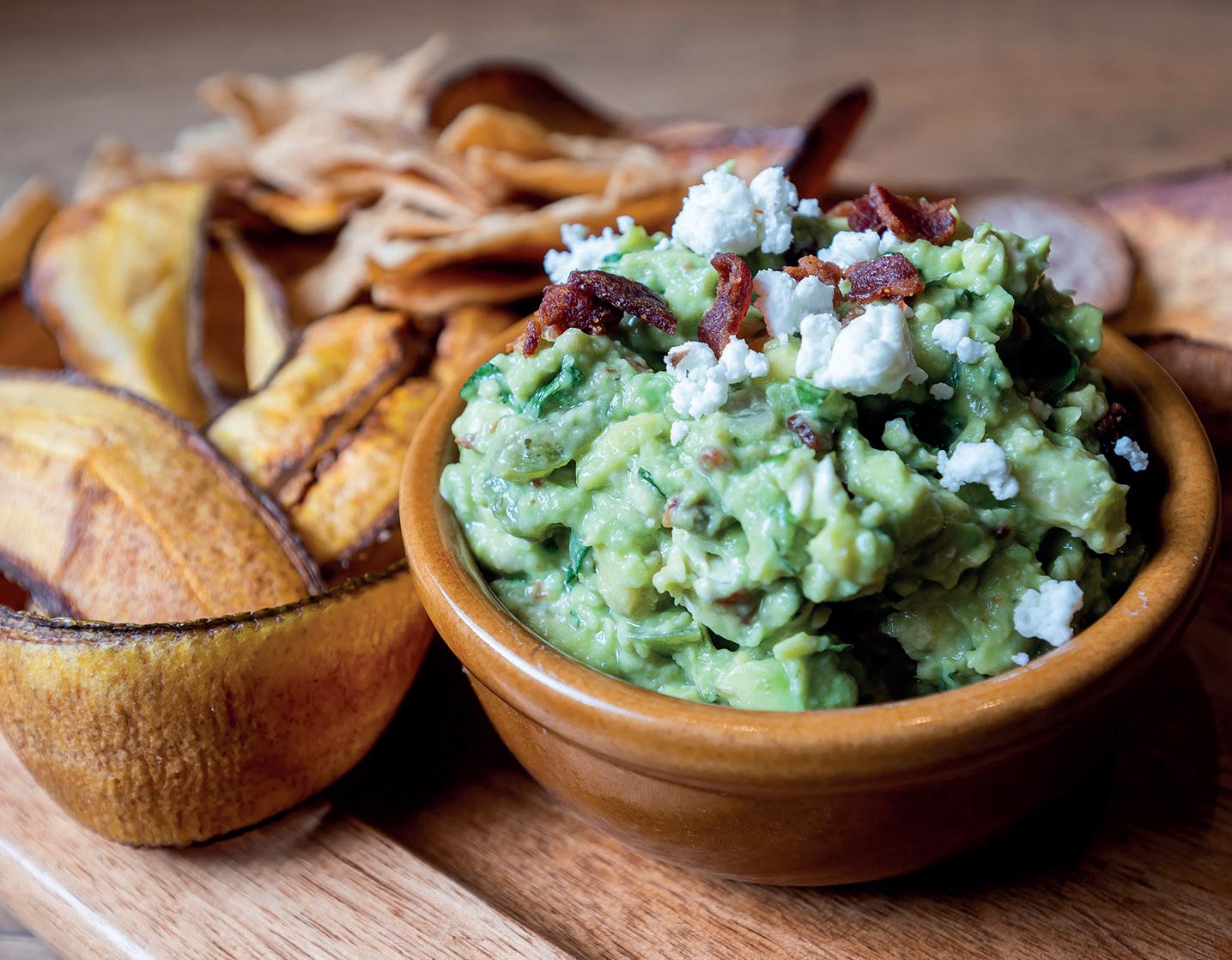
Andy is keen to talk us through Bomba’s cuisine. “We are a taco-based menu,” he notes. “That being said, we do not hold ourselves back with any type of international borders: some of

▼
Craft-your-own Guacamole
▼ Pomegranate Ginger Margarita
150
. . . we recently won the award for Best Guacamole in Philadelphia
our best-sellers are the Nashville Hot Chicken Taco and our Vietnamese Meatball Taco! We also proudly cater to the vegetarian and vegan communities, serving delicious, plant-based chorizo tacos with pickled onions, mushrooms, pickled shishito peppers, and cilantro pesto.”

Rum discovery
Other highlights include the curious Smoked Brussels Sprouts Taco, served with pickled red onions, umami sauce, red Fresno peppers, chili aioli, and plantain peanut crumbs, as well as Bomba Bowls, which include a choice of protein, a selection of toppings, and either white or cauliflower rice.
But, for Andy, a special focus should be placed on the brand’s famous guacamole. “It is house-made and fresh to order; you can also add other ingredients, which is a concept borrowed from our Paladar side of the business,” he reveals. “In fact, we recently won the award for Best Guacamole in Philadelphia at a big annual event hosted there for the fourth year in a row! We serve it with a mix of house-made malanga, plantain and tortilla chips. Delicious!”
As well as snacks like bacon-wrapped jalapeños and harissa cauliflower wings, Bomba also serves incredible desserts.
One is the new churro waffle, made from scratch with house batter and served with unique toppings such as burnt marshmallows, bacon, and ice cream. While the conversation then drifts to food under the Paladar brand – including chicken empanadas, adobo steak and blue cheese, and shrimp elote salad – Andy highlights what he considers to be the truly fun part of the brand: the rum bar.
“Each Paladar restaurant has 100-to-130 rums on hand, and all of the information you need to make an informed decision is handily kept in our Rum Bible,” he tells us. “We are really proud of it. It walks customers through the process of making rum, the locations behind each brand, and the various histories attached to them – it is educational as well as a guide to a good drink! Whether Spanish-, French-, or English-style rum takes your fancy, the thrill of discovery can be found in every bottle and each glass.”
More Bomba locations
Some favorite cocktails include the Jungle Bird (Smith & Cross Rum, LoFi Amaro, honey simple, lime, and pineapple juice), Pusser’s Painkiller (Pusser’s Navy Rum, Bacardi

foodchainmagazine.com 151 Paladar Restaurant Group
▼ Smokin’ Brussels Taco
“ “

“ “ Each Paladar restaurant has 100-to130 rums on hand 152
Mango Rum, Smith & Cross Rum, fruit juices, coconut milk, and nutmeg), and the tequila-based Jalapeño Paloma (El Jimador Silver Tequila, jalapeños, grapefruit juice, simple syrup, soda, and salted rim to serve).
Going forward, Andy admits that, though he expects to open a new Paladar every two years, the real driving force behind the growth of the group will be its Bomba offering. “The more casual approach is aligned with the market, which
BOUNTY rum is produced by St Lucia Distillers, which is located in the scenic and agriculturally rich valley of Roseau, on the Caribbean island of St Lucia. BOUNTY, also known as ‘the spirit of St Lucia’, was established in 1972 as the principle rum brand of St Lucia Distillers. The business began as a united venture, created when the last two distilleries on the island, the Dennery

has changed since the pandemic, and you can expect to see one-to-two open each year going forward,” he concludes. “Over the next five years, decisions related to internal and external growth will be made with the objective of building value, while developing a brand that offers a welcoming home to all people.” ■
www.paladarlatinkitchen.com
Distillery and Roseau Bay Distillery, merged. BOUNTY rum captures and conveys the island’s most dynamic and festive qualities, which stem from St Lucia’s traditional and cultural roots. The rums are a blend of column still rums from molasses, and known for their clean and soft mouthfeel, and wonderful character, ideal to be enjoyed in your favorite cocktails.
foodchainmagazine.com 153 Paladar Restaurant Group


The secret sauce(s) behind Sticky’s not-so-secret chicken shop success
GOOD CHICKEN 154
CLUCKING
With 14 locations – nine in New York and five in New Jersey – Sticky’s, a contemporary take on the classic American chicken shop, is slowly taking the northeast coast by storm. Created out of a love for all things chicken and a desire to think outside the ordinary, Sticky’s strives to be the best by offering gourmet chicken fingers and homemade sauces that taste clucking good.
“I am a huge fan of sauces and the unique flavors they can add to a dish,” begins Jon Sherman, CEO and Co-Founder at Sticky’s. “The beauty of chicken is its mild flavor; because of this, it works with a vast range of flavor profiles. In fact, I regard chicken as a blank canvas that works with anything – if sauces are good on their own, then you bet they will be good on a chicken finger! You cannot really say that about other kinds of proteins. I love eating beef, pork, and fish; however, only certain types of sauces will work with them.
“We have a handful of sweeter sauces, but also sweet and savory combinations,” he goes on. “With these different mixes, the flavors of the chicken and the sauces come together in a way that makes Sticky’s a truly unique experience. Ultimately, it also means that people will not only crave our food because it is delicious, but because they are able to come back and get a vastly different experience next time by trying a new sauce.”
Chicken can be bought as either crunchy, grilled fingers or as poppers (coming in small, medium, and large sizes), or as tender boneless thighs. For the latter, Sticky’s also offers a popular hot honey version: crunchy dark chicken meat slathered in hot honey sauce and Carolina Reaper flakes.
But truly exciting things start happening with the fast-casual restaurant’s signature creations. Here, Sticky’s and its creative imagination around chicken really comes to life.

There is the Thai Fiesta, for instance, which features mac sauce, Thai sweet chili, taco seasoning, and sesame seeds. Or the Vampire Killer with its vampire aioli (creamy roasted garlic dip), grated parmesan, garlic chips, and dusting of pink peppercorn flakes.
Also available, among many others, is the Buffalo Ranch option, which features buffalo balsamic maple sauce paired with buttermilk baby ranch, all on a bed of shredded carrots. In short, there is truly something for everyone –18 homemade sauces back this up.
These include Caribbean Sweet Heat, a hot pineapple and mango chutney; Nashville Numb, a Southern-andSzechuan-inspired hot sauce; Waffle Sauce, a sweet maple frosting; and General T’Sticky, a Sticky’s take on the traditional American-Chinese classic.
foodchainmagazine.com 155 Sticky’s
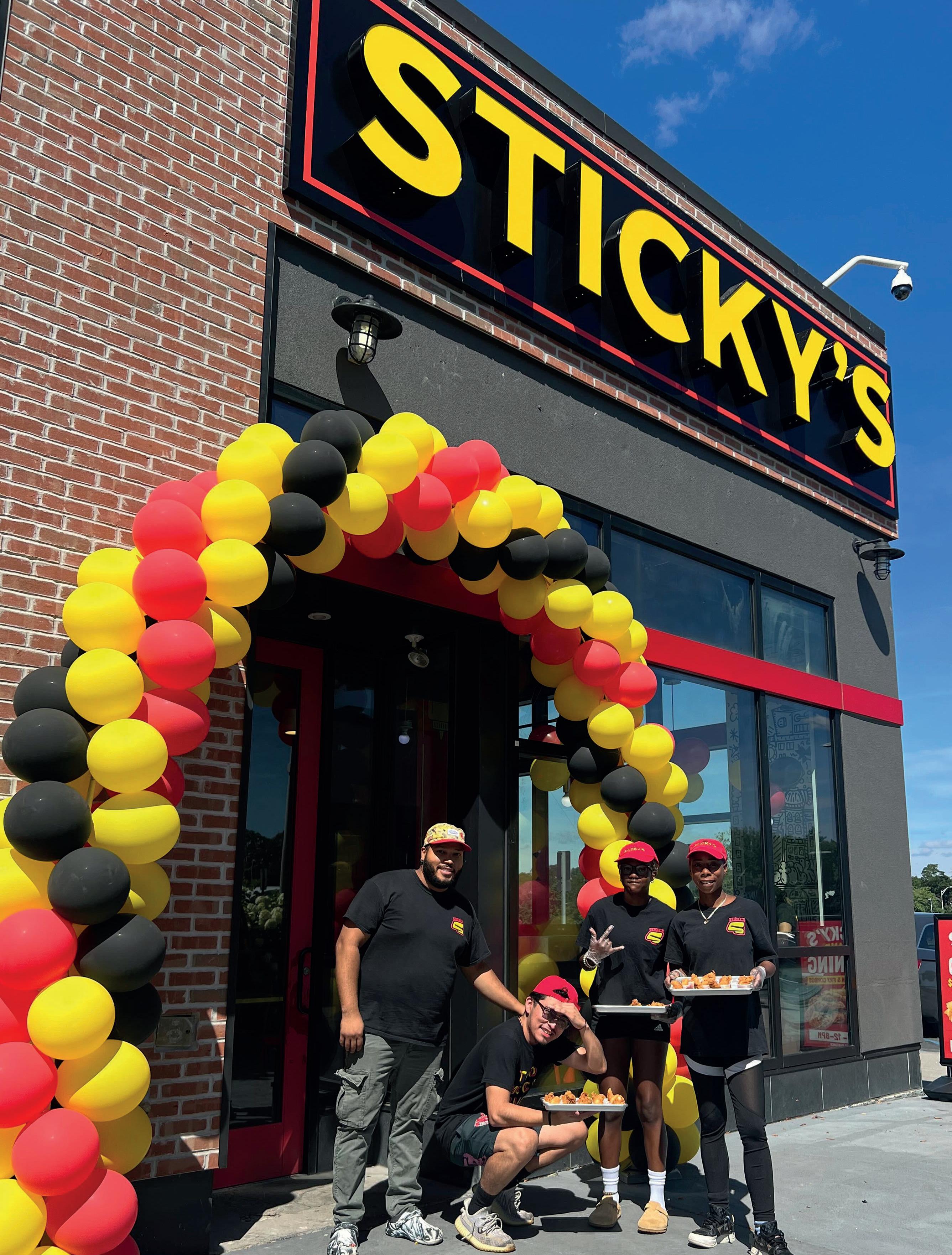




156
Location expansion
Whatever the palate desires, the palate may have. Sticky’s’ menu also includes sandwiches, specialty items, wraps, salads, and a range of French fries –some of which are more adventurous than others… We are looking at you, S’mores fries (a serving of straight cut fries dressed with marshmallow sauce, chocolate sauce, crushed graham crackers, mini marshmallows, and parsley). More pedestrian options like bacon mac and truffle parmesan fries are also available.
Though Sticky’s is proud to be a New Yorker business, it is now looking further afield. “We began our operations in New York City, and let me tell you, that city is a unique animal – particularly before the pandemic,” explains Jon. “It is the place where I have lived for a large portion of time, and I know it intimately well. So, when launching the business, we really relied on our knowledge of the market. It has certainly been a learning experience moving beyond the city, because nothing is like New York.
“In the city, there is always foot traffic and an immense density of people,” he continues. “There is really nothing quite like it. Therefore, once you leave New York, it is almost like you are starting from scratch, even just from a real estate and site selection standpoint. Nevertheless, we have recently ventured out, opening a restaurant in the Cross County Mall in Yonkers. It has been really exciting.
“We are testing out a lot of new things, including a slightly different menu and

service model,” Jon adds. “It is helping us think about what kind of thing we will be doing going forward. Early performance has been strong, and we are pleased to be in Westchester County, just outside of the city in New York State. Guests are really excited about the new venture, and it has been great to see some of the familiarity they are already showing with the brand, even though it is a new market for us. So, in all, it has been a really promising start and we intend to look at other markets outside of the city.”
Even though Jon admits that the market for gourmet chicken has grown tremendously over the last ten years or so, he firmly believes that the Sticky’s brand and product offering is highly differentiated within that space. Hence, wherever the company sets up shop, he insists that people will still flock to its stores thanks to the brand’s unique style, wide product range, sharp culinary focus, and keen emphasis on flavor.
foodchainmagazine.com 157 Sticky’s
Another facet of the business that sets Sticky’s apart is its focus on technology. “Since our inception, we have embraced technology to support the restaurants as they have continued to grow,” Jon details. “We rely on technology for our operations execution, restaurant management, and customer experience. In general, there are two types of technology that we employ: customer facing and internal. We have built an environment where a range of different programs talk to each other; data flows on a daily basis between technology systems, enabling us to see the business in real-time. To have that information is incredibly beneficial. It allows our store managers and operators to understand what is happening, and therefore manage their individual establishments accordingly.
“Separately, we are also utilizing an app, an online ordering platform, and a loyalty program for our customers to use,” he adds. “Put together, these technologies have been a key part of our strategy for future growth.
As we operate relatively small restaurants, a lot of our business comes from take-out and delivery. By having our own app and ordering platform, we are giving customers the chance to order directly from us. Not only will this offer them the best experience, but it will also offer the most competitive price since they will not have to pay thirdparty delivery fees.”
Return to growth
Data garnered from direct ordering also means that Sticky’s can amass a wealth of information regarding the ordering habits of its customers. Richer data that details customer behavior is incredibly valuable; it means the brand will now be able to communicate more effectively, zeroing in on what the people really want.
On top of that, a loyalty program model ensures customers keep coming back by incentivizing more frequent visits. “It is always going to be a process of evolution where technology and how it applies to a business are concerned,” explains Jon. “Therefore, as the landscape changes, we will continuously adapt as more robust platforms and digital offerings become available.”
Going forward, Sticky’s is hoping for a return to form and another strong period of growth. “We approached the beginning of the pandemic with exponential growth in 2019,” Jon reflects. “In fact, we doubled our store count and had a few more in the pipeline; however, it is no secret that it has been challenging to operate our business over the last couple of years, particularly with so many stores dotted across New York City.
“As we look beyond the height of the pandemic, we hope that things will normalize once more, especially across the supply chain where we are still seeing enormous price pressure on a lot of the ingredients we purchase, and we can resume our growth trajectory,”

158
he concludes. “Right now, our primary focus is on everything we can do at an execution level and on a supply chain level. Therefore, when things do pick up and we begin to upscale once more, we will have moving parts under control.” ■
Toast
Today’s restaurant brands face more challenges and opportunities than ever before. Whether you’re building next generation digital guest experiences or managing cost pressure, restaurant leaders can’t win tomorrow with yesterday’s tech.

Born in the cloud, Toast’s software platform connects employees, operations, and guests, no matter how many locations you have. Our intuitive Flex POS terminals and Toast Go 2 handhelds power seamless front-of-house guest experiences, while our restaurant-grade Kitchen Display System (KDS) streamlines kitchen ops. Toast’s flexible APIs and integrations with over 170 certified technology partners mean your team and your tech stack can adapt to whatever comes next.

Stickys, Silver Diner Development, The Melting Pot, Jamba, Papa Gino’s and hundreds of other leading enterprise brands trust Toast to power their businesses.
And with one billion dollars in pledged R&D investment, we’re just getting started. Learn more at pos.toasttab.com/enterprise www.stickys.com
foodchainmagazine.com 159 Sticky’s
Becoming a HOUSEHOLD NAME

160
How Cinnaholic’s 2014 Shark Tank pitch became a nationwide bakery business

When Shannon and Florian Radke appeared on ABC’s Shark Tank in 2014, people across the US were given the chance to see Cinnaholic’s signature plant-based cinnamon rolls, and the Sharks were able to get a taste. It was a resounding success: the couple accepted a deal from Robert Herjavec, which sought to focus on upscaling and shipping products nationwide. However, after much thought and discussion, Shannon and Florian decided to go in a different direction.
The focus going forward shifted towards storefronts and creating a concrete presence for the brand. So far, the move has worked wonders. In fact, just one year after Cinnaholic appeared on Shark Tank, the company opened its first franchise location.

Fast forward to 2022, Cinnaholic, which first began in 2010, now totals 75 units across the US and Canada. Food Chain recently caught up with LeAnne Cavallaro, VP of Operations, and Heather Stennis, VP of Marketing at Cinnaholic, to talk all things cinnamon and more!
“We are a plant-based gourmet cinnamon roll bakery serving handcrafted and decadent treats,” says LeAnne. “These include cinnamon rolls, brownies, cookies, and homemade cookie dough. The brand has been franchising since 2015; two of our myriad locations are corporately owned and the rest are owned and operated by our franchise partners.
▶
foodchainmagazine.com 161 Cinnaholic
Heather Stennis and LeAnne Cavallaro
“All our recipes are made from scratch, so it is a labor of love for sure!” she goes on. “We are known for our cinnamon rolls – and these are not your average rolls! They are freshly baked throughout the day and can be customized to your liking. The possibilities are endless. Each bakery offers a range of different cinnamon
“ “
“ “
rolls, and each of our franchise partners showcases local flavors plus exciting creations that resonate with their customer base.”
Speaking of local, each of Cinnaholic’s locations is also partnered with a local coffee roaster as hot coffee is a core menu offering. For many, you cannot have a cinnamon roll without it!
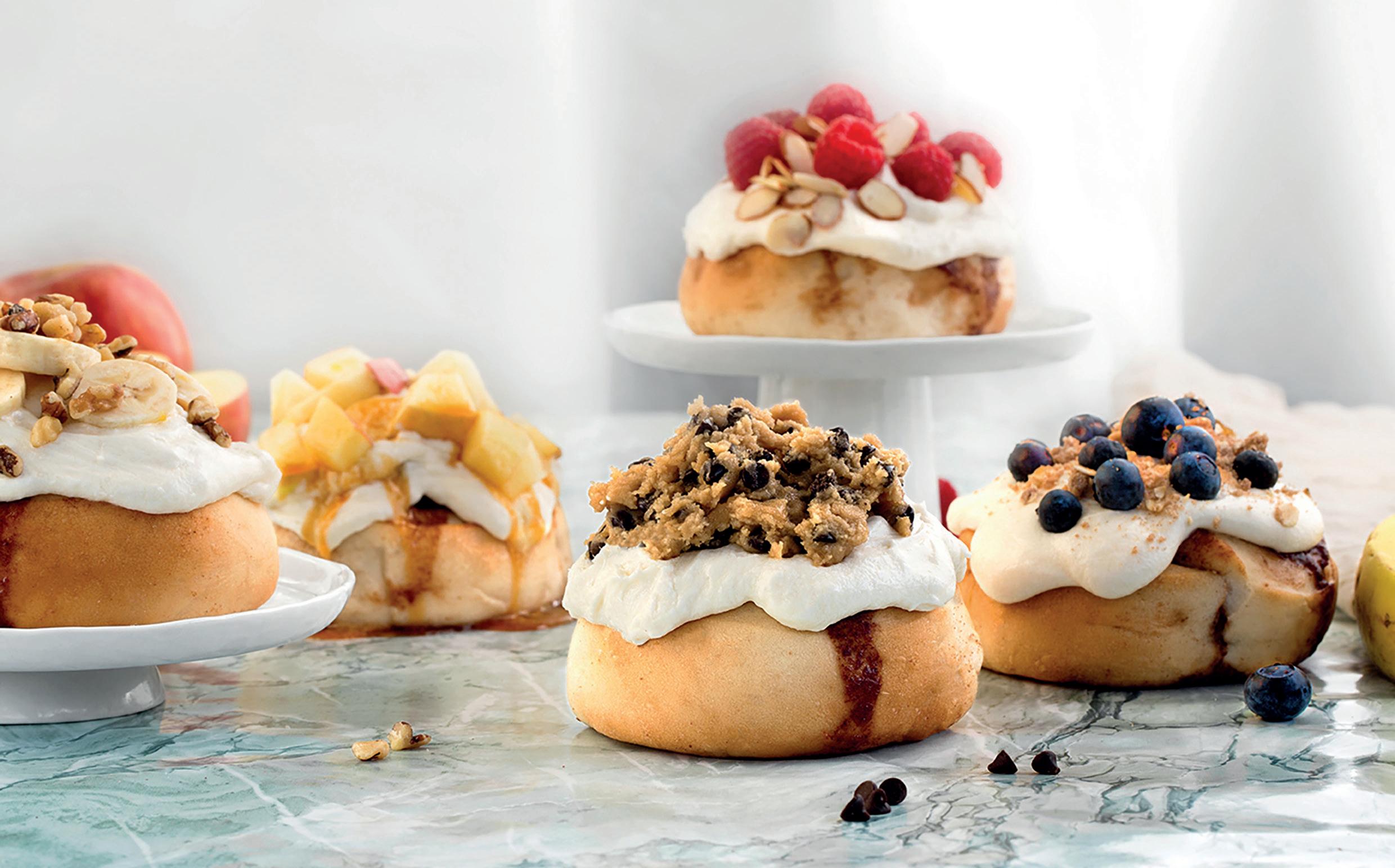
Cookie craving
Other location-specific items include blended drinks and vegan Dole Soft Serve; however, a range of core signature rolls can always be found. For example: the Old Skool, which is a classic cinnamon roll with vanilla frosting; the Campfire S’mores, an indulgent treat crafted with a marshmallow frosting, graham cookies,
We offer over 20 different frosting flavors and toppings, meaning our guests are able to build the perfect flavor profile that they are currently craving
162
marshmallows, and chocolate sauce; and Tropical bliss, which features a raspberry frosting, plus blueberries, bananas, and coconut.
“We offer over 20 different frosting flavors and toppings, meaning our guests are able to build the perfect flavor profile that they are currently craving,” explains Heather. “Our menu also offers core signature creations, including our most popular roll, the Cookie Monster, which starts with a cream cheese frosting and is then topped with homemade cookie dough, chocolate chips, and chocolate sauce.”
More recently, Cinnaholic launched its limited fall menu, featuring a new spin on their Pumpkin Spice Roll (pumpkin spice frosting topped with homemade pumpkin bread bites, ‘cinnadoodle’ cookie bites and cinnamon sugar), the Carnival Crunch Roll (caramel frosting topped with popcorn, marshmallows and sprinkles), and homemade Pumpkin Bread (freshly baked pumpkin bread with homemade brown sugar and cinnamon mix baked in). However, while cinnamon rolls undoubtedly make up the heart of Cinnaholic’s bakeries, the brand also offers many other made-from-scratch treats. These include baby buns, or a bite-size version of its signature cinnamon roll, plus brownies, chocolate chip banana bread, cookie dough, and two different kinds of cookies.
If that is not enough to make tastebuds begin to tingle, let LeAnne paint a picture of the Cinnaholic experience: “When you walk through the doors to any of our bakeries you will be greeted by the smell of warm cinnamon,” she details. “We will introduce you to the menu and help you make the perfect selection. Personally, I am a fan of our maple frosting and homemade pie crumble, but another popular selection is classic cream cheese frosting with fresh strawberries.
“You cannot go wrong when it starts with a warm cinnamon roll, so I always say: Just go crazy!” she adds. “But, if it is your first visit, then you have to try a taste of our homemade cookie dough – after a spoonful of that, you will want
to get yourself a tub to take home! Our mission is to solve everyone’s dessert cravings. We aim to create an experience that our guests crave to indulge in time and time again.”
Sustainably sweet

Though Cinnaholic is in the business of sweet treats and tempting people’s tastebuds, that does not mean it has to compromise in terms of its ethics. The brand is vegan – and proud of it. “Maintaining a plant-based menu is at our core, so every recipe is carefully curated,” says LeAnne. “We take pride in crafting madefrom-scratch recipes which we have mastered to taste just as good, but in our opinion, better than traditional versions!
“As mentioned before, our mission is to solve everyone’s dessert cravings while supporting animal welfare and sustainable food practices,” Heather asserts. “The demand for plant-based desserts is very much alive
foodchainmagazine.com 163 Cinnaholic

164
and well. Fortunately, we are able to fulfill that demand, both for people who eat a vegan diet but also for people who may have dietary restrictions due to allergies. Over the years, we have seen an increase in uptake of veganism and it is great to see new plant-based options from our suppliers.”
Talking of suppliers, Cinnaholic takes the personal side of the business just as seriously as baking. As Heather goes on to explain: “We’re very team-focused – while each member of the team has their respective deliverables and focuses within the business, we love harboring a collaborative environment. Our corporate team is small but mighty! We work together on everything, whether it be new technology systems or recipes; we value everyone’s opinion and work together as a team to grow the brand.”
Cinnamon crazy
When it comes to Cinnaholic’s franchise partners, moreover, the brand offers a few platforms which help to make them feel heard. For instance, it has an internal group on Facebook, where franchisees can network and bounce ideas off the corporate team and each other. It also has a Franchise Advisory Board, which ultimately acts as a sounding board for owners to express themselves directly to the executive team.
Alongside franchising, Cinnaholic has another string to its impressive commercial bow: catering. “We love to cater all types of events and we are grateful our customer base has found just about any reason to order treats from Cinnaholic,” notes Heather. “For our brand, holidays such as Valentine’s Day, Mother’s Day, Thanksgiving, and Christmas are key catering highlights of the year. Catering with Cinnaholic can be as simple as a Bakers Box purchased for a client or family gathering, which includes a half dozen or dozen rolls each adorned with one frosting and one topping selected by the baker!
“Then, of course, we have lots of options that are fully customizable,” she adds. “One of which
is the Cinnacake – a cake made from cinnamon rolls! It is available in three sizes and includes one frosting flavor and up to five toppings. Another is Cookie Cakes, which can be singleor double-stacked, and allow buyers to choose a frosting flavor and up to three toppings. Or planning a wedding? We would love to cater that, too! The most popular catering item for such an occasion is the Do-it-Yourself Toppings Bar: select three frosting flavors and three toppings and whatever sweet treat you want – from cookie dough to cinnamon rolls. Your guests will have fun with this one!”
As it looks towards the future, Cinnaholic can see the wheels firmly in motion. For instance, it has 15 locations actively in construction and over 40 more in various stages of their development process. It is safe to say the US is going mad for cinnamon.
“As we continue in this growth phase we will be focusing on people and processes that will help us support our franchise partners,” LeAnne concludes. “We have expanded our operations and marketing teams and have initiated new partnerships to roll out a POS conversion and loyalty program upgrade. All of this will work towards our greater goal of making Cinnaholic a household name.” ■
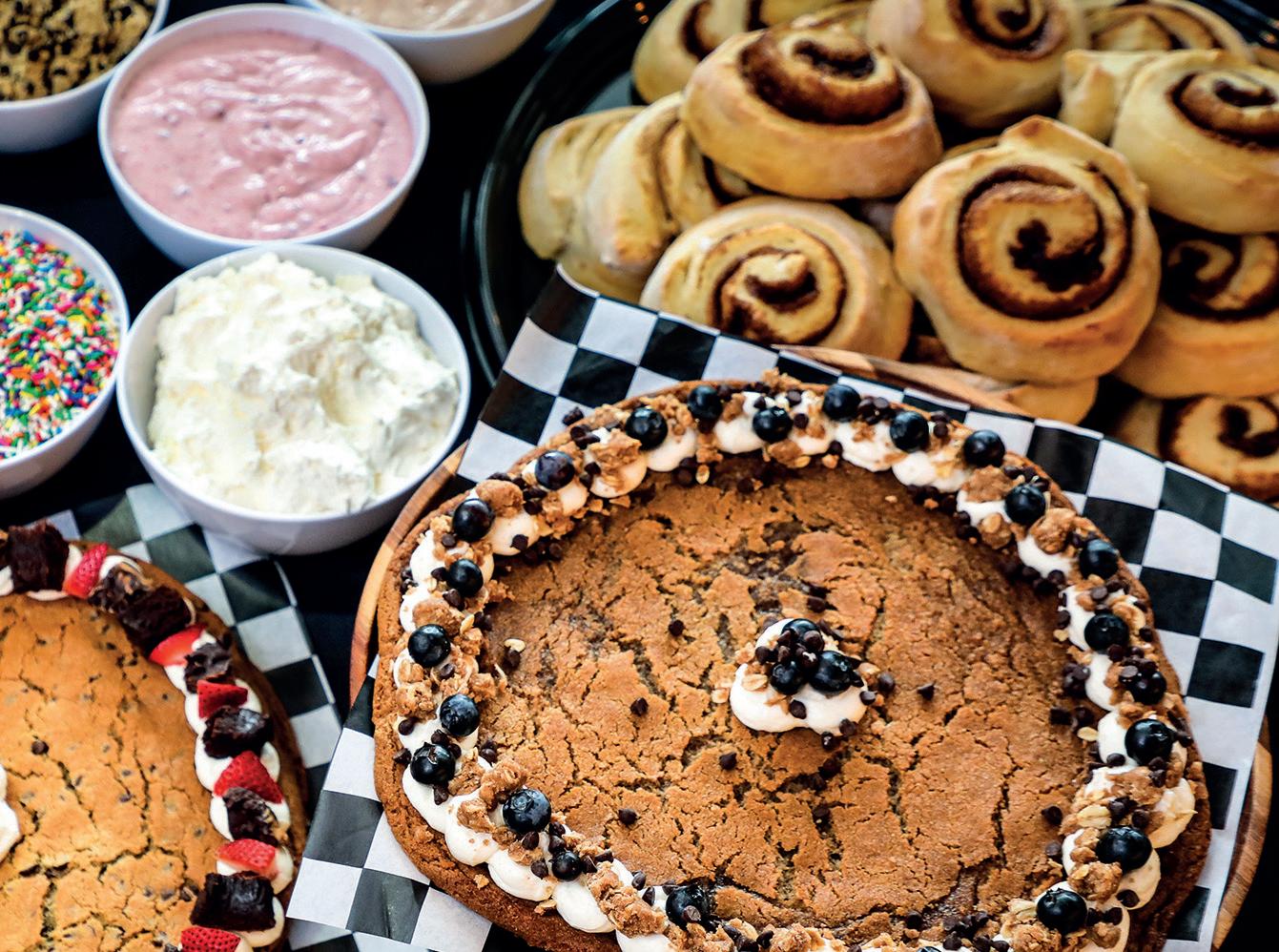
foodchainmagazine.com 165 Cinnaholic
www.cinnaholic.com
A true dill-light
How putting people first can lead to success - the story of Patriot Pickle
The journey of Patriot Pickle is a coincidental one. Bill McEntee, the company’s President, began his career in the restaurant industry, and saw an opportunity to expand into pickles. “I should note that we had never made pickles before,” he begins. “We saw a gap in the supply chain for restaurants needing the condiment, so we started to make our own.” This initiative received promising responses from customers and distributors, and continued to evolve with the help
of Bill’s industry intuition. “We then leased a small warehouse building to start making them. Our customer base grew rapidly. We did over a million dollars in sales the first year we were in business. We then bought a 28,000-square-foot building, and our customers have kept coming.”
Patriot Pickle then purchased an additional 54,000-square-foot building next door to keep up with the increase in demand. Today, he is proud to share that Patriot Pickle is the largest producer of refrigerated pickles

166
on the east coast. “Our customer base is a combination of food service distributors and retail. Through the food service channel, our products are then delivered to restaurants and diners. Then, Patriot Pickle provides private label retail products distributed throughout the country,” he explains.
Relishing relationships
Expanding on the topic of the company’s product range, Bill is happy to announce the launch of two new products, including a tasty and convenient grab-and-go pouch, known as Crisp. “It’s one of the latest that customers
can find at their closest convenience stores. There is no brine solution in it, and it is a healthy snack that you can eat at your leisure,” shares Bill. He goes on to explain that the product comes in four different flavors that range from the more savory, like sweet horse radish, the original dill, and a regular or spicy hot, to the bread and butter, which hosts a sweeter taste.
“The second item is called Pickleade, which is the brine solution that we use to cure pickles. We offer that anywhere from a three-ounce bottle to a 55-gallon-drum. It is a hydration drink for athletes, packed with electrolytes that restore salt balance. On the larger packs, it’s used in some distilleries as a flavoring component for different mixtures that are distilled and cured in alcohol. It can also be used as a marinade for chicken and meat proteins,” shares Bill.
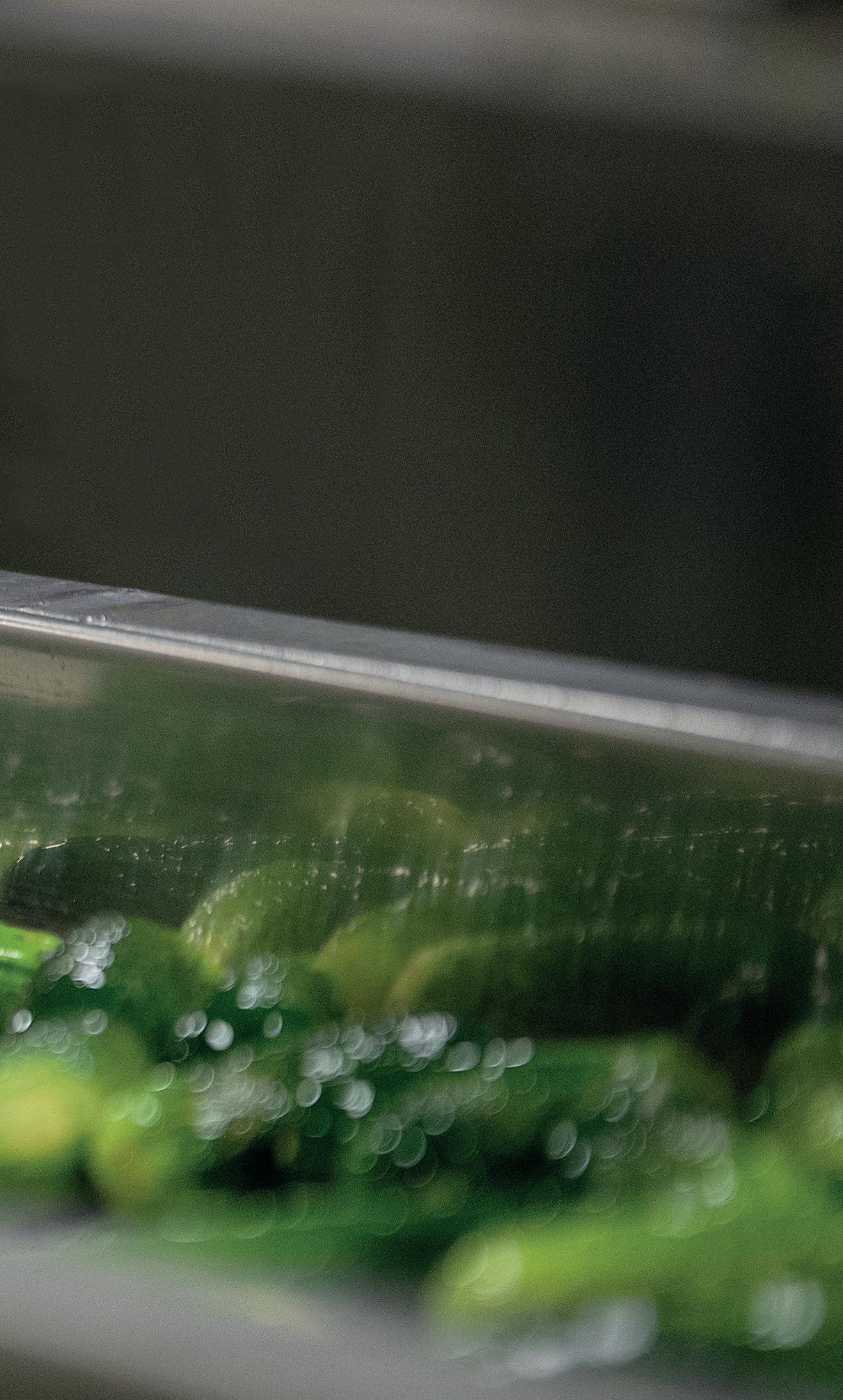
When asked about the company’s secrets to creating a fun and nutritious ingredient, Bill iterates that communication has been the top priority to ensure a smooth operation process. This, combined with his industry know-how, has powered the business forward. “From my experience working in the restaurant industry, we know what restaurant operators are looking for. We looked very closely at ways to solve on-time delivery issues, communication disruptions, and customer needs,” he says.
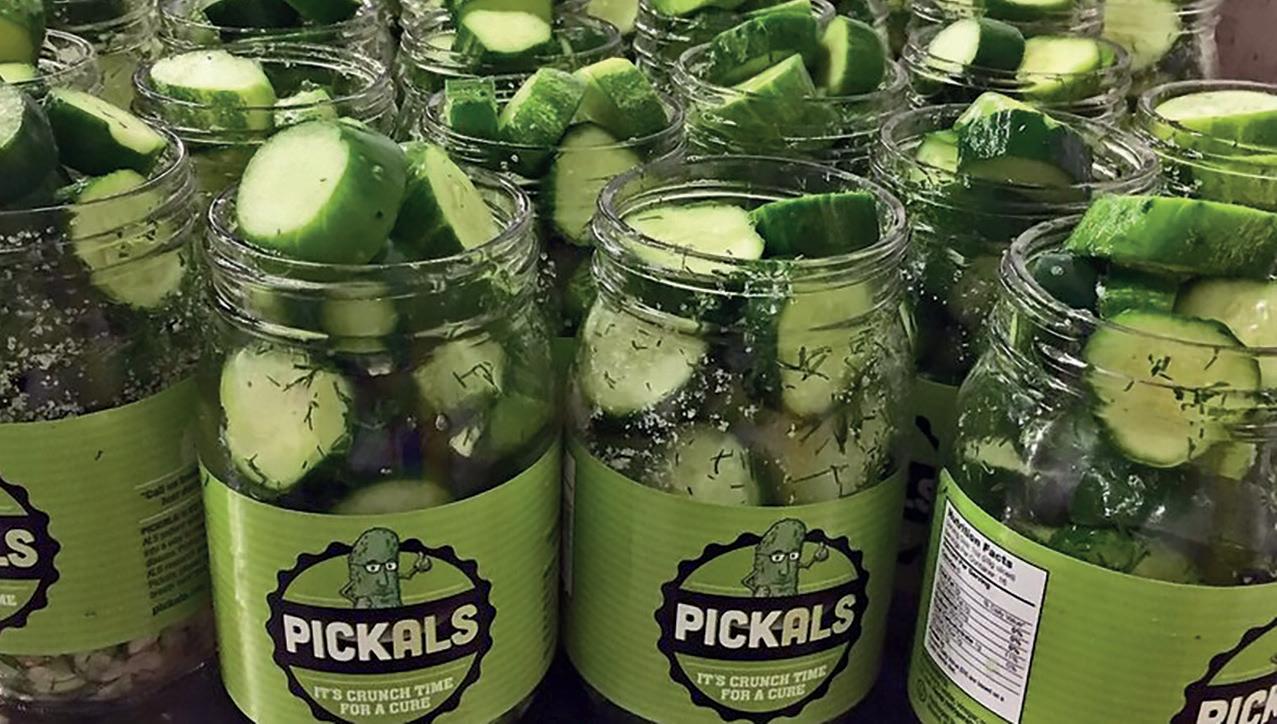
foodchainmagazine.com 167 Patriot Pickle
This approach of advocating for communication is then reflected across the company’s supply chain network. “We deal directly with cucumber growers, so we need to keep in touch with that process; that is critical. Then, whether its packaging, costs, vegetables, buckets or our salt and vinegar suppliers, each vendor serves a crucial role to our business, and we value that.”
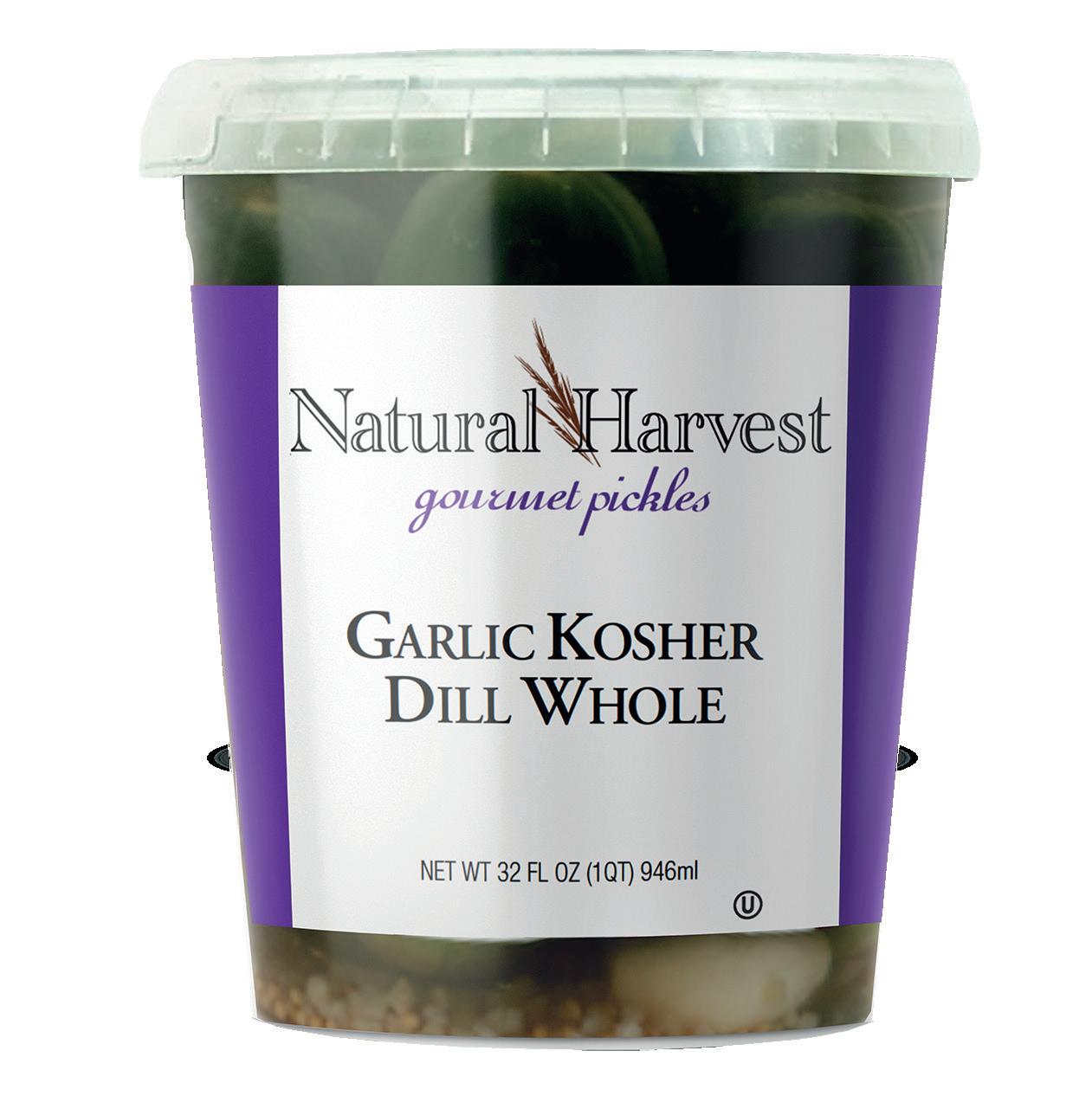

“ “ “ “
team spending time together. “We will pick an employee each week, and tell them to take their family out to dinner, send us the receipt, and we will gladly reimburse them. From my perspective, this job means that we take our people away from their families, so as a little reward back, we want to reinvest that time for them,” he expresses.
He then continues to discuss one additional contributor to the company’s success; one of which Bill is particularly proud. “My father used to remind us to treat people the way we want to be treated, and we carry that across our business. We actively value keeping everyone involved and motivated, and I believe that the best way to do that is by sharing the growth and celebrating every milestone.”
He shares that this ethos led Patriot Pickle to introduce a rewards scheme, which not only takes the form of monetary incentives, but prioritizes its
Crunch time
With these pillars in place to help keep the company robust against market volatility, we go on to discuss some of the challenges that Bill and his team face, following the impact of the pandemic. “None of us has been immune to the supply chain disruptions, and from my perspective, recruitment seems to be the biggest challenge at the moment. Both are affecting businesses in so many ways. To mitigate these obstacles, we are doing our best to ensure we are well-stocked. In terms of our supply chain issues, we don’t rely on one source of supply; in some instances, we triple source, which I think has worked well for our entire network.”
Tying in with the strategies in place to maintain the business’s success, Bill dives deeper into the ways Patriot Pickle is refining its company culture. He takes a moment to share that the business is also passionate about supporting work dedicated to helping those diagnosed with ALS, a progressive nervous system disease that affects nerve cells in the brain and spinal cord. “We promote and we give back to ALS annually. This company believes in contributing to something meaningful, and the fight against ALS is a cause we hold very dear.”
Now, Bill looks towards the remainder of 2022 with a clear plan that he believes will only push the company’s growth further.
.
. .new projects in development for the last quarter that will lead into 2023
168
“We are on a strong trajectory, and there are also some new projects in development for the last quarter that will lead into 2023. The plan is to maintain our growth, which has been very rapid over the last few years. We are also concentrating on customer support, employees and our vendor relationships, which will give us an even greater advantage.”
When Bill considers the future of the business five years from now, he envisions the company remaining true to its core values. This, he believes, will ensure it remains
Cosmo’s Food Products, Inc.
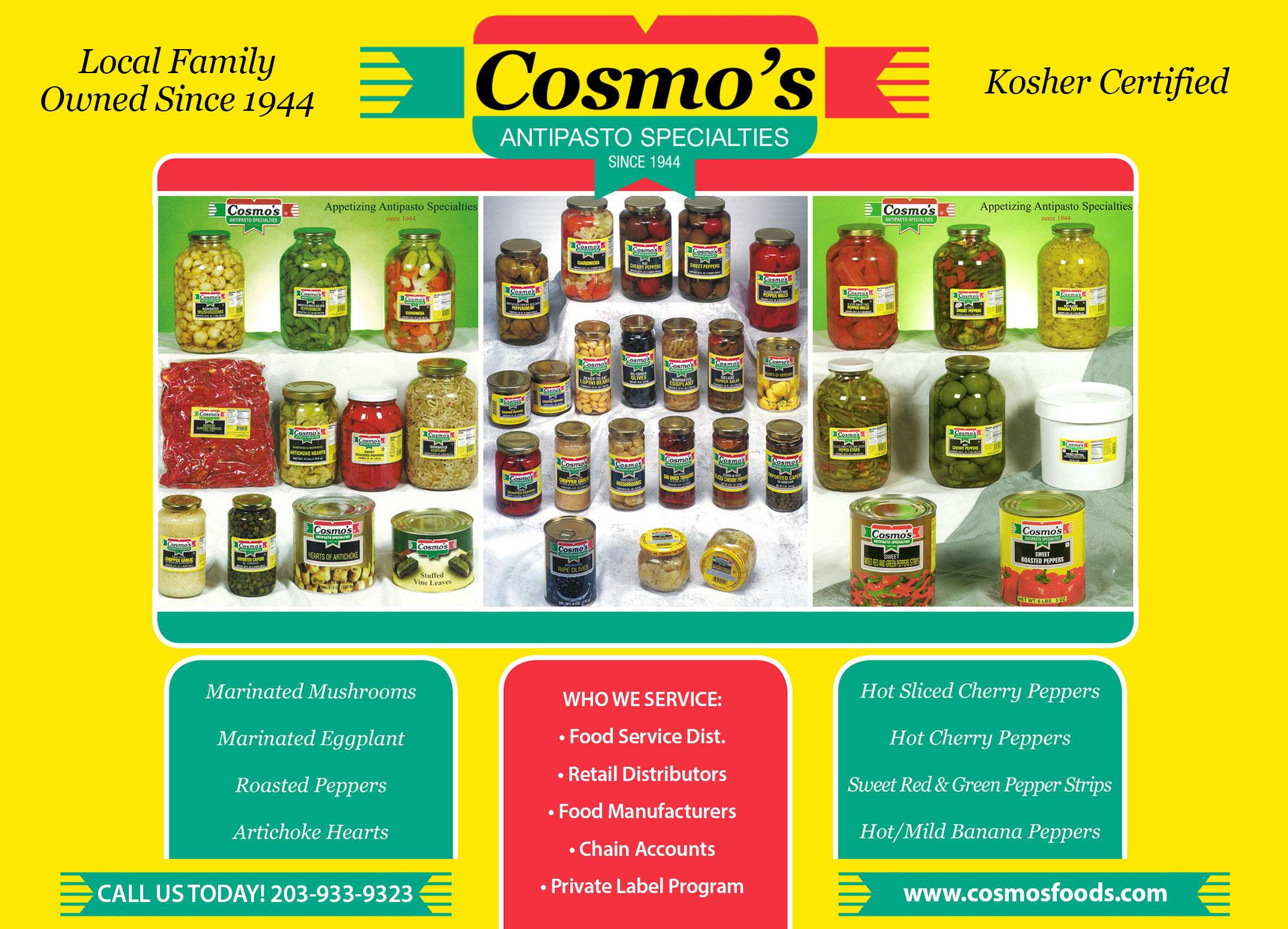
In 1944 Cosmo and Raffaela Laudano founded a small, wholesale grocery business in their home on Leete Street in West Haven, Connecticut. While Cosmo was out selling imported Italian food products, Raffaela answered the phone, kept the books and raised five children.
dedicated to the people and causes that lie at the heart of Patriot Pickle’s success. “We never want to lose sight of being the highest quality producer out there. However, the quality and culture of our business is really the most important aspect that we need to maintain. I know that growth will be a result of this, and that can only continue to strengthen as we progress.”
■
www.patriotpickle.com
From a small mom and pop operation, the business outgrew its original location four times before arriving at its present home on Callegari Drive. The legacy passed down to their family by this hardworking couple still lives in the mission of Cosmo’s Food Products, Inc. to deliver the highest quality products with the best service to their many customers.
foodchainmagazine.com 169 Patriot Pickle
Spudtaculargrowth
Internationally recognized as a leading potato grower, packer, and shipper, the name Allied Potato has become synonymous with superior quality and service. Exporting high quality chipstock, seed and table potatoes has become the company’s speciality, with thousands of tons exported every week to destinations in Canada, Mexico, Asia, Southeast Asia, Russia, the Caribbean, Brazil, Central and Northern Africa.
The seed for Allied Potato was planted in 2007 by Jason Davenport. His intention was to establish a successful company that specialized in the export of chipping potatoes from California and Washington. In 2009, the business expanded to include Brian Kirschenmann, a grower and packer from Bakersfield, California. With a similar vision for the future and a strong partnership built on respect and hard work, the

How Allied Potato is reaping the benefits of a global supply chain
170
business quickly expanded to become a recognized leader in the potato industry.
As operations grew, Derek Davenport then joined the team in 2010, and is now a valued partner heading up the farm and packing operation in the heart of Washington’s potato growing community.
Similar to the California operation, Allied Potato in the Northwest utilizes the latest technology and proprietary processes that ensure the quality, freshness and continuity of supply that customers have come to expect with each shipment. A few years later, in 2016, the company integrated a seed farm in Colorado.
Agile service
As Food Chain discovers, expanding operations to various parts of California, Oregon, Washington, and Colorado has been one of the core ambitions of Allied Potato for many years, and the business is continuing to refine its operations to ensure that quality potatoes are delivered to customers across the globe.
From every owner boasting a family history of five generations of potato growers, to crossing into the millennium with fresh ideas and innovations, Allied Potato has remained true to its commitment to investing in the technology

foodchainmagazine.com 171 Allied Potato
that helps customers achieve longterm stability and growth.
With strategic locations along the west of the US, Allied Potato has developed an innovative system for delivering large volumes of highquality potatoes in the shortest amount of time. As the only grower of large volume chipping potatoes to offer consistent, reliable year-round supply chain solutions, its customers enjoy greater stability and flexibility for their own projections. Its diligent efforts in establishing warehousing close enough to the ports of Long Beach, California, and Seattle,

Washington has enabled it to export Allied potatoes to just about anywhere in the world.
In addition, the company handles its own international logistics to achieve a streamlined service that expedites the process. The modern business environment demands flexibility and the best logistics network available for rapidly evolving and growing markets. Allied Potato takes pride in supplying high quality potatoes, in large volumes, while still maintaining the agility that customers require to meet the changing needs of their businesses.
There are two ways in which the company is guaranteeing the integrity of its supply chain. Firstly, through scheduled coordination. The company has a hand in the quality of every potato, working meticulously to ensure optimal planting conditions, fertility, and disease management, as well as monitoring crop maturity. It implements timely vine kill, and weed out varieties unsuitable for export, targeting accurate soil moisture levels for vine kill and harvest.
Secondly, every country requires different documentation to receive international shipments. Allied Potato ensures that all shipping documents are processed correctly for the timely and efficient release of cargo in the receiving country. Through strategic coordination with USDA inspectors, port authorities, growers and packers, truckers, shipping lines, forwarding agents, customs agents, and customers, the company ensures the proper flow and tracking
172
of all documents to meet the timely delivery and clearance of goods ordered.

Community contribution

Although growing its international network is a key part of the company’s operation, Allied Potato is also passionate about strengthening relations with its people and its community. This is why it devotes time, money, and resources to giving back to its community. The company lends its support to many worthy causes that enrich the lives of children, and help them to thrive.

One such way in which it supports its local communities is through planting gardens. In 2017, Allied Potato Colorado planted
Gosselin G2
Our partnership with Allied Potato has been both an exciting and rewarding journey. Their passion and generosity in sharing their extensive knowledge of potato production and industry allowed us to contribute to their growth as a valued supplier of their Chipperbec.

Gosselin G2 is a family-owned company that has been growing potatoes since 1960. Alongside providing potato chip manufacturers with the best possible product all year-round, we also offer a range of services that ensure the supply chain is trouble-free, and guarantee unmatched peace of mind.


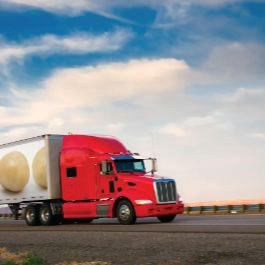
















Our quality guarantee is made possible by our integrated business model. Gosselin G2 sustainable approach is built on sound soil ecosystems and respect for the environment and aims to take advantage of the health of our soils, which all our actions are designed to improve.


To Allied Potato, congratulations on all your achievements. You are an exceptional partner, and truly live by your name as an outstanding business with which to work.
Thank you for your trust and constant support.
foodchainmagazine.com 173 Allied Potato
its third annual pumpkin patch. It was designed to give children and their families a fun activity, sense of support, and a small appreciation for agriculture. Crops are typically ready in late September, providing the business with an opportunity to give school groups and other organizations a chance to enjoy the patch. After schools and community organizations have picked their free pumpkins, Allied Potato then opens the patch up to the public and invites them to pick a pumpkin, and enjoy some time in the patch with their family and friends.
The reception for this initiative has been encouraging. The company is excited to report that the patch has had visitors from as far away as 100 miles, and, in a single year, it gave away more than 10,000 pumpkins and welcomed approximately 3000 people.
In addition to the pumpkin patch, the company has taken on several other initiatives. For Allied Potato, hard work, and reaping the rewards of a job well done is a core motivation for the business, which is why it also supports an organization that


upholds similar values, promotes volunteerism, and is instrumental in molding young men into proud members of its community. As well as helping sponsor Eagle Scout Projects with donations of time, labor, money and other necessary resources, the company enjoys teaching the local boy scouts new skills, such as how to safely use farm equipment like saws, welding equipment and drills, or how to properly tie down equipment for transport. One Eagle project involved planting a garden in an elementary school so students could learn how to successfully grow and cultivate herbs and vegetables, develop an appreciation for plant life, and learn about sustainable gardening. With a passion for community and a determination to bring its produce to the world, Allied Potato is a name to be trusted. We will be keeping a close eye on the company’s developments as it continues to advocate for growth both within the business, and across international borders. ■
www.alliedpotato.com
174 Allied Potato
Run your chain your way
HungerRush 360 is the cloud-based POS system that helps you manage every aspect of your chain in one platform to accelerate growth and enable new levels of efficiency.

Get even smarter about digital ordering.

Harness the predictive power of AI to drive more orders and reach people the way they’re already communicating: by text or voice. Built-in AI means it practically runs itself.
Learn more at hungerrush.com












































 By Marcel Koks
By Marcel Koks



 Ron Baruchi www.agmatix.com
Ron Baruchi www.agmatix.com








































































































































 ◀ Jason Crain President at Slutty Vegan
◀ Jason Crain President at Slutty Vegan















































































 Have a taste of Paladar Restaurant Group’s delectable international tour de force of South American and Caribbean cuisine
Have a taste of Paladar Restaurant Group’s delectable international tour de force of South American and Caribbean cuisine






























































